

Beginner’s guide: Tips for First-Time Travel Trailer Adventurers
Heading out camping for your first time can be both a scary and exciting experience. If you’re new to travel trailer camping you’ve probably spend a lot of time reading and asking and learning how best camping should be done. But, there’s no better way to learn than by doing.
Here you’ll find one mom’s story of what they learned and why you should take note of these first time travel trailer tips!

(This post contains affiliate links for your convenience. As an Amazon Associate I earn from qualifying purchases . If you make a purchase through my link I receive a small commission at no added cost to you. See my policy page for more information)

A first time travel trailer camping story by Heather of Nesting Intentionally
As first time travel trailer campers, we have learned a lot! …mainly what NOT to do!
Even though we had expert campers to help guide us, we still managed to learn a ton of lessons, the hard way. We have many, many tips to share. There are a few camping tips that you may have heard before that you should not ignore. Then we have a couple lessons we learned that we hope will help you in your camping adventures too.
When I was a kid we didn’t camp much. When we did camp it was in a tent with 3 kids and my mom for the weekend. I grew up in Florida. It’s hot there. Especially in a tent, in the summer, with 4 people. My memories of camping are okay. We had fun playing in the dirt and going on scavenger hunts , but it was so hot!
My husband went camping all the time as a kid. His family had a camper. They had a pop up first, then a trailer, then a 5th wheel, and now his parents have an RV. But if you were to ask him if he liked camping as a kid…. he’d tell you no. It was hot and there were too many bugs. Oh and he doesn’t like to eat outside… strange, I know.
So naturally, two people who didn’t like camping as kids, what do they do?
They go out and buy a camper!

We talked about it for YEARS before we bought one. The memories that we made as kids surpass all the negative feelings we had toward camping.
As a kid you love getting outside, playing with dirt, experiencing the outdoors. Whether you live in bug infested Florida or the snowy mountains, there is always fun to be had outside. That is what we want for our kids. We want them to have the experiences that we had and then more.
The camper we bought is a 2005 KZ Coyote Hybrid. It’s a cross between a pop up and a travel trailer. The beds pop out like a pop up trailer does. But the whole trailer is hard sided like a regular travel trailer. It’s very spacious inside, compared to most travel trailers.
First, passing along some travel trailer camper trailer advice:
Some camper tips that we did because we were told to by expert campers…..
- Park the camper at the house at least 2 days before you leave so you can pack the camper and turn the fridge on .
- Do a running check of everything before you leave to make sure that all brake lights, appliances and camper is all in working order. ( Here’s an RV checklist to help you make sure you’ve done and checked everything before you head out)
- Pack a level…. Yes, the level tool you use to hang pictures on the wall . When you put the stabilizers down you have to make sure the trailer is level and not too high or low on a side.
- Practice towing and backing up the camper…every camper has a story or two. You’ll thank yourself later for doing a couple (or a couple dozen) practice runs.
Now, for the first time travel trailer tips and tricks:
1. pack everything in totes .
Put food, bedding, and camper parts in separate totes.
Once you get to camp you can unpack all that needs to get put away. Then all the totes can go outside and be stored under the travel trailer. You’ll want to pack the camper well and totes are the answer.

2. Once you get to camp, put everything away
Make all the beds, put all the food away, put all the clothes and towels in a place, make the beds, make sure everything has a place where everyone can get to them as needed.
Get everything nice, neat and organized. Everything needs a place or you’ll feel like the walls are caving in with all the stuff everywhere.
3. Get some command hooks
We have command hooks for our keys by the door. There are 5 in the itty bitty bathroom for our towels. There is one near the door for the fly swatter. And a couple others spread throughout the camper.
Yes, command hooks are super handy!

- INCLUDES - 2 hooks and 4 medium indoor strips; 1 hook holds 3 lbs
- ORGANIZE DAMAGE-FREE - Say goodbye to holes, marks, or sticky residue on your walls, doors, cabinets, or closets; Command Hooks by 3M are easy to use and help keep your walls looking beautiful
- NO TOOLS REQUIRED- Hang hats, bags, dog leashes, scarves, and accessories where you want without nails or a hammer
- STRONG AND VERSATILE- Command Designer Hooks hold strongly on a variety of indoor surfaces including painted walls, finished wood, glass, tile, metal, and other smooth surfaces
- REMOVES CLEANLY- Reorganize when inspiration strikes; These wall hooks leave no sticky adhesive behind; Perfect to use inside cabinets and closets, in your college dorm, apartment, home, and office
4. Bring extra shoes for the kids
My kids get so muddy…. They must gravitate to the mud. They literally had to wear wet, muddy shoes for about a day until the sun came out for a couple hours to dry them up.
5. Bring cash for laundry
There is usually a change machine in the laundry room to exchange your dollar bills for coins. But if you don’t have cash…. you’ll need to find some. If you’re camping at an older facility, the laundry machines vending machines might also only take coins…not cards.
6. Do research on your campsite
Do you want to be near the bathrooms? Does it have a general store in case you forgot salt & pepper? Are there trees for shade? Does it have a laundry room? Does the campsite have full hook up (cable, sewer, electric, water)? Does it have a picnic table or fire pit? Does it have cell service or Wifi?
These may not be things you need/want but if you are looking for something specific, I’d check, because not all campgrounds are the same… (don’t ignore this one)!
READ MORE: This article will give you some tips and suggestions for choosing the best campsite for your family’s needs.
7. Don’t remove the yellow blocks too early
…not until everything is hooked up and you are about to pull the trailer out of the driveway. I took those little yellow triangles out too early. The trailer was on the ball. It managed to get pushed off the ball and roll almost into the back of the truck. (don’t ignore this one either)!
8. Get a big outdoor rug
You’ll want a rug for the outside of the camper . Trust me: the bigger the better. You’ll need it for everyone’s muddy, dirty shoes/feet.

9. Make a list for everything
You need a checklist to make sure that your camper is ready to leave your driveway. You need a list of kitchen stuff and food. You need a list of clothes and accessories to bring. It’s overwhelming if you don’t have a list for it all. You will forget something!
My in-laws… who have been camping like 40 years, still have a list. It’s a lot smaller than mine, but you get the point. (don’t ignore this one)
Here’s a free printable camping packing checklist you might want to check out if you’re looking for a starting place.

10. Don’t pack too many rainy day games
Don’t pack 3 board games, 2 movies, and a deck of cards for the kids, in case it rains or they get bored.
If it rains, go play in it. If they get bored, go outside and explore. All that extra stuff only takes up space.
Travel trailers don’t have a ton of space to begin with, so use it wisely and leave that extra stuff at home.
But, here’s a post full of camping games and camping toy ideas in case you do want a few suggestions.
I hope our mistakes and lessons learned help you on your first travel trailer camping trip or your next one!

Written by Heather
Also written by Heather is this article, Surviving Quarantine with kids

For more camping reading, check these out next:
- No more bored kids! – how to keep them busy and having fun at the campground
- Camping in bear country – how to teach kids bear safety
- Super important and often over-looked RV camper trailer tips

5 thoughts on “Beginner’s guide: Tips for First-Time Travel Trailer Adventurers”
I agree with your point about making a list of everything because it is very important to make sure that we don’t forget any essentials during our trip. So thank you for sharing this checklist, I like the way you make a separate section for everything.
Great article! Your Tip 9 (Make a list for everything ) is great because when we make a list we take everything we need to camp with us. I agree with you all. Thanks for providing such information
Thanks for the tips! But I disagree on leaving the games and movies at home. On a stormy night, those were some of our best memories! I’d rather have them and not need them (keep ‘em in a bag in the car) then have restless kids and grumpy parents in a small space.
Yeah, that’s a tricky one! I agree that I don’t want my kids to just hang out inside an watch movies. If this were me (and I actually had something to watch videos on in a camper) I’d probably just tuck them away as a last resort option instead of the first choice… but, you’re right, cuddling and movies can be great family time together!
I can’t wait for the next articles
Leave a Comment Cancel Reply
Your email address will not be published. Required fields are marked *

25 Beginner Supplies and Accessories for Travel Trailer Camping
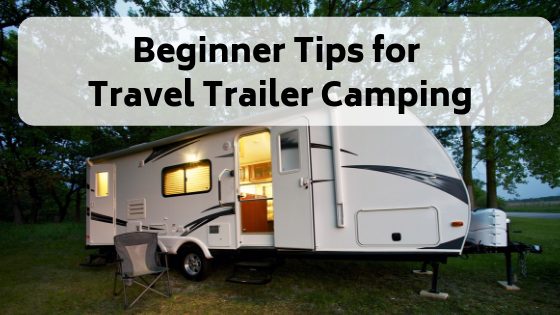
Sharing is caring!
Thanks for your support! If you make a purchase using our links in this article, we may make a commission. And, as an Amazon Associate, I earn from qualifying purchases. See the full disclosure here .
Hubby and I got our first travel trailer last September and were only able to take it out once before we put it into storage for the winter, but I’ll tell you what, I wish I would we would have had the list of 25 Beginner Tips and Accessories for Travel Trailer Camping before we went out for our first venture! LOL!
We have rented pop-ups in the past when we would go to our annual family reunion in Michigan, and they usually came with everything that we needed. If they didn’t, there was always someone at camp that had what we needed since we travel over 1400 miles one way to spend the week with all of our extended family.
I want to share with you a very short, but important list of items that you will want to make sure you have before you take your travel trailer out for the first time. I would suggest writing everything down. I know we all like to think, “oh, I’ll remember that!” On our first trip, we had 1 full sheet of things we wanted to make sure we put in the trailer, but thank goodness we had that same pad of paper with us in the camper! We ended up writing down another half page of items we want to make sure we bring on the next trip.
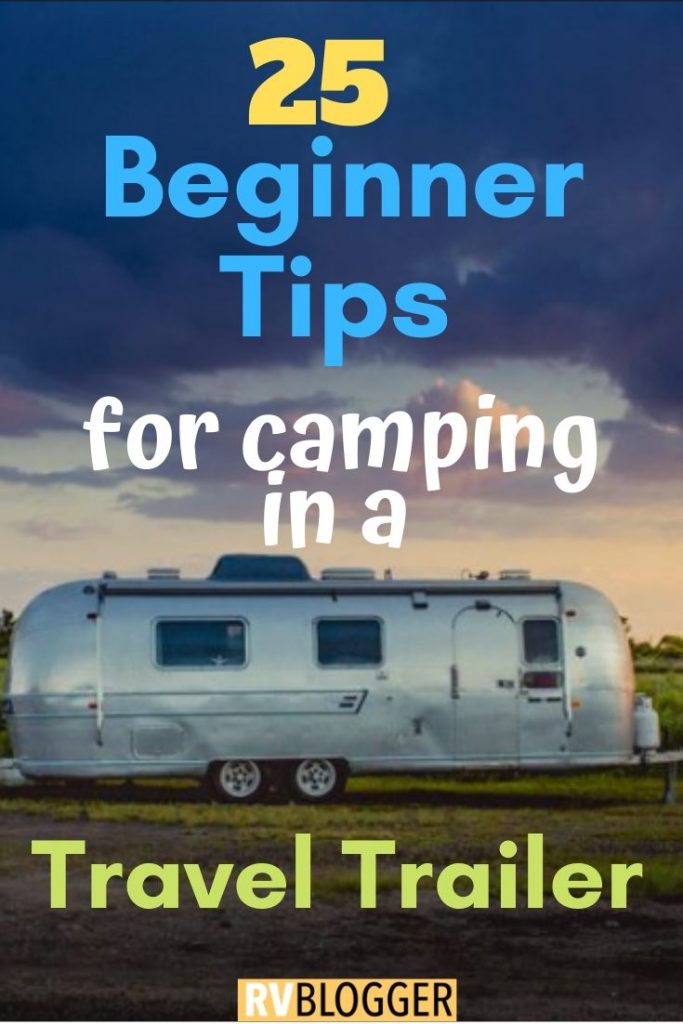
1. RhinoFlex Rhino Blaster Sewer Tank Rinser
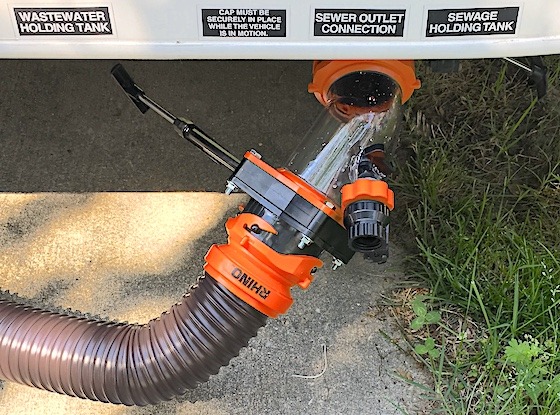
Rinsing our black water tank after dumping has always been a hassle. It took forever to fill the black tank with water to flush it out. We would have to hold the toilet valve open or drag a hose through the RV window to fill the black tank through the toilet.
But now flushing the black (and gray) water tank is super easy. We just use the Rhino Blaster and connect a hose to it to quickly and easily fill and flush the black water tank.
The key is to buy the Rhino Blaster with the Gate Valve . RhinoFlex sells the Blaster without the gate valve for less money, but without it, you can’t fill your black tank because the water is pouring down the sewer hose at the same time you are shooting water into the black tank. Anyway, this is a great item that has made maintaining our black tank way easier. We absolutely recommend this product!
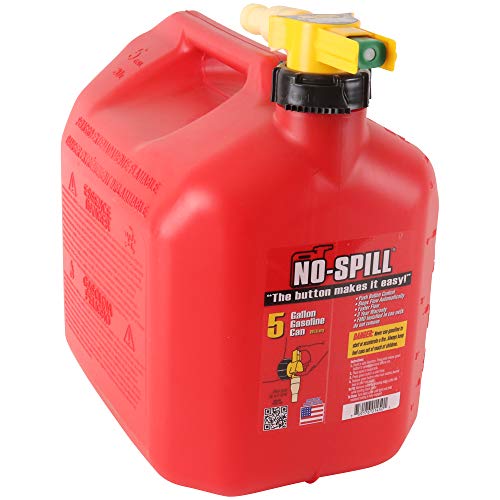
If you are going to be dry camping and not “glamping” you want to make sure that you have enough gas to keep your generator running when it needs to be running. We like this gas can because of its no-spill spout. It may cost a little bit more, but it’s worth it. You can tip the can vertical, insert the spout into the generator opening, then press the button to begin and control pouring. To stop pouring simply release the button. Practically eliminates spills and overflows.
3. Cordless Drill and ¾ Inch Socket
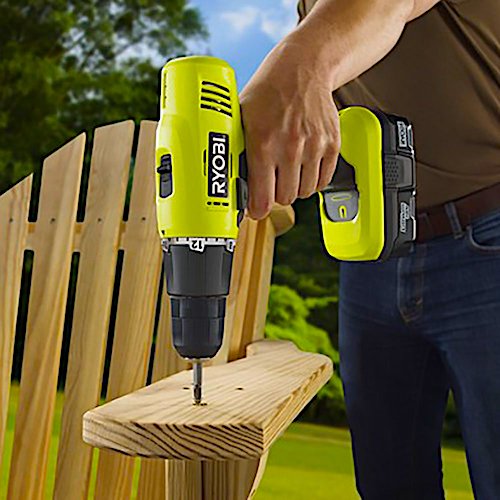
We suggest having a separate ¾ inch drill socket and cordless drill specifically for the travel trailer. It is essential that you keep the battery charged all the time and have it located in a place where it can be easily accessed when you pull up to your campsite. We have our cordless drill placed in the under-belly storage so that when we park we can hop out of the truck and know exactly where the drill is so that we can lower the leveling jacks. Bring your cordless drill with this bit attached to it and you can zip your jack stands up and down effortlessly.
4. Leveling Blocks
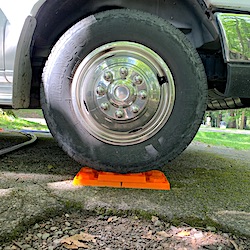
We found these excellent leveling blocks that my husband really likes. They are more convenient than wood blocks because they interlock with each other and are easy to store. These leveling blocks allow you to stack the interlocking blocks to the desired height for easy leveling.
5. Wheel Chocks
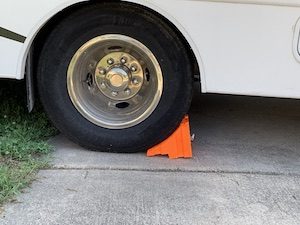
Wheel chocks are very important! Once you have your travel trailer parked, you want to make sure that you have your wheels chocked, so the trailer doesn’t roll on you once you disconnect it from your vehicle. You definitely need to chock your trailer wheels. We found these wheel chocks , they are heavy-duty, solid rubber.
6. 3 Foot Level
Once you have your travel trailer parked, you want to make sure that it is level, so you are not rolling off the bed while trying to go to sleep. We suggest getting a 3-foot level to make sure you are level front to back, and side to side. A 2-foot level is too short to measure accurately and a 4-foot level is too long to store easily. We find that a 3-foot level is perfect. Also, check out our articles called How To Level a Travel Trailer on a Slope for some great tips on how to quickly and easily level up your travel trailer.
7. Outdoor RV or Travel Trailer Patio Mat
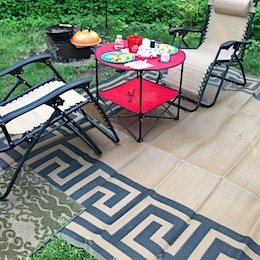
Unless you want to follow everyone in and out of your travel trailer around with a broom, you should invest in an outdoor RV or travel trailer outdoor patio rug. We chose this one because it is large enough to cover most of the side of our trailer. We take our Skye Bird with us and as I’m sure you know, dogs can and will drag in lots of dirt and grass on their paws. By putting this large outdoor patio area rug out in front of our stairs and under the awning, she will lay here instead of on the dirt, weeds, or grass helping to keep that stuff from traveling into the trailer with her.
Same goes for our shoes, right? When we go camping, we are walking around on dirt and gravel for the most part, and having the outdoor RV rug to wipe our feet on before entering the trailer helps keep most of the dirt out. Another great thing about this particular rug is the carrying bag! This allows for easy cleanup and storage.
8. Heavy-Duty Nitrile Gloves
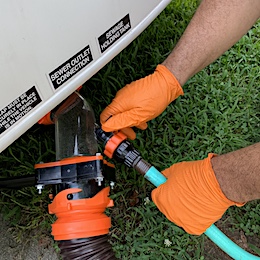
Whenever you are dumping your holding tanks you want to be sure to wear gloves to avoid contact and keep clean. The cheap latex gloves you can buy at the pharmacy or your grocery store just won’t cut it.
There are a few things to consider before buying gloves. First of all, they should be nitrile and not latex. Nitrile is more puncture resistant than latex and there are no latex allergy concerns with nitrile, which is a synthetic rubber product.
Second, your gloves should be heavy-duty and long enough to cover your wrists . I suggest at least 6 mils in thickness but 8 mil is better. The last thing you want is for your glove to rip while working with your sewer hose. And I also recommend the 9 1/2″ length of the glove so it covers your wrist, as well as, your hand.
Third of all I recommend disposable gloves. They are very inexpensive and you won’t have to clean them after every use. Just use them and lose them.
I like the neon orange 8 mil nitrile gloves by Gloveworks. They have great reviews and they have a diamond grip pattern in the glove too. They work great.
9. Rechargeable LED Headlamp
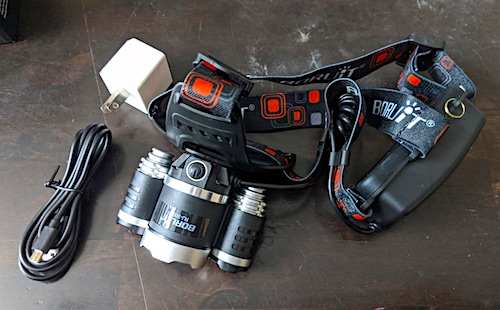
You can’t always pull into your campsite during the daylight hours, so it is good to have a rechargeable LED headlamp . The key is to make sure your headlamp meets these four criteria.
- It’s Rechargeable
- It’s Waterproof
- It has a strap that goes over the top of your head so it doesn’t constantly slide down your forehead.
- It has a red light so you can use it when star gazing or fishing at night.
Trust me I know! I’ve owned about 5 different headlamps over the years.
10. Folding Camp Table
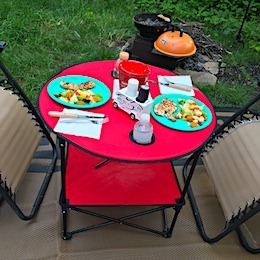
We suggest getting an outdoor table for the convenience factor. For instance, if you have stuff that doesn’t need to be brought in every night, i.e., coffee maker, stainless steel coffee cups, paper plate holders, flashlights, etc. you can leave them on the outdoor table , and they can be easily found the next time you’re ready to use them.
And you can put your cooler full of cold beverages underneath it. The outdoor table is also convenient for prepping your meals. We chose this outdoor table because it is lightweight, durable, and collapses small enough to go into a carrying bag.
11. Universal Stove Top Cover
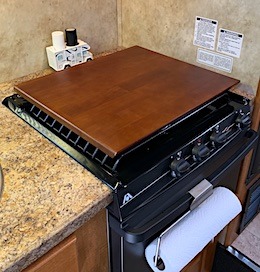
I don’t know about you but we definitely do not have enough countertop space in our RV. The sink is right next to the stove which leaves about 4″ of countertop space. Yikes! So, luckily we found this stovetop cover and now we have a place to set up the coffee maker and toaster in the morning or a place to put our cups if we want to pour a soda.
The great thing about this stovetop cover is that it is universal so you don’t have to guess if the stovetop cover will actually fit on your stove. We bought ours and used the template on the back to measure where to install the rubber cups that stick to the burner grates. It was very easy to install and now we have extra countertop space. And the rubber cups that hold it in place prevent it from squeaking too!
12. Paper Plate Holder
We all love the convenience of paper plates, right? Especially if we are just doing burgers and hot dogs on the grill. It is easy and convenient to grab paper plates for these quick and easy meals. As we all know, some paper plates are not of very good quality, so we got some of these plastic paper plate holders . Please keep in mind, paper plates are better than styrofoam plates. Yes, styrofoam plates are a little sturdier than paper plates, but they are not good for the environment. Plus with paper plates, when you are done eating you can just throw them into the fire pit, put your plastic holders on your outside table, and move on with your day!
13. Break-Resistant Plate and Bowl Set
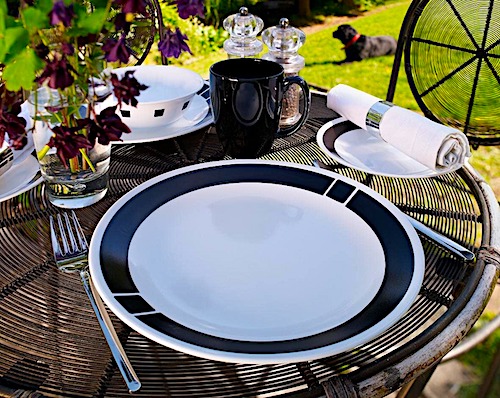
We know how convenient the paper plates are while camping, but if you decide that you want to grill up some steak or boneless chicken, you should have a set of plates and bowls so that you can cut your meat without cutting the paper plate along with it. My grandparents were avid RVers years ago and when we got our travel trailer my grandma highly suggested getting a Corelle Dish set . This is the set she gifted us with for our “house warming gift” for the travel trailer. The Cornelle dish set is made with a break, and scratch resistant patented Vitrelle glass technology. They are lightweight and very durable. My grandparents had their set for over 30 years before they stopped traveling.
14. Propane Coffee Maker
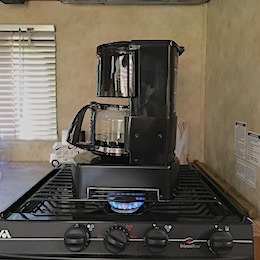
No campsite is complete without a coffee maker! We are passionate coffee drinkers, so we had to make sure that this was one of the first things we bought for the travel trailer. Many coffee makers are electric but this Coleman propane coffee maker runs on the stovetop so you don’t have to power up the generator to make your coffee. Just light the stove burner and you are good to go. Mike here at RVBlogger loves his coffee maker and says he doesn’t have to worry about quiet time to make some coffee.
15. Dutch Over Skillet Combo

We did not have a cast iron skillet set on our first venture out in the travel trailer, but I sure wish I did! Thank goodness our friends/neighbors had one! We were able to have sausage, bacon, and eggs for breakfast on our last morning out.
We didn’t even pack a regular stove skillet, but we brought all the stuff for breakfast! This is another reason why it is essential to have a written down list! Lodge cast iron skillets are pre-seasoned and they really are the best. I suggest a dutch oven skillet combo for your first set because the lid for the dutch oven is also a frying pan. You’ll have all the bases covered.
16. Kitchen Utensil Set
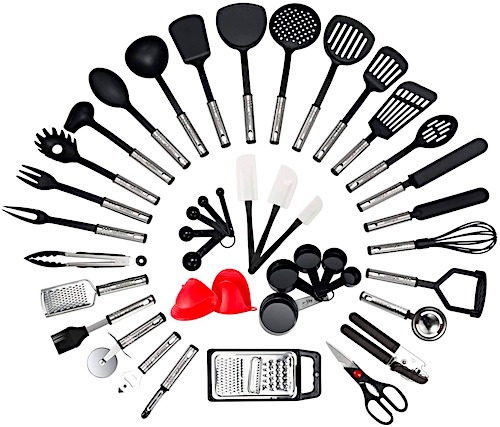
We may have forgotten our skillet, but we were sure to bring our kitchen utensil set on our first outing! We found this excellent 38 piece utensil set that has everything you should need in your travel trailer. Don’t forget to get measuring cups too!
17. Space Saving Tupperware Set
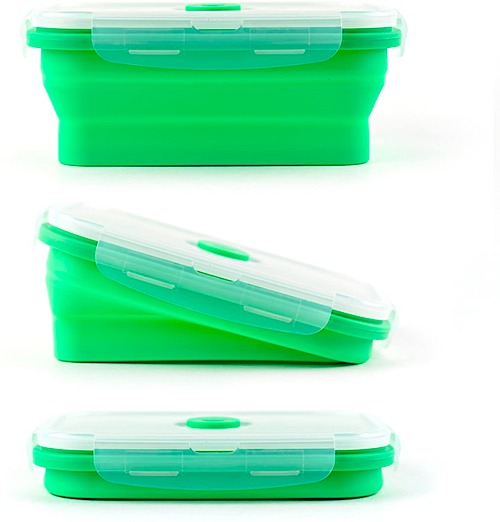
If you are anything like me and cook to feed an Army, there are sure to be left-overs! We are a family of 7, and you want to make sure there is enough for everyone, and now that most of the kids are gone from home, I am yet to learn how to cut down my portion sizes to make just the right amount for the 2 of us.
We always have leftovers, so we decided to get these collapsible containers so that they don’t take up too much space in our already small cabinets. I like these ones, in particular, because they are silicone and are BPA free.
18. Water Pressure Regulator
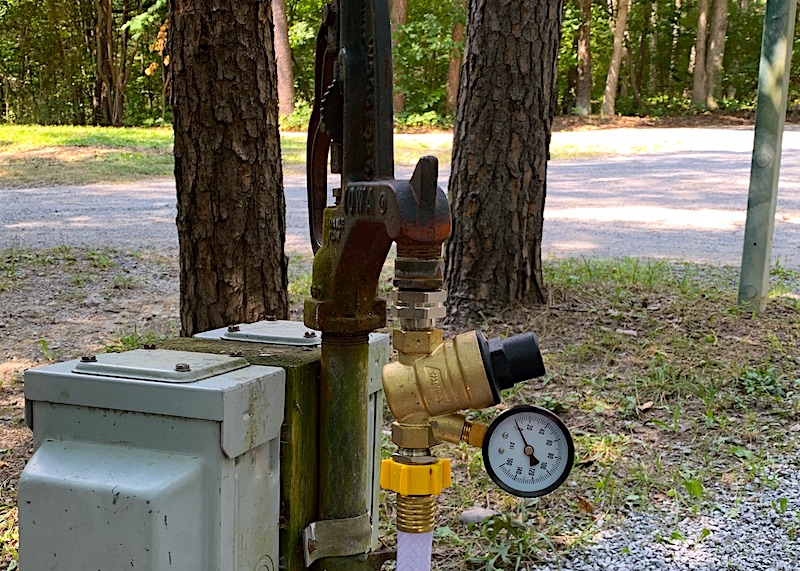
An RV water pressure regulator is a small, but useful, device that keeps the psi of the water entering your RV down to a safe level to prevent plumbing pipes from developing pressure leaks. What is the proper psi for your RV? The recommended water pressure for newer RVs is around 60 psi, and 50 psi for older ones.
The water pressure can vary quite a bit from campground to campground and without a gauge, you will have no idea what the water pressure is when water is entering your RV. You can try to guestimate the amount of pressure by adjusting the water spigot but you will regret that decision once you see a leak pop up.
Don’t make the mistake of just buying a water pressure gauge though. You want to buy an adjustable water pressure regulator with a gauge so you can know the water pressure and adjust it if necessary. Also, you will want to make sure you buy a safe brass product that meets the low lead requirements for safe drinking water.
19. Water Filter
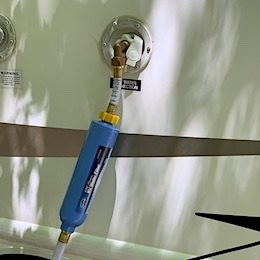
A good water filter will not only make your water taste better but it will also make your water safer to drink. Water filters can remove the taste of chlorine, and also remove contaminants and sediment too.
When looking for a water filter try to find one that is in line, which means it connects between your freshwater hose and your RV. Also, try to find one with a flexible hose protector to prevent stress and strain on the hose connection points.
We like the Camco TastePure Water Filter with Flexible Hose Protector. It comes with the flexible hose protector and it’s a great value that will last all season!
20. Short Queen Sheet Set
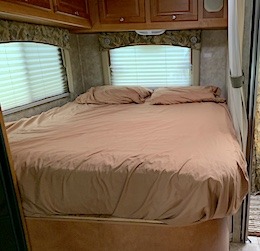
I know, sounds silly to even have to write this down. However, this is another one of those things that we said, “oh, we should remember this!” We didn’t remember until we were getting ready to leave the house! Thank goodness it is a queen sized bed, and we actually had some queen size sheets in the house.
FYI – a travel trailer queen sized mattress is actually a short queen so your queen sheets form the house will be too long to fit properly. If your good with that then great. If not check this short queen sheet out. And a blanket is always good to have for those cool summer nights.
21. Over the Door Shoe Organizer
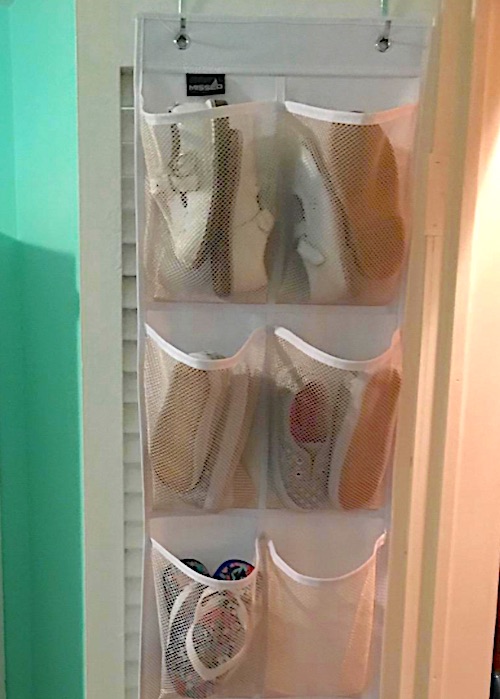
This doesn’t have to be for just shoes, either! Yes, we had some shoes in it, but it is also a great place to store other things like flashlights, bathroom supplies, or even for adding a little bit more to your pantry space. We like this shoe organizer because it is made for narrow doors and for the oversized mesh pockets.
22. Zero Gravity Camping Chairs
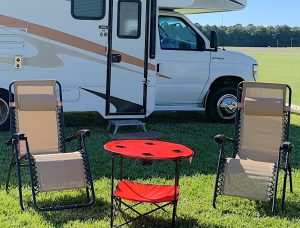
We are camping, right? Everyone needs to have their own chair to sit and relax in. I even suggest getting one for the little ones too! Camping chairs are collapsible and easily stored in the underbelly of the trailer. Zero Gravity Camping Chairs are great for sitting around the table and playing cards in the afternoon or sitting around the fire in the evening to roast your marshmallows for s’ mores! And in case you’ve never tried one, zero gravity lounge chairs are the best for relaxing!
23. Duraflame Fire Starters

Whether you are dry camping or glamping, there is no guarantee that there is going to be firewood there and ready for use. We suggest getting a few bundles for just-in-case. The big problem is that most of the camp wood bundles contain unseasoned damp wood! But if you use a couple of Duraflame fire starters they will help the damp wood to ignite and burn better.
Most campers will want a fire in the evening or maybe in first thing in the morning when the temperatures are lowest to help warm up or keep them warm. The fire pit is my favorite place to hang out in the evenings with music playing in the background and just catching-up or meeting new friends.
24. Fresh Water Hose
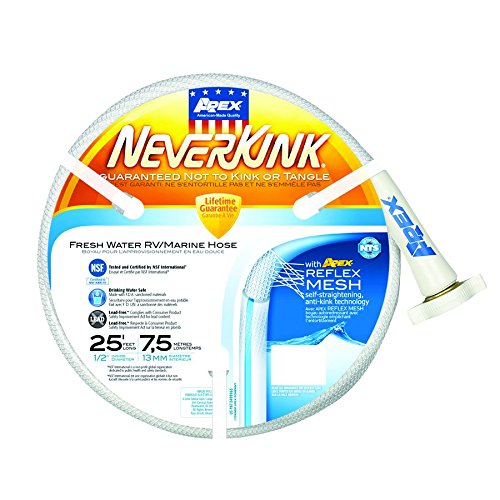
If you are going dry camping, you need to make sure that you have a good, clean fresh water hose you can use to fill up your freshwater tank. You want to make sure that you tag this hose so that it can and should not be used for anything else.
25. Sewer Hose
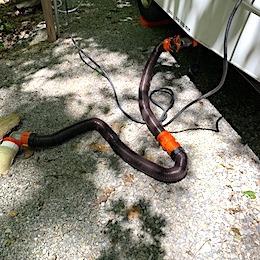
I know we don’t want to talk about it, but we all do it. That’s right, we all use the toilet. If you are going to be filling up the black tank while you are camping, we would like to suggest this RhinoFLEX black tank sewer hose with clear elbows so that you can see when the tank has been dumped and cleaned out. This set comes with everything you should need to clean out your tank.
Going out your first time in a travel trailer can be so much fun. We want you to have fun on your trip, and this is why we want to help make sure you have everything you need. Like we mentioned before, it is imperative that you write it down . We all think we can remember everything, and I am sure I have forgotten something in this blog, but we will all forget something.
For more great info about Travel Trailers check out these articles below.
- The Best SUV for a Towable Travel Trailer
- 250+ Perfect Names for Your RV or Travel Trailer
- Travel Trailer Depreciation: What’s My Travel Trailer Worth?
- Travel Trailer Turning Radius Tips
- What Size Generator Do I Need For a Travel Trailer?
- Toy Hauler vs Travel Trailer – 19 Differences Explained
- How To Level a Travel Trailer on a Slope
We would like to know your thoughts and if you forgot something on your first trip out in your travel trailer. What would you recommend someone take with them that we did not mention here? Please leave your thoughts or suggestions in the comments section below. Thanks for reading this article and if you would like to email us directly, please visit our Contact Page to send an email.
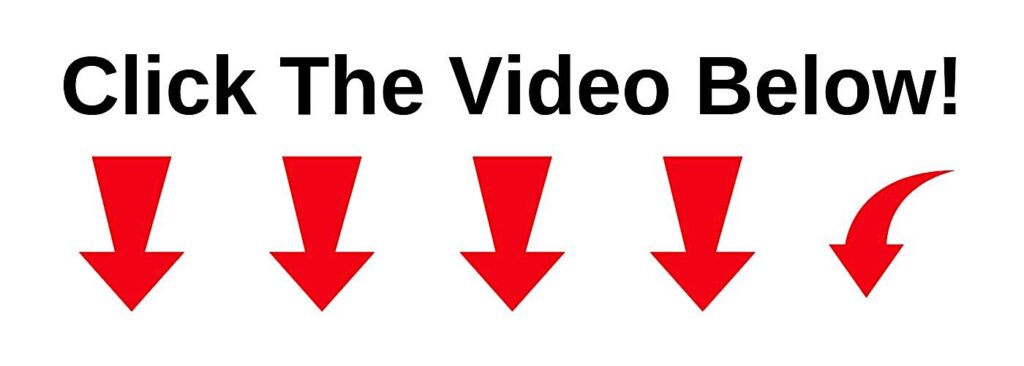
6 thoughts on “25 Beginner Supplies and Accessories for Travel Trailer Camping”
Seems like important stuff, but, what should we leave at home for weight concerns, esp. in a tiny (Casita) trailer?
Hi Gary, It all depends on what you normally pack – I know we tend to pack more clothes than we will need and we have 5 sets of chairs on board…so anything that is redundant would be good to leave at home and I also recommend making sure all tanks are empty while traveling of course. Thanks for reading! Mike
If you take your dog or cat, don’t forget their bowls, food and toys, litter scoop, poop bags for the dog, a leash. And if you take your dog on walks get a collapsable bowl so you can give them a drink. And yes, we forgot dog food once. Thank you for your great tips.
Thanks for your tips! Mike
New to Rv-ing. You have a great blog – lots of good info. Would appreciate your letting us know where you obtained the windshield cover with screening
Very good information!! Good voice and clear information!! Thank u?⛺️
Leave a Comment Cancel reply
Save my name, email, and website in this browser for the next time I comment.

This post may contain affiliate links or mention our own products, please check out our disclosure policy .
Travel Trailer: Beginner’s Guide for Your First Trip
Published on December 15th, 2019 by Levi Henley (Full-Time RVer, Content Manager and Media Specialist for RV LIFE)
Okay, so we all begin somewhere and sometime. You’ve got your new travel trailer and are planning a trip into the great outdoors. Congratulations, you’ve made a big step in the right direction.
To ensure your trip is memorable, and for the right reasons, let’s ensure you’ve checked all the boxes.
What to Pack, How to Prepare, and Planning Tips for Your First Trip

I have a son and a daughter. When they first saw our new RV, they were super excited! They began jumping around and telling all of their friends we were going camping! My first camping experience was surreal so I wanted to make theirs just as extraordinary.
DON’T MISS OUT ON CAMPER SMARTS UPDATES
Sign up for the newsletter today.
Please enter a valid email address.
An error occurred. Please try again later.
Thank you for subscribing to the Camper Smarts newsletter, keep your eye on your inbox for updates.
However, once we reached our campsite, I noticed we had forgotten so many essential items. While my family was having fun around the campfire, I was busy with a notepad writing down all of the things I had forgotten.
So my first tip is the most obvious — but also the most overlooked. Plan accordingly and buy what you need, otherwise, you’ll likely have to go without.
There are three water tanks inside. The black tank is used for toilet water and other deposits. The gray is used for sink water. And there is a freshwater tank for the drinkable supply. The black and gray tanks will be empty as you set out and will need to be dumped before you head back home .
Before you head out, determine if you need to fill your fresh-water tank. My campsite had an RV station that provided free drinking water so I was able to forgo the process to save myself the extra weight. If you’re considering the same, call ahead to your campsite and make sure they provide this service.
Another packing tip is to store the heavy items (such as your generator) low to the ground and near the front of the trailer.
What You Should Know About Driving While Towing an RV
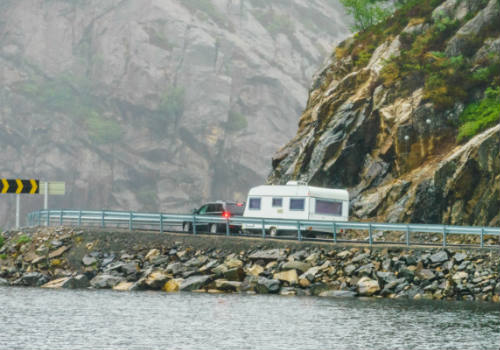
The first thing you should do is check how much weight your towing vehicle can tow. Most trucks and SUVs list this information on the driver door with a sticker. I have a 2012 Ford F-150 that can tow 11,500 pounds. Previously, I owned a 2010 Dodge Durango with a 7,200-pound towing capacity.
Once you check your truck, you need to check your trailer’s weight. There are three weights. The first is dry weight, which means how much the trailer weighs without any supplies or water. The second is the GVWR, or its weight once water and supplies are loaded. The third weight is called tongue weight. This refers to how much weight the trailer pushes onto the vehicle’s hitch. It is important that NONE of these figures is more than your truck’s towing capacity .
More than this, I highly recommend a 1,000-pound window between what you are towing and what your truck claims it can tow. Many truck-manufacturers buff this number up. Nobody wants to take a camping trip and destroy their engine or transmission on the road, especially with excited children in tow.
You should also make sure to note the truck hitch’s ball size. The majority of travel trailers use 5/8 of an inch, which is bigger than other trailers and boats.
When driving, be extra careful around tight turns on mountainous roads. Note the caution signs you see on the highway that display a trailer falling over. Yeah, those signs are for you now. I would be remiss to discount the large number of RVs that I have seen turned over onto their sides because of reckless driving.
Also, be careful of fishtailing, which is highly probable when a truck is towing an RV. I recommend that you install a hitch with weight distribution. A sway bar or suspension airbags will also do the trick. If you do happen to start fishtailing, be careful to avoid turning your wheel or slamming the brakes. Just remove your foot from the gas pedal and continue forward momentum. If your trailer is fitted with brakes, then give them a SLIGHT tap. Nothing too heavy.
When driving, also take special care of low hanging trees. Roads full of tree branches can be a nightmare for a trailer or any size.
Finally, avoid steep declines when driving. They will cause the trailer’s tongue to hit the ground and your stabilizers to bend.
What to Do at the Campsite
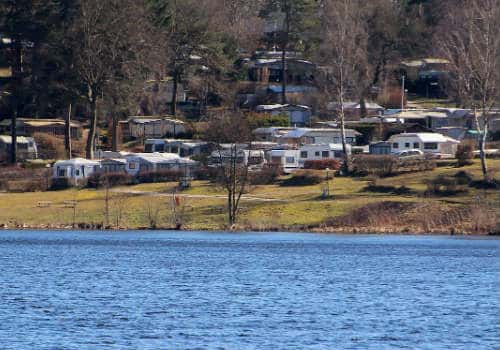
Make sure to park your trailer on the flattest ground possible. If the trailer is not level, you will feel odd when walking around. Beyond you feeling odd, the RV will also bounce a little with each step. More importantly, if you are parked upward or downward, you can damage the fridge inside the trailer.
My next point of advice is to unhook your trailer from the tow vehicle. This is because setting up the trailer is much easier when it’s not connected to the vehicle, as the stabilizers will connect with the ground below. Otherwise, you would have to match their contact with the hitch’s height. Also, with your truck free, you can explore the town or drive the children to the swimming hole.
Then, you must set up the stabilizers. Most travel trailers come with four. They are there to make sure the RV doesn’t bounce around when you walk inside. If you don’t install them, get ready to experience a shaky trailer each time someone uses the bathroom or turns to their side when sleeping.
The final point is to make sure that you have the proper power adapters if your campsite provides power. The common feature of travel trailers is 30 amps, but there are some with 15 or 50 amps. If you forgot the power adapter, or have the wrong one with you, then forget about connecting to the park’s provided power.
RV Power and HVAC
You must know that the travel trailer’s battery isn’t going to provide electricity to your air conditioning unit. For this, you need a generator with at least 3,000 watts of power. Also, it’s not a good idea to do any heavy electrical lifting when running the AC unit. This includes using the television or the microwave.
Of course, if you’re plugged into the park’s power, then you can forget this point entirely. Otherwise, if you plan on running all of the electrical devices in your trailer at once, be prepared to buy a massive generator.
When you’re using your generator, move it as far away from your trailer as possible. Several nice generators provide a quiet service, but most do not. If your generator is loud, check out this article on how to quiet it by up to 50% .
Your fridge can probably run using either electricity or propane. I prefer propane use if I’m driving or in a campground without power. Once I plug into the campground power outlet, though, I switch to electrical power. Some of these fridges, including mine, have an automatic setting that realizes when there’s connected power and shifts the power mode accordingly.
Water, Water, Water
Again, there are three liquid tanks in your RV: fresh, gray, and black. The fresh, as mentioned above, is for your drinking water. The gray will be filled with your shower and sink water. The black is for the toilet.
There’s a difference in water capacity for different trailers. Although I have a fairly big 43-gallon freshwater tank, there are four people in my family. If the campground doesn’t have shower installations, we can’t all take showers daily. This is something to consider ahead of time.
Don’t worry about the strange taste in the drinking water on the first use. It is completely normal (and healthy) and will pass after a few run-throughs.
I think it is a good idea to stock your RV with a hand-sanitizer. This is to prevent using too much water after going to the toilet. Also, be sure to turn off the water as you brush your teeth.
Post-Trip Information
Okay, so you’ve had a great first camping trip in your travel trailer. Now, you need to find an RV dump station. This can be a bit hard at first (especially on your own and during your first trip), but if you ask around, it shouldn’t be too painful of a process.
Upon arrival at the dump station, park before the dump hole so you can make sure that the trailer is on the right side. You’ll want to have purchased an RV dump hose because they don’t come with new trailers.
Once you connect one end of the dump hose to your trailer and place the other one into the hole, pull the black lever that can be found underneath your trailer. All of the accumulated sewage will spill forth, so you’re forewarned. Once the nastiness has washed away, remove the dump hose, wash it thoroughly, and store it.
Share this post:
Related posts:.

Boondocking Safety: Mastering Dispersed Camping in the Desert
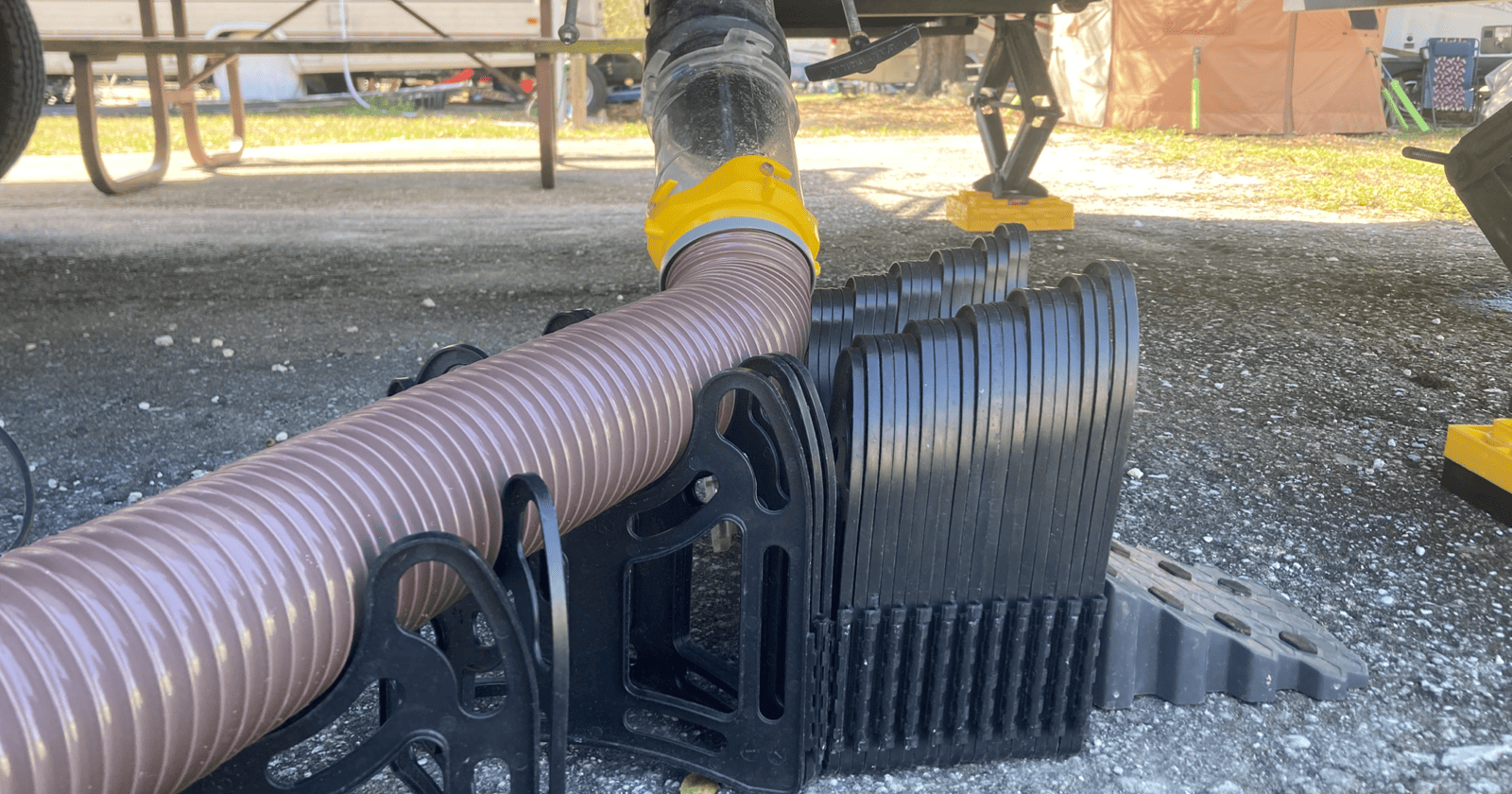
Why RV Sewer Hose Supports Are a Must-Have: Improving Sanitation & Stability

Safe Camping Near Alligators: Essential Tips and Destinations in the US
About the author:.
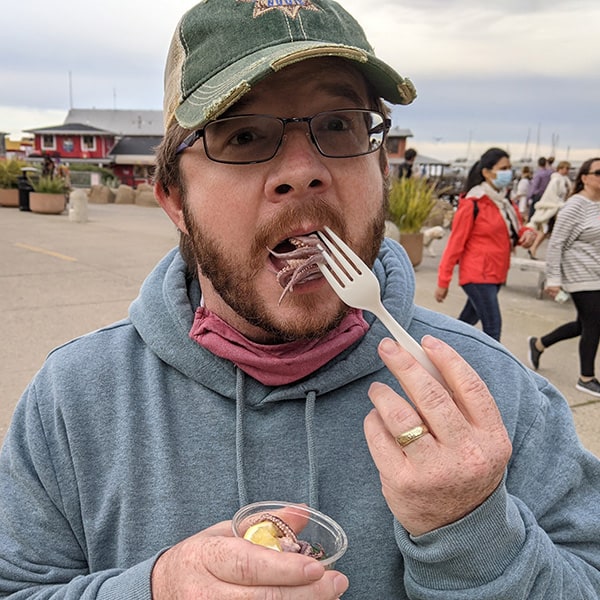
Levi Henley, RV LIFE’s Content Manager and WordPress specialist, is renowned for his expertise in RVing and workamping, having lived on the road since 2015. He’s the author of the popular guide “Seasonal Workamping for a Living: How We Did It” , a testament to his deep knowledge in the RV community. For more insights into Levi’s nomadic lifestyle and expertise, visit Henley’s Happy Trails .
Levi Henley: Content Manager, Media Specialist at RV LIFE
Levi Henley stands at the forefront of RV-centric content, wearing multiple hats as a Content Manager and Media Specialist for the RV LIFE network. With his deep-rooted expertise in RVing, workamping, and the full-time nomadic lifestyle, Levi has been writing about and living the lifestyle since he hit the road in 2015 with his wife Natalie.
Their journey, punctuated by innovative approaches to nomadic income, has culminated in the guide, " Seasonal Workamping for a Living: How We Did It ," a testament to their hands-on experience and knowledge. This resource, available on Amazon and through their personal website, Henley's Happy Trails , offers invaluable insights into the mobile lifestyle. Levi's has written for RV industry media key organizations like Coach-Net, Escapees, and Workamper News.
Beyond his professional prowess, Levi is a man of diverse talents and interests. He's not only an actor and magician but also a certified scuba diving instructor. His adventures across the country in a 2011 Sunstar Itasca, accompanied by Natalie and their two feline companions and rambunctious dog, embody the spirit of exploration and lifelong learning.
1 thought on “Travel Trailer: Beginner’s Guide for Your First Trip”
Great article, some good stuff there
Comments are closed.
Follow Camper Smarts:
- Follow Us On Facebook
- Follow Us On Twitter
- Follow Our Pins

- Apr 4, 2022
Beginner Guide to Camping with a Travel Trailer
Updated: Nov 22, 2023
Back in 2021we had decided to spend our Thanksgiving outdoors and rented a small RV. I had written about our experience here . We went to Byerly RV Center wanting to rent a camper van and there was nothing available, but the 23TW Gemini RUV Motorhome was available so we had rented that. We had a lot of fun and thought we should go to the RV show here in St. Louis to check out what are the other motor homes that are available.
We did find a lot of RVs, Travel Trailers, Fifth Wheels and Campers but we were not ready to purchase at the show just yet. We did decide though to visit Bill Thomas Camper Sales because we were talking Anthony Hill, a sales representative, from that company who was really helpful in explaining different features in the campers. He had invited us to come to their dealership because they have a lot more he can show us than what is on the show. That we did!
After talking it out a day or 2 we decide to buy a used 2021 Grand Design Transcend 221RB . We figured that with the high cost of rental and how much we really enjoyed it we would get our money's worth if we just have our own.
We took it for a a "test" camp in Cuivre River State Park which was about 30 minutes away from the Bill Thomas Camper Sales. Shortly after the turnover of our camper we head on to the park.
Attaching the travel trailer to our truck I think is the most nerve wracking part of the set up because you have to make sure that you do not skip a single step when attaching the trailer to the truck.

Thankfully we arrive at the park, we even back up this entire thing into our camping spot which was on Campground (1-68) site 19.

The campground we were on were pretty open and there were already a lot of other campers on the site. It was a full hook up site (water, sewer and electricity) but since it is still winter water was off.

The next day we spent the day exploring some of the trails we have not hiked before. We had to pose for a photo op on one of the bluffs with our matching t-shirts courtesy of Bill Thomas. Georgia of course had to do a look back

Here are some of the pictures from the inside
We stayed in Cuivre River for 2 nights and the total cost of our camping trip was a little over $53 but we had so much fun trying out our travel trailer and learning how to use it as we go.

We learned a lot of things on our first trip camping but here are my top lessons on the trip:
Top 10 Tips for Beginner Travel Trailer Camping:
Camping with a travel trailer is an exciting adventure, especially for beginners. To ensure a smooth and enjoyable experience, here are the top 10 tips to keep in mind:
Choose the Right Trailer: Select a trailer that suits your needs, considering factors like size, amenities, and towing capacity. Our dealer helped us determine the right capacity for us.
Practice Towing: Familiarize yourself with towing and parking your trailer before hitting the road. We had practiced doing this in the parking lot before we took the trailer out for camping.
Plan Your Route: Plan your route in advance, including campsite reservations and potential stops along the way.
Pack Thoughtfully: Make a checklist and pack essentials like cooking equipment, bedding, clothing, and RV-specific supplies.
Level Your Trailer: Use leveling blocks to ensure your trailer is on a flat surface to prevent discomfort while sleeping.
Hook Up Utilities: Learn how to connect water, electricity, and sewage, and always carry necessary adapters and extension cords.
Stabilize and Secure: Use stabilizer jacks to prevent rocking, and secure all belongings inside the trailer during travel.
Maintain Safety: Familiarize yourself with the trailer's safety features and always carry safety equipment like fire extinguishers and first aid kits.
Be Mindful of Weight: Avoid overloading your trailer to maintain safe towing and control.
Embrace Flexibility: Stay flexible with your plans, and don't be afraid to ask for help or advice from fellow campers.
Remember, the key to a successful first-time travel trailer camping experience is preparation and a willingness to learn. Embrace the journey, and you'll create wonderful memories in the great outdoors.
Also an additional tip, since we had heard that it is difficult to find camping spots we've had a couple of camping site already booked for the summer so this is just the beginning of our travel trailer camping adventures! If you had enjoyed your camping trip. Plan ahead, looking for camping spots can be difficult
I hope you found our Beginner's Guide to Camping with Travel Trailer
Join us next time!
Recent Posts
Why you should always have a shakedown camping trip at the start of the season
Unleash Your Inner Explorer: Mastodons, Boone, and Winter Things to do in Missouri
Unforgettable Journeys Await: Explore the Hidden Gems of Washington, Missouri
Comentarios

- Find a Location
50 RV Hacks and Tips You Haven’t Tried

Sounds weird, right? Pine cones are the perfect fire starter since they essentially burst into flames once lit giving a head start to any kindling or wood you may have on standby. Plus, nature provides them so they’re free!
6. Doublecheck Your Campfire
Before leaving, make sure your campfire is completely out. As a general rule, you should be able to touch the ground inside the fireplace or firepit . If it’s too hot, continue extinguishing the fire with water or smothering it with dirt. Leaving a fire smoldering could lead to a forest fire. Be a smart, safe, and considerate camper by practicing forest fire safety.
7. Get a First Aid Kit

Adventures can be unpredictable, so be prepared by having a fully stocked first aid kit in your RV.
8. Bring a Tool Kit

A basic tool kit could quickly become your best friend. You never know when you’re going to need a screwdriver to tighten/loosen something or a hammer to pound something in place. Better safe than sorry.
9. Have a Hairdryer On Hand
A hairdryer can do more than dry your hair, it can also warm up cold kindling or help thaw frozen pipes. Who doesn’t love a multipurpose item?
10. Be a Winner – Pack Games

Sometimes the weather doesn’t cooperate, or your schedule gets away from you; having game options within reach that you can easily play inside the RV keeps boredom at bay.
11. Wash Your Clothes While Traveling
Throw your dirty clothes into a bucket with a tight lid along with water and laundry detergent then find a place in your RV where the bucket can be secured, like the shower. Every turn you take and bump you hit will agitate the clothes just like a washing machine does. After a few hours, once you arrive at your campsite, your clothes will be clean, ready to rinse, and line dry.
12. Hang Your Clothes on a Suspension Rod
Place a suspension rod in the shower and use it to hang wet clothes to dry or as additional closet space when the shower isn’t in use.
13. Stock Up on Collapsible Storage

Whether using it for dirty laundry or to haul items to and from the campsite, collapsible storage is the true MVP of RVing. It folds flat when not in use for easy storage and corrals whatever you need it to when in use.
14. Secure Cabinets and Drawers with Bungee Cords
Help keep cabinets and drawers closed, and contents contained within, while in transit with bungee cords .
15. Upgrade Your Shower Head

The low-pressure shower heads that come standard with most RVs leave a little to be desired. Upgrade your shower head to a high-pressure model and experience luxury on the road.
16. Double Duty Towel Rods
Install towel rods at a lower level inside the shower to hold bath products in place while traveling.
17. Use a Shoe Organizer in the Shower
If installing an extra towel rod sounds like a commitment, try using a shoe organizer instead. Hang it on the inside of the shower curtain as a liner and use the pockets to hold all your bath products.
18. Use a Shoe Organizer in the Bedroom

While you’re at it, grab another shoe organizer for the bedroom or closet. By cutting the organizer along the designated rows, you can use them to outline the perimeter of your bed. Then you can store your shoes neatly and out of the way.
19. Handwashing Station
It might sound weird, but it works. Use pantyhose as a makeshift soap dispenser. Drop a bar of soap into the toe of a pair of pantyhose and tie it to the water spigot or outdoor faucet at the campsite – an instant and convenient handwashing station.
20. Use Press’n Seal on Cups
For both kids and adults, use Press’n Seal plastic to turn regular cups into travel cups and avoid those inevitable spills that happen on the road.
21. Suction Cup Caddies for Kids

Use suction cup bath caddies to corral toys, games, and devices by sticking them to the windows around the dinette or beside the passenger seat.
22. Install Accent LED Lighting

By installing stand-alone accent LED lighting , you can illuminate your RV without pulling from your main power source.
23. Deter Ants with Gorilla Tape
Wrap a few strips of strong Gorilla Tape around openings that ants usually enter and stop them in their tracks. Literally.
24. Deter Wasps with Flea Collars
Propane tends to attract wasps. Stop infestations before they start by placing cut-up flea collars in various compartments.
25. Deter Mice with Irish Spring Soap
Fun fact: Mice hate the smell of Irish Spring soap. Keep a bar in the RV to deter mice, especially during winter.
26. Non-slip Liners Inside Drawers and Shelves
Use non-slip liners inside drawers and shelves to keep items from rolling around while traveling.
27. Protect Glasses with Socks
A pack of cheap socks can protect your bottles and glasses . Slide a sock over each item to keep them from breaking if they bump into each other while going down the road. If they do break, the sock will hold all the glass inside for easy clean-up.
28. Command Hooks are an RVer’s Best Friend
Hang everything using command hooks . We’re talking cooking utensils, coats, pictures, curtains – you name it, command hook can hang it. You’ll never make a million nail holes or screw something into the wall again.

29. Command Velcro is also an RVer’s Best Friend
You can have more than one best friend, it’s okay. Use Command Velcro to hold remote controls in place near seating, hold pictures and art to the wall, or attach utensils inside of cabinet doors. The possibilities are endless.
30. Insulate Your RV Windows with Bubble Wrap
RVing in the winter or during cold weather? No worries. Use bubble wrap to cover your windows and help insulate the space.
31. Get a WiFi Booster

Off-grid doesn’t have to mean offline. Sure, most campgrounds provide wireless internet, but the signal isn’t always the best. Avoid the frustration with a booster to improve your WiFi reception while on the road.
32. Protect Your Head with a Pool Noodle
Ever walk right into a metal awning strut? It’s not fun. Protect yourself by slitting a foam pool noodle and wrapping it around the struts. You’ll get visibility and safety all in one.
33. Stock Up on Free Condiments
Save all those unused condiment packs from restaurants you visit along the way. They take up less space than full-sized bottles, plus they’re free.
34. Invest in a Collapsible Ottoman

RV living requires some items to be double-duty. A collapsible ottoman is a perfect option for extra seating, a place to put your feet, or as an extra storage space. When you don’t need it, collapse it and store it. Win/win.
35. Recover the Dinette Cushions
You may not love every detail of your RV, but simple updates in a few places can change the entire feel of your space. Recovering the dinette cushions in a fabric you like is one of those simple updates.
36. Change the Curtains
Another simple update is changing out the curtains. Replace the panels, recover the valences, or remove them entirely – either way, you’ll fall in love with your space all over again.
37. Use Museum Putty to Hold Items in Place
Want to keep the coffee maker on the counter? Put museum putty to work. It doesn’t ruin your counter or your breakables but holds them in place until you decide otherwise.
38. Freeze 2-Liter Bottles to Use as Ice
Before you leave, clean and fill a few 2-liter bottles with water and freeze them. When you’re on the road, they’ll act as ice inside the freezer or cooler. When they melt, you’ll have clean drinking water .
39. Creative Egg Storage
Who doesn’t enjoy scrambled eggs while out and about? Avoid the disaster of having broken eggs on the road by cracking them in advance and storing them in a clean, empty coffee creamer container. Easy scrambled eggs!
40. Have Binder Clips Ready and Available

Surprisingly, binder clips are the perfect tie-down solution. They’re also great for hanging outdoor lights . Instead of mounting tape, use a binder clip to attach your string lights to your awning. If you have an abundance of clips, they’re phenomenal as chip clips and keep your favorite snack fresher longer.
41. Glow-in-the-Dark Tape
To preserve battery life and electricity, use glow-in-the-dark tape for surfaces like RV steps. Doing so allows you to navigate your way around the RV in the dark without having to turn on any lights.
42. Wear a Headlamp

For those times when you’re taking the dog out for a quick walk or potty break at night, a headlamp is an ideal solution. It keeps your hands free, and you don’t have to turn on any additional lights inside the RV to find your way out and back in again.
43. Create a Pet Nook
If you have a cabinet to spare, try removing the door and putting a pet bed inside to encourage your pet to use it as their space while traveling. It will keep them contained and safe while freeing up valuable floor/furniture space for everyone else.
44. Outdoor Paper Towel Holder
A garden flag stand doubles as a paper towel holder. Whether you choose to put it near your water spigot for handwashing or next to your outdoor kitchen for maximum convenience, it’s a game-changer.
45. DIY Tank Cleaner
Take a cup of Borax detergent and ½ cup of Calgon Water Softener and you have a tank cleaner that helps control odor while preventing waste from sticking to the walls of the tank. Maintaining your RV toilet is super important.
46. Dry Erase Board Info Station
Hang an inexpensive dry erase board, or use peel-and-stick dry erase wallpaper , in your RV to write down important information like the name of the campground, spot number, phone number, etc. so it’s easily accessible for everyone should they need it.
47. Vent Cushions Help Regulate Heat
Looking for a small investment that goes a long way? Look no further. A vent cushion helps regulate the temperature inside your RV which can be a lifesaver at parks that charge for electricity.
48. Tire Monitoring System
Investing in a quality tire monitoring system, like the TireMinder TM-77 , can save you thousands of dollars in repairs by helping prevent a blown tire in transit.
49. Clear Utility Boxes

A few clear utility boxes can corral items like batteries and command hooks so they remain organized and contained instead of rolling around a drawer.
50. Cutting Board Counter Space Enhancer
Create more counter prep space by placing a cutting board over the stovetop when not in use. Easy and effective.
- Comment (13)
Turn off propane? So how do we keep the refrigerator running, How does a spouse cook a meal while the other is driving? (tight timelines) ect… I get the safety issue, but practicality, not so much.
Borax contains Boron. Boron does not break down with time, so NEVER dump it anywhere except city sewer systems which are treated, filtered and processed before being put back into the water systems. Fun fact: Borax/Boron will kill ‘creeping charlie’ weeds in your yard, but only use it to treat any given area ONCE, because of its ‘everlasting’ properties.
Repurpose an old garden cultivator to use to reach and pull items from the back of the storage areas. The one I use has had two tines broken out of it, but the two that are left work just great for this job. I have also used it to reach so I can position and roll out the RV cover across the roof while I stand on the ground. It can also be used to reach and push items under the RV.
I use flat sheets to cover my cushions and then can take them off and wash them when I get home. Thanks for the tips
Add screw on or hang over the door towel racks in the bathroom.
Use sticky cup hooks upside down on either end of a small trash can to hold plastic grocery bags that are used for trash.
This article was packed with super ideas! I am going to try out a few next time we are out and about! Thanks!
When putting out fire. If using dirt to smother the fire, make sure it is fine dirt and not a shale type. Some soils end up only insulating the fire. Heavy winds can blow off dirt and blow embers out of pit after your gone.
Love these! Some are tried and true and many are new. I especially like the ones that are multi-purpose, make use of what is already lying around and help conserve resources. For us, I would put a small towel at the wash station since we don’t use paper towels. We’d rather they remain as trees. Thank you for the great suggestions!
Also a cutting board across an open drawer for extra counter space.

Some motorhomes are designed to allow you to keep propane on while driving to maintain the temperature in your refrigerator. For travel trailers, however, it’s recommended to turn propane off before traveling to prevent a possible explosion in the event of an accident. Many travel trailers have exposed propane lines underneath and there’s significant risk to having propane in those lines if they are damaged by road debris or in an accident. We understand it may not be practical always, but it’s better safe than sorry, and we’d also steer clear of operating your oven or cooktop when driving your motorhome.

Nice. Thanks for the tip!
Great idea Rochelle!
Leave Your Comment Cancel Reply
Save my name, email, and website in this browser for the next time I comment.
Shop By RV Type

Your Adventure Awaits
Copyright © 2023 cwi, llc all rights reserved.
- RV Glossary |
- Privacy Policy |
- California Privacy Rights |
- Do Not Sell or Share My Personal Information |
- Targeted Advertising Opt Out |
- Terms of Use

Travels with Ted
RVing for Beginners: 44 Important Tips, Tricks and Hacks
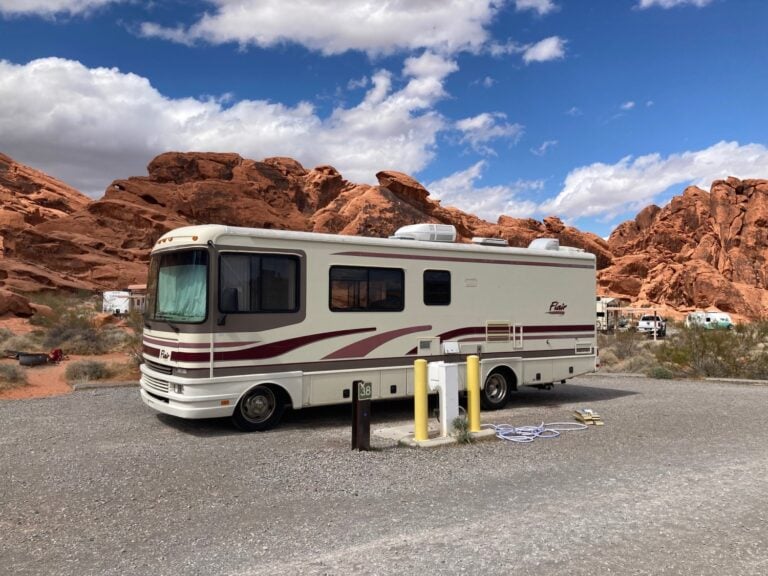
This post may contain affiliate links. See our affiliate disclaimer here.
RV camping is one of the best ways to travel and explore America. However, properly caring for an RV requires constant maintenance. RV road trips also require careful planning to select safe routes and find the best places to stay.
Keep reading our complete guide to RVing for Beginners for 44 essential RV camping tips that will keep your family safe and happy on the road.
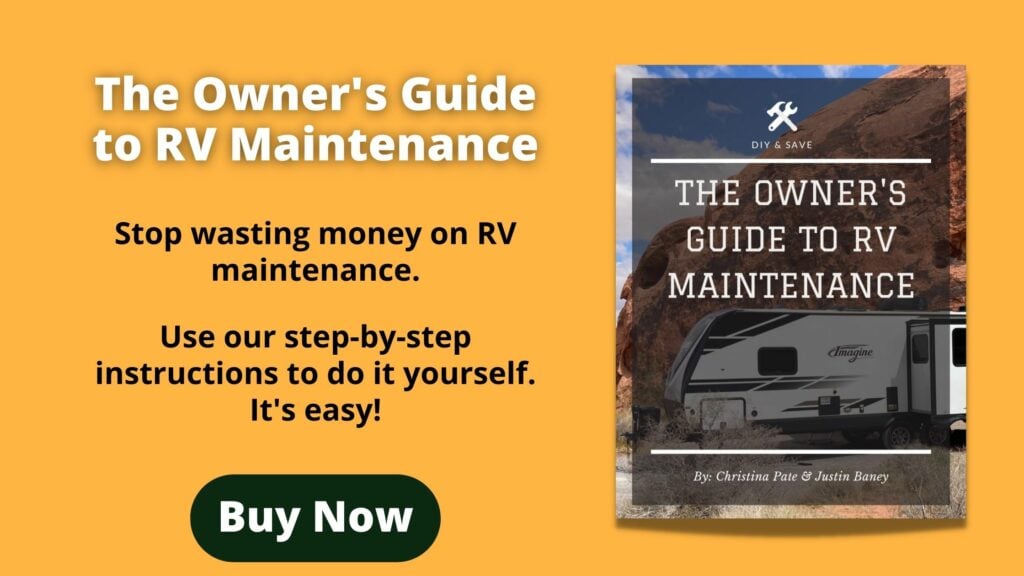
- 1.1 Service Water Heaters Annually
- 1.2 Service Air Conditioners Annually
- 1.3 Sanitizing Fresh Water Tanks
- 1.4 Lubricate Holding Tank Handles
- 1.5 Sealing Windows and Doors
- 1.6 Prevent and Remove Mud Daubers
- 1.7 Removing Black Streaks
- 1.8 Prevent Damage when Winterizing
- 1.9 Inspect Entry Stairs
- 1.10 Inspect Plumbing Connections
- 1.11 Maintain RV Batteries
- 1.12 Photograph the Bottom of Slide Outs
- 1.13 Keep It Simple
- 2.1 Black Tank Camping Gear
- 2.2 Sewer Hose Supports
- 2.3 Surge Protector
- 2.4 Water Pressure Regulator
- 3.1 Safe Following Distance
- 3.2 Finding RV Friendly Fuel Stations
- 3.3 RV Travel with Pets
- 3.4 Greasing the Hitch Ball
- 3.5 Tire Checks for RV Travel
- 3.6 Changing Travel Trailer and Fifth Wheel Tires
- 3.7 Securing Cabinets for Travel
- 3.8 Know Your RV’s Height
- 3.9 Plan your Route Carefully
- 3.10 Parking with Slide Outs
- 3.11 Manual Jack Overrides
- 4.1 Troubleshooting Hot Water Issues
- 4.2 Fixing Clogged RV Showers
- 4.3 Fixing Beeping RV Refrigerators
- 4.4 Preventing Condensation
- 4.5 Receiving Mail on the Road
- 4.6 Snow Removal
- 4.7 Photograph Electric Meters
- 4.8 Test RV Toilet Paper
- 4.9 Changing Thermostat Scale
- 4.10 Accessing Clean Drinking Water
- 4.11 Resetting LCI Leveling Systems
- 5.1 Checking Spare Tires
- 5.2 Transport Propane with Care
- 5.3 Locate Nearby Emergency Services
- 5.4 Test for Propane Leaks
- 5.5 Checking Safety Device Dates
RV Maintenance Tips
Our first RVing for beginners tip is to learn RV maintenance and learn it now! Proper RV maintenance will keep your RV out of the shop and on the road. Follow these tips and tricks to keep your RV in tip top shape.
Service Water Heaters Annually
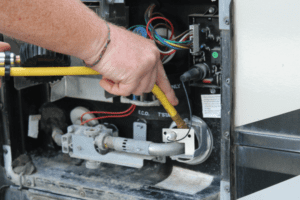
RV water heaters need to be cleaned at least once every year to flush out sediment that has built up and prevent damage. Cleaning your water heater is a simple process that most RV owners should be able to do on their own.
See our guide to maintaining RV water heaters for step by step instructions on how to clean Atwood and Suburban water heaters.
Service Air Conditioners Annually
Rooftop RV AC units also need to be cleaned and serviced annually. Properly maintaining he air conditioner does require climbing onto the roof of your RV.
If you are not comfortable standing on your roof, schedule annual maintenance with a certified RV technician. If you feel comfortable completing the service yourself, see our step by step guide to air conditioner maintenance.
Sanitizing Fresh Water Tanks
RV fresh water tanks also need regular cleaning. These tanks should be sanitized on new RVs before your first trip, before and after long periods of storage and after contamination (i.e. filling with water in Mexico).
To sanitize your fresh water tank, simply empty the tank, fill it back up with a mixture of bleach and potable water, let the solution sit for several hours and thoroughly drain and flush the tank. See our step by step guide to cleaning RV fresh water tanks for more detailed instructions.
Lubricate Holding Tank Handles
The handles for RV black and gray tanks need to be lubricated. If they are not properly lubricated, the handles can stick and your black tank can get stuck in the open position. To prevent sticky handles, lubricate them regularly.
First, empty all of your holding tanks. Then, pull one handle out and spray Teflon lubricant on the metal rod. Slowly pull the lubricated handle in and out a few times. Repeat for the other tanks. Always pull the handles straight out, twisting can damage the connected cables.
Sealing Windows and Doors
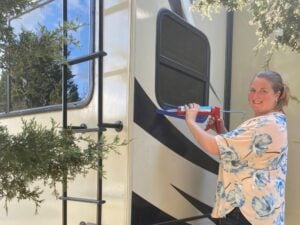
Keeping all of the seals around your RV’s exterior doors, windows and storage bays is critical for preventing water damage. Visually inspect the seals each month. Any spots with cracked, chipped or thinning sealant needs to be re-sealed.
Before applying the sealant, remove the old sealant. Then, place painters tape above and below the sealant line to ensure even lines. Apply the new sealant with a caulk gun and remove the tape after 3 to 5 minutes.
Check the forecast and make sure there is no rain for at least 24 hours so they sealant has time to dry. See our guide to RV sealants for more details.
Prevent and Remove Mud Daubers
Mud Daubers are wasps that build their nests from mud. Unfortunately for RV owners, these wasps like to build their nests in RV appliances. These nests can damage appliances or in the worst case scenario, start a fire.
To prevent mud daubers, put protective screens over openings of appliances such as your hot water heater. After any prolonged period of not using your RV (or specific appliances), visually inspect appliance panels for nests. If mud duaber nests are found, do not turn on the impacted appliance until the nests have been removed.
For more ways to enhance your travel experience and protect your RV, click here see our list of 40 more essential RV upgrades.
Removing Black Streaks
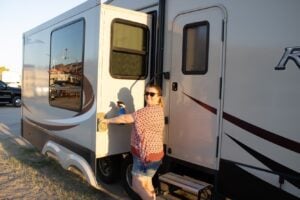
Black streaks on RV exteriors are caused by water from rain or air conditioners running down the surface of the RV. Any dirt or pollutants in the water are left behind and create black streaks on the camper.
The easiest way to prevent black streaks is to keep your roof and AC drain pipes clean, so there is not a lot of dirt in the water running down your RV.
Most black streaks are easily removed with soap and water, but Reliable 1 cleaning solution works great for stubborn black streaks that have been baked in by the sun. Click here for a more detailed guide to removing black streaks.
Prevent Damage when Winterizing
During the winterizing process, the aerator screens in your kitchen and bathroom sink faucets can become clogged with debris from your lines or calcium from the water heater.
To prevent this issue from occurring, remove and clean the aerator screens after winterizing and before de-winterizing. If your kitchen faucet has a spray nozzle, you may need to remove the entire faucet head instead.
Inspect Entry Stairs
Like all things in an RV, entrance stairs need to be routinely inspected. The most common issue with stairs is screws coming loose during bumpy travel days.
Check the screws every month or so to make sure they are secure. Always have extra screws on hand, in case one completely pops out.
Inspect Plumbing Connections
The plumbing line connections in RVs are attached with clamps. These clamps can easily come loose during travel or due to high water pressure. Once a clamp detaches, water will flow out and can cause a major flood.
These fittings should be checked regularly to ensure they are tight and undamaged. Carry extra clamps and a PEX crimping tool in your RV to repair any loose connections. It is always a good idea to turn off your water pump or the city water before leaving your RV.
If a leak happens when you are away from camper, it can turn disastrous quickly. Check out our list of 27 other essential tools every RV owner should have in their tool kit.
Maintain RV Batteries
If your RV has a wet or flooded cell battery, you should be checking the water levels regularly. To check the water levels, remove the caps on the battery cells and make sure the water is high enough to cover any exposed plates.
The water should ideally come to 1/8 of an inch below the split-ring. The split-ring is the plastic ring that extends about 1 inch down into the cell. When adding water to your battery, make sure the battery is fully charged and only use distilled water.
Pay special attention to battery water levels when you are camping in hot weather or dry camping and frequently discharging the battery.
Photograph the Bottom of Slide Outs
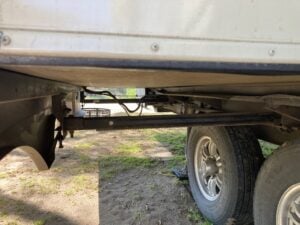
All RV slide outs have wires for their electric power, and some may also contain wires and lines for appliances. However, different manufacturers attach and secure these lines in different ways.
Every RV owner should take pictures under each slide out. Then, when wires become loose or unattached, you will know exactly how to re-secure them.
Keep It Simple
This rule is probably one of the most important tips in our guide to RVing for beginners. When troubleshooting issues in your RV, remember to keep it simple and look for the most obvious solution first.
Many new RVers end up paying a professional to flip a switch because they did not check the obvious culprits before calling for help. For example, if your furnace will not start, first check that the propane tank is turned on and not empty.
Must Have RV Gear
Our next section in the complete guide to RVing for beginners is must have RV gear. These essential RV accessories should be purchased before your first road trip.
Black Tank Camping Gear
There are two awesome pieces of equipment that will making emptying your holding tanks easier and more sanitary. The first item, is an RV gate valve . This valve attaches to your sewer output and has it’s own closure.
Close the door or gate on this valve before disconnecting the sewer hose to prevent leaks and drips. The second piece of gear is a reverse flush valve . This tool is used to shoot water up into the black tank to break up stubborn clogs. Every RVer should own both of these.
Click here to see sanitary ways to store your RV sewer hose and other black tank gear.
Sewer Hose Supports
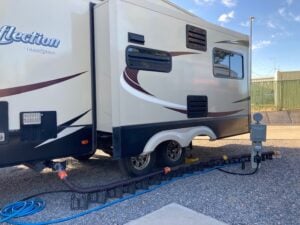
Another important item for proper holding tank cleaning are sewer hose supports . When your RV is connected from the the RV to the dump it is super important that it flows down the whole way to avoid clogs.
Using sewer hose supports is the easiest way to ensure the waste from your RV can drain properly. The sewer hose should never be laid flat on the ground or where it points upward away from the RV.
Surge Protector
Surge protectors are one of the most important pieces of equipment to protect your RV. If you own an RV, and do not have one, go buy it today! Surge protectors should be used every time your plug into shore power.
These devices protect your RV from surges due to lightening or other issues. Newer models also protect your RV from incorrect wiring and electrical issues at campgrounds.
At each new campsite, turn the power off, plug the power cord into your RV and plug the surge protector into your power cord and the campground’s electric box. Then, turn the power on and check the lights on the protector. If the surge protector indicates an issue, turn off the power, unplug and ask the campground for a new site.
Water Pressure Regulator
Another critical piece of RV gear is a water pressure regulator . Water pressure regulators prevent high pressure from damaging delicate RV water lines. A regulator should be use anytime you are connected to city water at a campground.
To use, simply connect the regulator between the city water connection and your hose. Adjust the regulator screw at the top of the device to between 40 and 50 psi. Never let psi exceed 60.
RV Travel and Driving Tips
Our next topic in our complete guide to RVing for beginners is driving, towing and travel days. Note these tips and tricks to keep you safe and happy while driving across the country.
Safe Following Distance
All RV drivers should adhere to a safe following distance, so there is plenty of time to brake if the car in front of you stops suddenly. The general rule of thumb is to allow 1 second of following distance for every 10 feet of vehicle length.
For example, a 20 foot truck pulling a 30 foot trailer should allow a minimum of 5 seconds following distance. To calculate your seconds distance, pick a landmark and count the seconds between the car in front of you and your RV reaching it.
Finding RV Friendly Fuel Stations
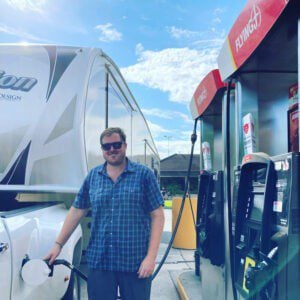
Trucker Path is a great app for finding truck stops and truck-friendly gas stations along your route. Download the app before heading out on your first road trip. If you have several choices of filling stations on your trip, look for Flying J gas stations.
All Flying J’s have separate pumps specifically designed for RVs. The RV lanes are easy to navigate and allow you to pay at the pump, unlike many truck stops.
RV Travel with Pets
One of the biggest perks of RV travel is the ability to bring your pets along on the journey. However, there are several important RV camping tips for pets to ensure your fur babies are safe and happy on the road.
Before taking your pet on an RV road trip, take them on a one hour test drive to see if they have any issues with car sickness. If they do get car sick, ask your vet for medication.
While your are on your road trip, the website Bring Fido is a great resource to find pet-friendly activities and restaurants. See our detailed articles for more RV camping tips for dogs and cats .
Greasing the Hitch Ball
Travel trailer and fifth wheel owners should apply a thin layer of grease over the entire ball before hitching up their RV. To avoid getting grease on your hands, use a paint brush to apply it.
To prevent grease from getting on other things and to protect the ball, cut an X into a tennis ball and place it over the hitch ball while parked.
Tire Checks for RV Travel
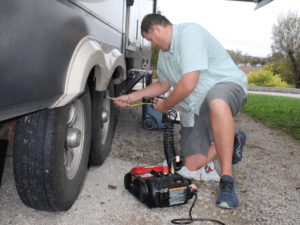
Always check tire pressure before hitting the road in your RV. The recommended tire pressure is noted on the sidewall of your tires. Traveling with an air compressor is ideal, so tire pressure can be adjusted before driving.
After removing or replacing a tire, the lug nuts must be torqued. Torque the lug nuts both when the new tire is put on and after driving 50 miles. To torque lug nuts, set your torque wrench to the proper foot pounds (check your owner’s manual).
Then, place the socket on the nut and turn the handle until it pops. Always torque in a star pattern, moving diagonally around the tire.
Changing Travel Trailer and Fifth Wheel Tires
While a roadside assistance plan is necessary to help you in case of significant damage, changing a flat or worn tire may be easier (and quicker) to take care of by yourself. The Trailer Aid Tandem Tire Changing Ramp makes this even easier for any trailer with at least two tires on each side.
To use, simply drive the other tire onto the ramp and it will raise the flat tire off the ground so you can change the tire without a jack. Always travel with a spare tire for your trailer, and pull as far off the road as possible before working on it.
Securing Cabinets for Travel
Child safety locks are an ingenious solution for securing RV cabinet doors during travel. When set into the lock position, the locks will latch and secure cabinet doors for travel.
However, they can also be unlocked during camping trips so they are not annoying when you are parked. Click here to see more of the best RV cabinet latches.
Know Your RV’s Height
Every RV owner should know the exact height of their RV in order to know exactly what height overpasses and bridges can be safely cleared. Do not trust the manufacturer’s published height, always measure it yourself.
To ensure accurate measurements, have trailers and fifth wheels hitched up before measuring. Also, make sure the RV is parked on level ground and measure on both sides just in case. Measure the RV from the ground to the highest point on the roof (usually the AC unit).
Plan your Route Carefully
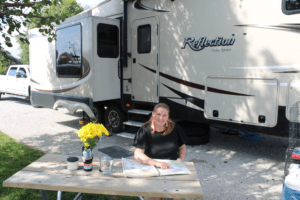
To select the best route for RV travel, use a road carrier’s atlas to identify routes appropriate for larger vehicles. Do not rely solely on navigation apps, which may take you down narrow or winding roads.
However, during travel days, leave the Google Maps app open to alert you to traffic jams or crashes. Kept the atlas on hand, so you can check alternate routes for low clearance bridges before re-routing.
Parking with Slide Outs
Many campgrounds have tight spots that force you to park close to electric poles or trees. For RVs with slide outs, it can be difficult to eyeball if you have enough room for the slide. To avoid parking too close, keep an item on hand that is the same width as your slide so you can easily measure if your slide will fit.
Personally, we use a level that happens to be the same width as our slide, but a simple piece of string also works great. Download our RV setup and departure checklists for more tips on making parking and departure days easy.
Manual Jack Overrides
Electronic jacks all have a manual override that can be used in case of electrical failure. All RV owners should reference their owner’s manual to learn how to access the manual override.
Before your first road trip, practice using the override to avoid having to learn at the same moment things are going wrong. Keep the tools required for the manual override (a ratchet with the proper-size drive extension) easily accessible near your jacks.
RV Camping Tips
The best part of RVing is hanging out at a beautiful campsite. Follow these RVing for beginners tips to troubleshoot and address common RV camping issues.
A simple problem with your RV can easily ruin a relaxing weekend getaway. Bookmark this page, to save these RVing for beginners tips in case you run into similar issues in the future.
Troubleshooting Hot Water Issues
A common issue RVers encounter is to find your cold water faucets working fine, but nothing comes out of the hot water faucet. The most likely issue is the check valve. To confirm that the check valve is the culprit, turn on your hot water bypass (check your owner’s manual for the location).
If water comes out of the hot water faucet while the bypass is turned on, the check valve is the issue. To fix it, simply purchase a new check valve and replace the old one. Check valves are typically located on the backside of RV water heaters.
Click here to see 10 more reasons your RV water heater is not working.
Fixing Clogged RV Showers
If your RV’s shower pan stops draining properly and starts filling with water, you may have a clog. Before addressing the clog, first double-check that your gray water tank is not full. If the gray tank is not full, then your shower drain is clogged. First, remove any obvious debris or hair from the drain.
Then, pour one cup of Dawn detergent down the shower drain. Boil water in your largest pot and pour the water down the shower drain. Repeat with two to three more pots of boiling water.
Let the detergent and water sit in the tank overnight (or at least several hours) before draining the gray tank. Always use a drain cover in your RV shower to prevent these clogs. Never use Drano or similar products in your RV.
Fixing Beeping RV Refrigerators
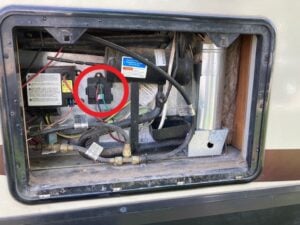
This tip is for Norcold RV refrigerators. If your fridge is beeping and the screen says “L1 Op,” your limit switch (a safety device) has been opened, and the fridge has been shut down. This is typically caused by water getting in the back of your refrigerator while washing the RV or during a heavy storm.
If you are not 100% sure that your exterior refrigerator panel has been exposed to water, then call a professional to ensure you do not have a more serious safety issue. If water is the issue, open the panel, dry everything inside and identify the limit switch (circled in the below picture).
Place a strong magnet just above the red light on the limit switch. After a few seconds, you should hear two clicks, the red light should turn off and the issue should be resolved!
Preventing Condensation
Condensation occurs when warm air inside the RV comes into contact with colder surfaces, such as windows, metal surfaces and walls. The condensation would stop if the air inside the RV matched the outdoor temperature.
When camping in cooler weather, managing condensation should be a priority. To prevent condensation you need to remove moisture from the air using one or more methods. Running a dehumidifier is one effective way to remove condensation.
DampRid buckets are another good option for removing condensation and moisture, especially when dry camping. If these items do not control the condensation effectively, reduce moisture by using a bathhouse for showers and cooking in the oven instead of using the stovetop.
Receiving Mail on the Road
When living in an RV or taking an extended road trip, you will likely need to receive mail or packages. If your campground does not accept mail or you are boondocking, there is an easy solution to receive mail anywhere in the United States.
The US Postal Service offers general delivery as a service for those who are without a permanent mailing address. To ship a package to yourself via general delivery just address the package to Your Name, General Delivery, City, State, Zip Code. See our full blog post, for more information on using general delivery and other mail options for RVers.
Snow Removal
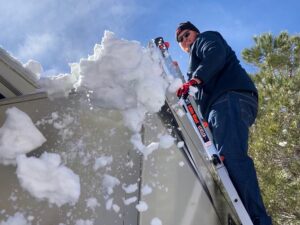
Camping in a winter wonderland is a unique experience, but RVers need to manage snow accumulation on their roof. Any more than a few inches of snow can cause roof damage.
If the snow melts during the day and re-freezes at night, the water expanding as it freezes can turn any small crack or leaks into major points of entry for water. If their is enough accumulation, the weight can also cause damage.
To remove the snow, use a ladder to avoid standing on an icy roof. Use a soft tool, such as a broom or plastic shovel, as sharp objects such as metal shovels may damage your roof. While snow should be removed, RVers should just wait for ice to melt as seams may be damaged while trying to break the ice.
Click here to see more essential tips for RV camping in winter.
Photograph Electric Meters
If you are staying at an RV park where electricity is metered (not included in the nightly rate), there are a few precautions to take to avoid being overcharged. On the day of your arrival, right before you plug in, take a picture of the meter and confirm the rate with the RV park’s office staff.
The average rate varies by state, but is typically between 10 to 20 cents per kWh. Take another picture before checking out and multiply the rate by your usage. Most RV parks are not trying to cheat anyone, but we have had a campground accidentally charge us for a previous guest’s usage. The pictures provided proof that we actually owed less money.
Test RV Toilet Paper
RV toilet paper is expensive and not as easy to find as regular brands. However, you need to confirm that regular toilet paper is appropriate for RV use. To find toilet paper that will work in an RV without causing clogs, look for thin, one-ply products.
Then, perform a simple test to confirm if it is RV safe. To test toilet paper for RV use, fill a jar with water and place a few sheets of the paper in the water. Shake the jar once or twice (to simulate the flush of an RV toilet). Let the jar site for one hour.
If the toilet paper fully dissolves, it is safe for use in your camper. If large, undissolved pieces remain, do not use the paper in your RV. See our pick for the best RV toilet paper , and once you’ve found the perfect RV toilet paper, check out our guide to the best RV toilets .
Changing Thermostat Scale
If your RV thermostat suddenly shows temperatures in the 20s, you’ve accidentally changed it to show Celsius readings. To change the setting back to Fahrenheit on Dometic units, press the “+” and “-” buttons at the same time.
For Airxcel thermostats, hold the long, rectangular button down until the unit changes back to Fahrenheit.
Click here for more Dometic RV thermostat troubleshooting ideas.
Accessing Clean Drinking Water
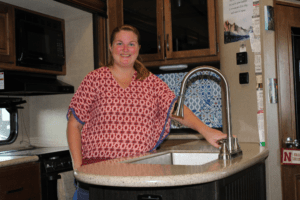
To avoid buying plastic water bottles while traveling, RVers should purchase a water filter. We recommend the Travel Berkey for clean drinking water as it is the most effective RV filtration system. Because it is a gravity-fed system, the Travel Berkey can also be used while boondocking. See our complete list of the best RV water filters for more options.
If you are staying at a campground where they do not recommend drinking the water, locate a water refill station instead of buying plastic bottles for drinking. Click here for more eco-friendly RV camping tips.
Resetting LCI Leveling Systems
Many modern RVs come with LCI electronic leveling systems, which make leveling your RV a breeze. However, many RV campers will encounter error messages with their leveling system.
If you frequently receive errors, you need to reset the system. The exact process for resetting varies by model, but instructions can be found in the LippertNOW app or by calling their amazing customer service team.
RV Safety Tips
Our final section in the ultimate guide to RVing for beginners is safety tips. These important rules will help keep your safe while camping and traveling.
Checking Spare Tires
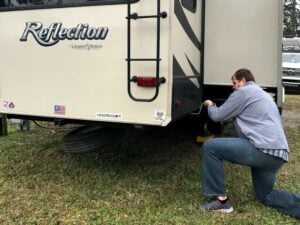
Too many RVers know from firsthand experience that tire blowouts are a common occurrence. Therefore, it is important to always carry an accessible spare tire on your rig. Before travel, locate your spare tire and practice getting it off the RV.
The tire should be a full-size trailer or RV tire and match your current tires. A “donut” tire is not safe for travel and will not get your RV very far in case of a blowout or flat. Also inspect your spare tires every 5000 miles to check for low pressure or cracking.
Transport Propane with Care
If your RV or travel trailer has portable, refillable propane tanks, the tanks need to be transported with care. Always leave the tanks upright, and never lay them on their side.
Secure the propane tanks with bungee cords or straps to ensure they stay still and upright. Always keep the tanks in a well ventilated space, such as a truck bed or a backseat with the windows down. Never put propane tanks in a hot vehicle or a trunk.
Locate Nearby Emergency Services
On the day you arrive at a new campground, use your phone to search for the closest emergency services. Locate the nearest hospital and emergency veterinarian and write down their name, phone number and address.
While you hope emergencies do not happen while camping, it is always better to be prepared. Also ask the campground office where the nearest storm shelter is located in the event of a tornado or other dangerous weather.
Finally, go ahead and locate the best local mobile RV service tech nearby in case your RV has any issues.
Test for Propane Leaks
If you smell a foul odor, and suspect a propane leak, there is an easy bubble test to confirm if a leak is present. To perform the bubble test, mix dish soap and water.
Then, apply the solution to the propane fittings, one at a time, and slowly open the tank. If bubbles appear after a few seconds, propane is leaking out. If a leak is found, turn off the propane immediately.
Replace the leaking connection or hire a professional to fix the issue. Propane leaks can be very dangerous. If you suspect a leak and are not 100% sure what to do, it is always best to call a professional.
Checking Safety Device Dates
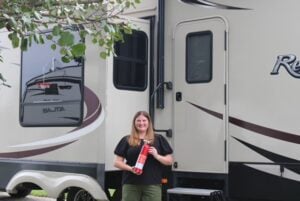
All RVs should have both a fire extinguisher and a gas detector. RVs come with one of two types of fire extinguishers, rechargeable and disposable. If your fire extinguisher has a dial with “recharge” and “overcharge” sections, it is rechargeable.
Rechargeable extinguishers should be serviced every six years. Check with the local fire department to see if they offer this service. Disposable fire extinguishers have a dial that reads either “full” or “empty.” The fire extinguisher needs to be replaced if the dial is pointing to empty.
RV gas detectors typically have a lifespan of about five years. If you have a used RV and do not know when the detector was installed, the production date is printed on the back. It is best to always have a replacement detector on hand, so a new one can be installed as soon as the old one malfunctions.
Don’t worry if you are a new RV owner and having trouble keeping all of these RVing for beginners tips straight. There is definitely a steep learning curve with RV ownership, but if you take your time both during travel and maintenance, you will be an RV pro before you know it.
Do you have other great RV camping tips to share? Leave them in the comments section below.
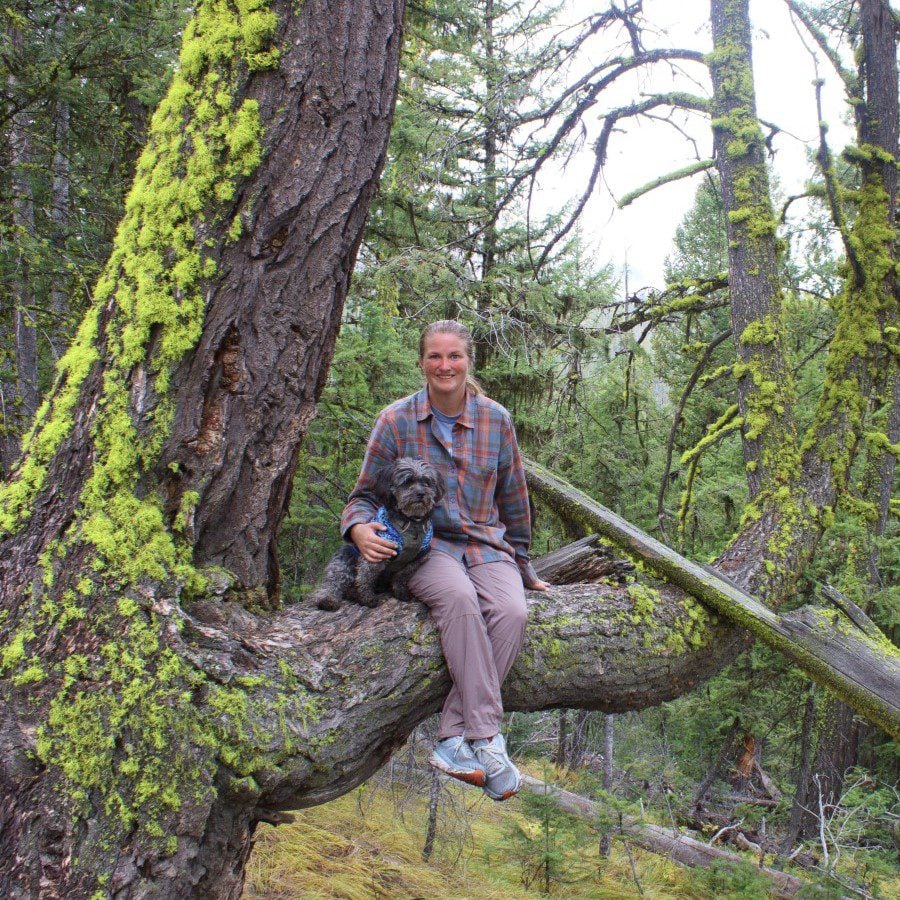
Christina Pate is a seasoned full-time RVer who, along with her husband Justin, has journeyed across the US, Canada, and Mexico. Drawing from her extensive travels, RV repairs and RV renovations, she founded Travels with Ted to guide and inspire fellow RV enthusiasts. Christina is also the co-author of The Owner’s Guide to RV Maintenance and the creator of My RV Log Book .
7 thoughts on “RVing for Beginners: 44 Important Tips, Tricks and Hacks”
Wow! What a great post! Thank you for sharing all of this helpful information ?
Wow wow wow! This is such a great guide with SO much information I’ll be referring back to this for sure! Thank you!
This is packed full of so much helpful info!! Thanks for sharing all your tips ?
Awesome reminders here! Some of them I hadn’t heard of before. I especially liked the idea of photographing the electric meter for when we get to a place we are going to stay longer term. Thanks so much for sharing!
This is GREAT information!! It will make a good quick reference blog to save! Thank You!!
Wow! What a wealth of information!
This is a really great post! All those little things you need to know that will save you in the long run. Thanks so much for sharing!
Comments are closed.


31 RV Camping Tips for Beginners (Complete Guide)

There is a lot to learn if you’re just starting the RV lifestyle.
You want your first RV camping trip to be fun and memorable. So we’ve collected the best RV camping tips for beginners to help new RVers get started based on our experience.
Are you ready to have a great camping trip? Then let’s go!
Table of Contents
1. You can learn as you go. Ask for help.
2. go slow and take your time. , 3. communication and teamwork are essential. , 4. consider renting an rv., 5. when purchasing an rv, do your homework., 6. verify your tow vehicle specifications and equipment., 7. consider a practice rv trip in your driveway. , 8. make reservations far in advance. , 9. use an app or website to find a great campground. , 10. learn to operate the systems in your rv. , 11. understand campground utility hookups. , 12. take a practice drive. or several. , 13. practice backing up your travel trailer or 5th wheel. , 14. consider having a roadside assistance plan. , 15. use checklists. , 16. make sure you have essential rv accessories. , 17. travel during off-peak hours. , 18. know the proper pressure for your tires., 19. know the height of your rv. , 20. while packing a travel trailer, keep weight distributed properly. , 21. reduce weight by emptying your tanks. , 22. tow with safety in mind. , 23. never travel tired. , 24. know rv campground information and rules when you arrive. , 25. check that utility hookups reach your rv connections before you park. , 26. level your rv at your campsite. , 27. leave your black tank valve closed. , 28. keep humidity under control. , 29. prepare for bad weather. , 30. turn off your water if you leave for the day. , 31. take lots of pictures and videos of your camping trip , frequently asked questions, rv beginner mindset and expectations .
Approach this new experience with an open mind – every RV trip offers opportunities to learn something new and have fun along the way. One of the most important things to keep in mind is don’t be afraid to get out there and ask questions. Fellow campers will likely be more than happy to share RV camping tips or offer up their own experiences with RV life.

Go slow, take your time, and don’t rush yourself. Mistakes happen when you’re in a hurry. Setting up carefully at your RV campsite will ensure your trip goes off without a hitch.
Slowing down while descending hills can help you maintain control and improve safety. And it’s also worth driving at a slower speed to save fuel.
RV camping can seem intimidating, from setting up camp to backing up and maneuvering through tight spaces. Give out jobs and get everyone involved. Check with each other about upcoming plans and what’s supposed to happen.

Expect the unexpected. Have a plan B. The weather, road closures, and delays due to accidents can force a change in plans.
Pausing and taking the time to communicate can make a huge difference when dealing with unexpected situations. Concentrate on solving the problem in front of you and wait to talk about prevention or better choices later. Let the family know that the first few trips will be a learning process.
Planning your first camping trip
If you don’t own an RV yet, consider renting one for your first RV trip. This first step will allow you to test out RV camping without having to invest in a unit of your own.
Renting different types of RVs is a great way to give you a feel for the different styles of RV camping. You can try different kinds of self-contained motorized RVs, from camper vans to bus-like motorhomes. You could try a travel trailer if you already have a suitable tow vehicle.
Renting an RV can also help you determine what size and features are important for your needs before taking the plunge and becoming an RV owner. RVShare and Outdoorsy are two great options.
Purchasing a new RV is a huge investment. You want to buy the best RV that you won’t have to trade in too soon because it doesn’t meet your needs.
- Research the various available types (e.g., motorhome, travel trailer, fifth wheel, etc.) and decide on the one that fits your camping style. If you aren’t sure, renting an RV and taking it camping is the best way to find out.
- Determine your budget. And take into account costs associated with owning an RV, including insurance, licensing, registration, storage (if applicable), fuel, and maintenance.
- Walk through RVs at RV shows or visit a dealership to get a feel for the different floorplans of RVs and their features. Bring the whole family and get everyone inside, so you get a feel for how roomy or how cramped the RV is.
- You can watch videos online of walkthroughs of various RVs. Just be aware that you won’t get a true sense of how large or small the interior is until you physically walk through it.
- Visit a campground and ask other RV owners for advice about what they consider important or things to watch for when choosing an RV.
- Test drive several types of motorhomes to become familiar with how they handle and how comfortable they feel on the road.
When towing travel trailers or fifth wheel trailers, ensure your truck has adequate towing capacity and payload. It should have a tow package with a trailer brake controller.

When towing travel trailers, invest in a quality weight distribution hitch with sway control to distribute the load properly across your tow vehicle’s axles and reduce trailer sway.
For towing fifth wheel trailers, decide which hitch mounting system you will use, depending on how your truck is equipped.
You can avoid crowded campgrounds on your first trip by camping in your driveway. This lets you practice with less pressure. You can always pop back home to get any missing items or go to the local store.
Camping in your driveway means there will be good wifi or cell reception for when you need to look things up. It’s common to lose service at RV campgrounds.

If you decide on camping in a campground for the first time, reserve a site with full hookups. This makes camping much easier because you won’t need to learn to manage water conservation, sewer holding capacity, and electricity consumption. (See tip #12 about understanding campground utilities.)
Plan ahead. Camping is growing in popularity, so getting an RV campsite on short notice can be almost impossible. One of the best RV campground tips is to make reservations far in advance. You’ll be able to stay where you want and not have to spend hours searching for an available RV campsite.
Campendium and AllStays are two popular options offering campground listings across the United States. You can use interactive maps to find RV campgrounds near your desired destination.

Pictures and reviews of campgrounds can help you find the perfect RV campsite. Reading about other people’s experiences enables you to make an informed decision. Campground amenities are listed, as well as the types of hookups that are available.
It’s also worth checking out RV park chains, such as KOA or state park websites, to see if they have any camping spots near where you intend to travel.
You can use Google Maps or Roadtrippers.com to plan the best route to your RV campground.

RV Essentials
Become familiar with the systems in your RV. Know how to get water, hook up electrical power , and dump your holding tanks . Flushing an RV toilet is slightly different than one in a house. Learn where the circuit breakers and fuses are and how to reset or replace them .

- Full hookups – The RV campsite has all the utilities you need; water, sewer, and electricity.
- Partial hookups – Usually have water and electricity, with no sewer. You will need to dump your tanks occasionally and when you leave.
- Electric only – No water or sewer is provided, which means you will fill your fresh water tank when you start and will have to dump your tanks occasionally and when you leave.
- No hookups – Commonly called Dry Camping or Boondocking, you depend entirely on the self-contained capabilities of your RV, possibly with the aid of solar panels or a gas generator.
Before starting your RV road trip, it’s a good idea to get comfortable with taking turns, braking distance, and parking in tighter spots that are common at campgrounds or rest stops.
Find an area free from distractions and traffic so you can concentrate on getting used to how the vehicle handles. Start by driving slowly in empty parking lots or quiet residential streets until you feel comfortable. Then start practicing more difficult maneuvers like backing up or slowly taking sharp turns. This will familiarize you with the length and size of the vehicle, giving you more confidence while on the road.

You can reserve a pull-through camping site to avoid having to back into your campsite. However, there may be situations where you will need to back up, such as correcting for a tight turn or realigning your trailer at the campsite. The more you practice, the less stressful backing up will become.
If a breakdown occurs in an unfamiliar area or on the highway, it can be difficult and dangerous to make repairs without assistance. A roadside assistance plan can provide access to RV mobile mechanics who can help with repairs or tire blowouts.
A good roadside assistance plan can provide towing, lockout service, tire service, battery service, fuel service, winching, and technical assistance. Read about what to look for in a roadside assistance plan.
Most rentals come with a roadside assistance plan, so remember to get emergency contact information when you pick up your RV.
Your RV checklist should be your best friend for any camping trip, regardless of your experience. Take the guesswork out of setting up your RV at the campsite or when packing up to ensure nothing is left behind.
Checklists are an essential part of ensuring everything goes smoothly during your journey. It eliminates the stress associated with worrying about possibly missing something before leaving or having to turn around mid-trip.
You can find arrival and departure checklists here from Campendium .
And it’s always helpful to have an RV Packing List .
There are a few essential accessories you need to get set up at an RV Park.
- Freshwater hose (specifically rated for drinking)
- Water pressure regulator
You may also need an electrical cable, although these usually come with your RV.

A few accessories come highly recommended and are almost considered essential, such as an electrical surge protector. And you need to remember to include kitchen cookware and linens for the beds.
In this article on the best accessories for RV Camping , you will find:
- Essential RV Accessories
- RV Kitchen Essentials
- Basic RV tool kit
- Additional RV Accessories
Avoid driving during rush hour. Leave after 9:00 AM to skip the morning rush hour. Stop and have lunch during the noon rush. And plan to arrive at your destination by 4:00 PM to avoid the evening rush hour. This strategy gives you about 6 hours of travel time per day, which is a reasonable amount of time on the road to avoid fatigue. (See tip #23)

Learn tire safety and how to avoid blowouts by maintaining correct tire pressure. Check each of your tires before departure. You can fill up at a truck stop or tire center. Gas stations often do not have adequate pressure to fill travel trailer, fifth wheel, or large motorhome tires.
Put the height on a note and have it visible on your dash for when you encounter low bridges. It is also helpful to program the height of your RV into your RV GPS for route planning.

Load heavier items toward the front of the trailer. A good rule of thumb for the distribution of cargo:
- 60% in front of the trailer axles
- 40% to the rear of the trailer axles.
The goal is for the tongue weight to be between 10% and 15% of the trailer’s total weight when fully loaded. This improves towabilty and reduces the chance of dangerous trailer sway.
Don’t travel with full tanks. You can keep a few gallons in your freshwater tank for flushing the toilet during your journey. Most RVs are not designed to travel with full holding tanks. Check your owner’s manual.
The exception is when no fresh water hookup is available at your campsite. There will be a freshwater fill station at the entrance of most RV Parks, where you can fill your water tank. Traveling the short distance from the fill station to your campsite with a full tank is OK. You usually don’t exceed five or ten mph while traveling through the campground.
Likewise, if you don’t have a sewer connection at your campsite, you will want to empty your tanks before heading out onto the open road. You can make the short trip from your campsite to the dump station, which will be near the RV Park exit.
- Extend tow mirrors
- Take extra care with lane changes
- Signal in advance and change lanes slowly
- Learn to use your trailer brake controller
- Use Tow/Haul mode – the engine brake helps with hill descents.
Plan for plenty of time to travel to leave room for any travel delays. This leaves enough time to spare to avoid pushing yourself to drive tired.

A driver’s reaction times, awareness of hazards, and ability to sustain attention are reduced when the driver is tired. An accident is three times more likely if driving fatigued. Reference https://www.nsc.org/road/safety-topics/fatigued-driver
At your Campsite
When you check in to the campground, the office staff can direct you to your campsite. And make sure you read the handout. It will have office hours and contact information.
One of the most important things to know for a new RVer is how to contact someone in case of a problem.
Find the bathhouse and dumpster locations and the location of the dump station if you need it.

Most campsites have the utilities conventionally located together to make it easy to hook everything up. Sometimes that’s not the case.
When you pull into your campsite before you shut down and begin setting up, briefly get out and check to make sure all your utility connections are within reach of the RV.

Many RVs have an automatic leveling system that works at the touch of a button. For the RVs that don’t, or if your travel trailer uses stabilizing jacks (which aren’t used for leveling), you need to manually level the trailer.
A properly level RV will allow the absorption refrigerator to operate correctly. When cooking, if the RV is not level, the oil in the pans will pool to one side. The shower won’t drain if it’s leaning to one side. And the slides are designed to work when everything is level.
When leveling, set the leveling blocks on the low side of the trailer. Then put the wheel chocks on the opposite side.
If you have a sewer connection at your campsite, connect your hose, but leave the black tank valve closed. Leaving the black tank valve open allows fluids to drain, and solids will accumulate at the bottom of the tank. This situation, often called a poo pyramid, can be challenging to correct.
Closing the black tank valve will also prevent sewer gasses from venting back into the RV when you flush the toilet.
You can also keep your gray tank valve closed, which allows you to flush the sewer hose after emptying the black tank. First, open your black tank valve and let it drain. Then open your gray tank valve to flush the hose clean.
Showering, cooking, and even breathing while you sleep can increase moisture inside your RV. If not kept under control, this can lead to the small space becoming damp.

Opening a window slightly to allow air to circulate can make a big difference. Open roof vents and run the exhaust fans when cooking or taking a shower.
Cooking with propane causes a lot of moisture; use the vent fan over the stove to exhaust damp air and cooking odors outside.
Bad weather happens and can be unexpected.
High winds can damage your awning. Retract it before you leave for the day and at night. Some awnings have an automatic retraction feature, but it’s still best to manually retract it just in case.

Rain can enter through the roof vents of your RV if they are left open during a storm. Unless you have vent covers, keep the vents closed when away or at night in case it rains.
Sometimes a mishap or malfunction can result in water from your water system leaking into your RV. If this happens while you are away, massive amounts of water can accumulate in your RV and cause extensive damage. That would be bad.

To prevent leaks from flooding your RV, turn off your water supply at the utility hookup faucet or turn off your water pump if you are dry camping.
Taking pictures while camping is a vital part of the experience – it’s a way to capture the moments, whether big or small, that will bring back memories for years to come.

Whether taking a picture of the beautiful sunset or capturing a candid moment with family and friends around the campfire, having photos to share can be particularly meaningful. Snapshots taken from your RV travels will bring you back to those places time and time again.
And keep a journal. Take notes on what went well and what can be improved for next time.
The consensus among experienced RVers is that you don’t need to use RV-specific toilet paper as long as you use toilet paper that is “septic safe.” Common sense applies here. Of course you shouldn’t stuff wads of it down the toilet. Use plenty of water when flushing. And remember to use RV black tank treatment regularly.
Put out your campfire and make sure it’s out. Before leaving a campsite, make sure all fires are completely extinguished with no hot coals left behind that may reignite later. This means drowning the campfire with water and covering it with soil .
Keep it clean. Leave the campsite in better condition than you found it. Packing out what you bring in reduces littering and waste accumulation that can affect surrounding ecosystems. Cleaning up your campsite sets an example for other campers that helps foster an atmosphere of respect for nature so everyone can continue to have access to the great outdoors.
Opinions vary from person to person, but most RVers agree that limiting drive time to 6 hours per day, or 300 miles (800km), works best. This assumes an average travel pace of 50 miles per hour, which includes travel breaks and possible delays due to construction or traffic. Full-timers generally drive fewer hours because their travel pace is more relaxed. On the other hand, you can extend your travel time and distance if you have multiple drivers and can alternate driving duties.
Most motorhomes will last 20 years or 200,000 miles with regular care and maintenance. Some rare examples may last up to 30 years. In general, travel trailers and fifth wheel trailers last about 10 years. With good maintenance, they can last up to 12 to 15 years. And there are exceptions, such as Airstreams and some fiberglass trailers that can last even longer.
Some RV parks may only accept your reservation if your RV is less than 10 years old. The idea is that older RVs are too weathered and worn and can affect the “image” of the campground. Older RVs might have safety issues related to old electrical and propane systems. As long as your RV is well maintained with a nice clean exterior, it should be possible to request an exception.
Stephen Crump
Stephen Crump is a software engineer and technical writer who loves to travel and camp. He also enjoys biking, grilling, and providing helpful tips about RV camping. Read more about Stephen here .

Travel Trailer Tips for Beginners
Last Updated on February 22, 2024 by Grant
Owning a travel trailer has been one of the best experiences of our lives. We bought ours back in 2016 and have taken it out each summer on some pretty epic road trips as well as shorter trips throughout the year. That said, owning a travel trailer definitely has a learning curve. Now, we know what we’re doing and are happy to share our travel trailer tips with you.
It has taken us quite a bit of trial and error to figure out how to make the best of the camper. To help you avoid some of the headaches we endured, we’re bringing you these travel trailer tips for beginners. In this guide, you’ll find everything you need to know about buying and owning a travel trailer.
We hope this post helps you smooth out the problems when you first take out your travel trailer.
(Disclaimer: When we link to places where you can buy our stuff or places we stayed, we are using special codes that earn us commissions on the sales at no additional cost to you. Please see our Review Policy for more information.)
Before You Buy a Travel Trailer
My number one tip before buying a travel trailer is to make sure your vehicle can tow it. Check with your vehicle’s manufacturer to determine the towing capacity of your vehicle. Then go through the step using this app to see your real tow capacity. Just because your vehicle says it can tow something doesn’t mean it actually can do it safely.
Once you have determined how much you can safely tow, you need to prep your vehicle to tow.
For all but the lightest trailers, you are going to want a Class IV hitch at the very least. If the camper weighs more than 3,000 pounds, you will need to have a trailer brake controller. If you are towing a camper over 5,000 pounds, you are gonna need a weight-distributing hitch. This keeps the trailer and the back end of the truck level. Most also have some anti-sway capability as well.
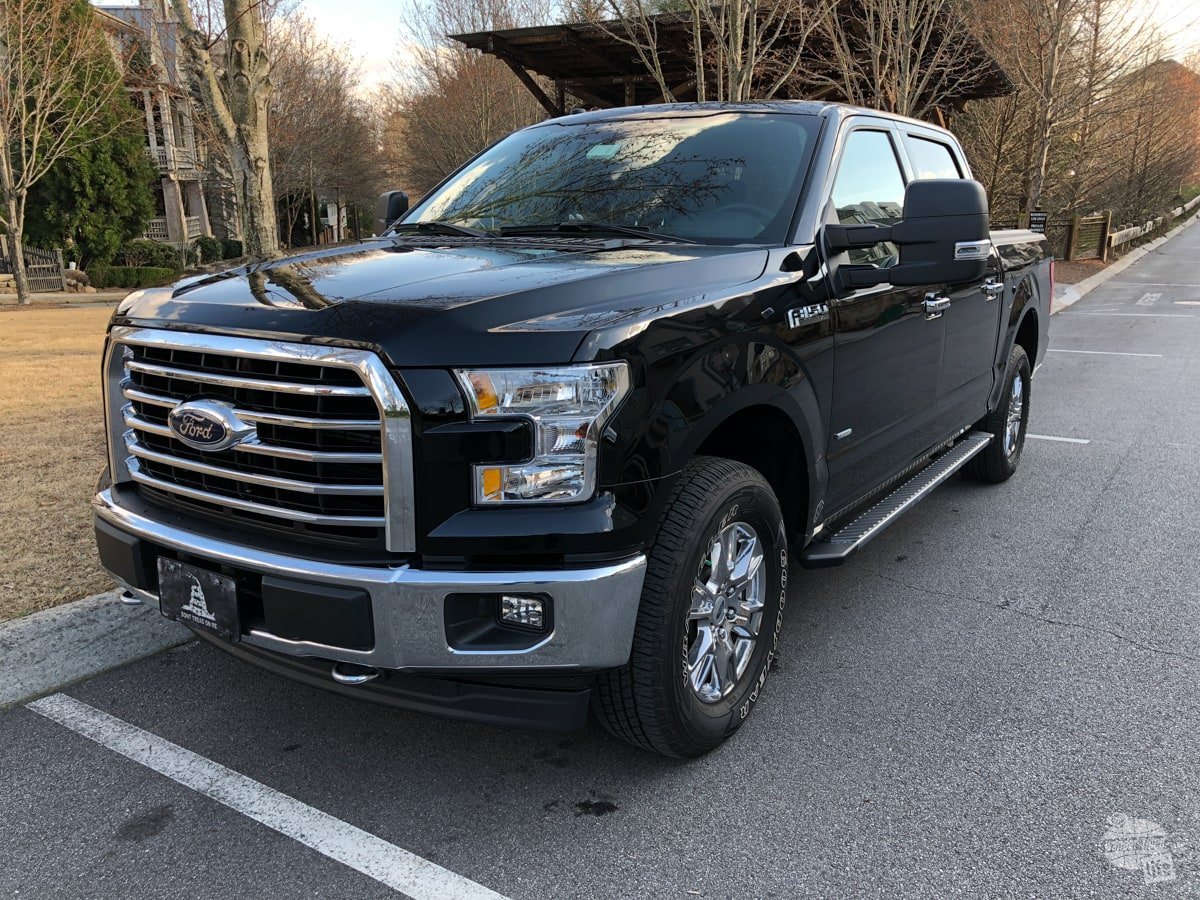
We have a Husky Centerline TS and it has worked perfectly for us. The dealer tossed the hitch in with the price of the camper and installed it for us.
Lastly, you are gonna want tow mirrors. There are mirrors you can clamp on and mirrors that you can install. Max tow packages for most trucks often come with tow mirrors. We bought Trail Ridge Tow Mirrors for our F-150 . They were easy to install ourselves and are quite happy with them.
Now, your vehicle is ready to tow a trailer!
Read more about the vehicle we tow with, a 2017 F-150.
Buying a Travel Trailer
When we were looking for our first travel trailer, one of the best pieces of advice we found on the Internet: Buy your second camper first. We agree with that advice.
RVs do not appreciate in value like a house. They lose value like a car. So, if you are buying a “starter camper” to see if you like the RV life, I recommend renting an RV. Take it out for the weekend instead of buying. It will save you a LOT of money.
Read more about renting a camper through Outdoorsy here.
Don’t let the dealer try to convince you to buy more than you can safely tow. That’s really important. You do not want to be barely able to pull your travel trailer through the Mojave Desert or over a tall pass in the Rockies.
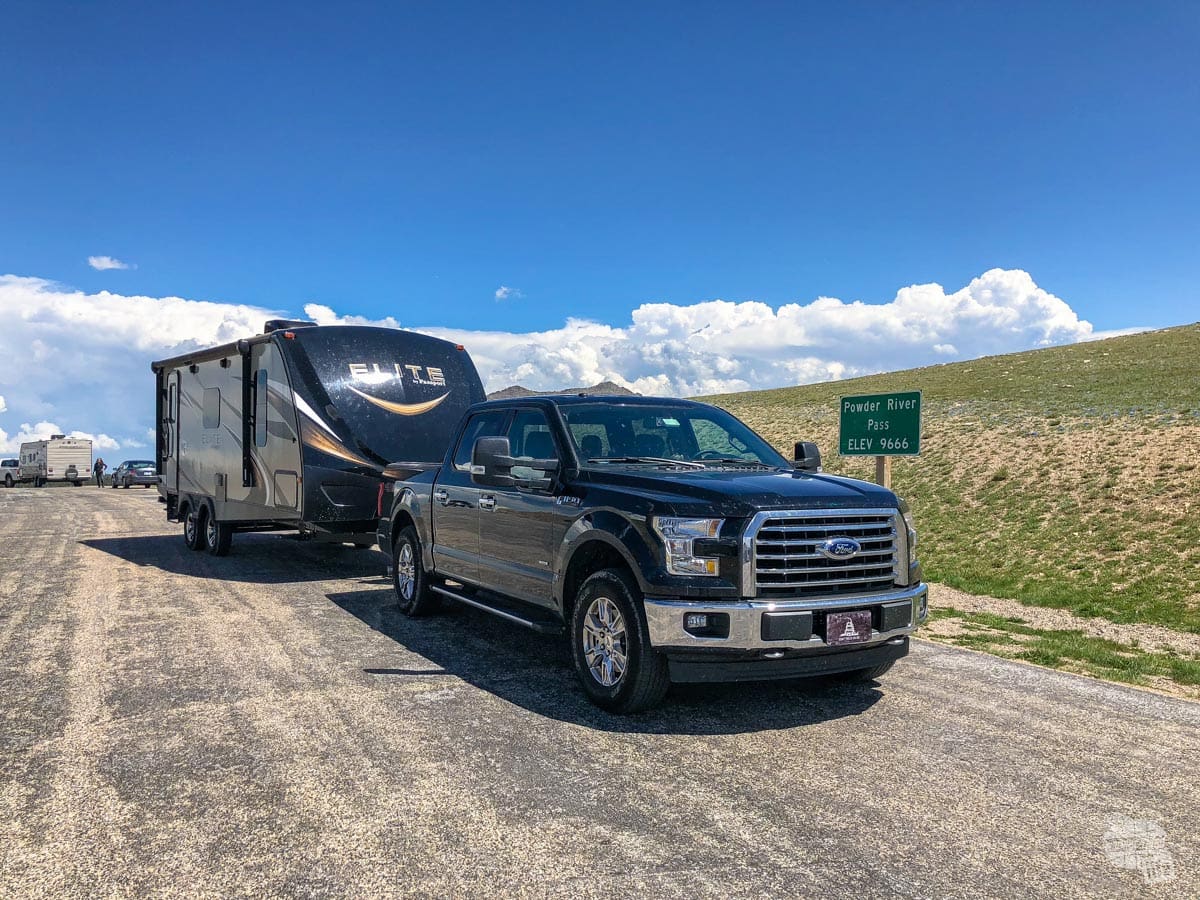
Think about what you want in your trailer and try out a bunch of them. An RV show is a great place to check out a bunch of campers. Pick a floor plan you like then see which dealer has the best deal.
Read How to Get the Most Out of an RV Show here.
We wanted a wrap-around queen bed and a couch instead of a dinette. In hindsight, we wish we got both a couch and a dinette. Then we could use the dinette as a desk for working on the blog. We make it work, though. And that is certainly not enough of a problem to buy a new camper!
Another important feature for us was having plenty of storage space. We have closet space by the bed and by the front door/bathroom. And plenty of cabinets in the kitchen. There is also a large pass-through for outdoor items. That said, we are struggling to make our new chairs fit with everything else we have in the pass-through.
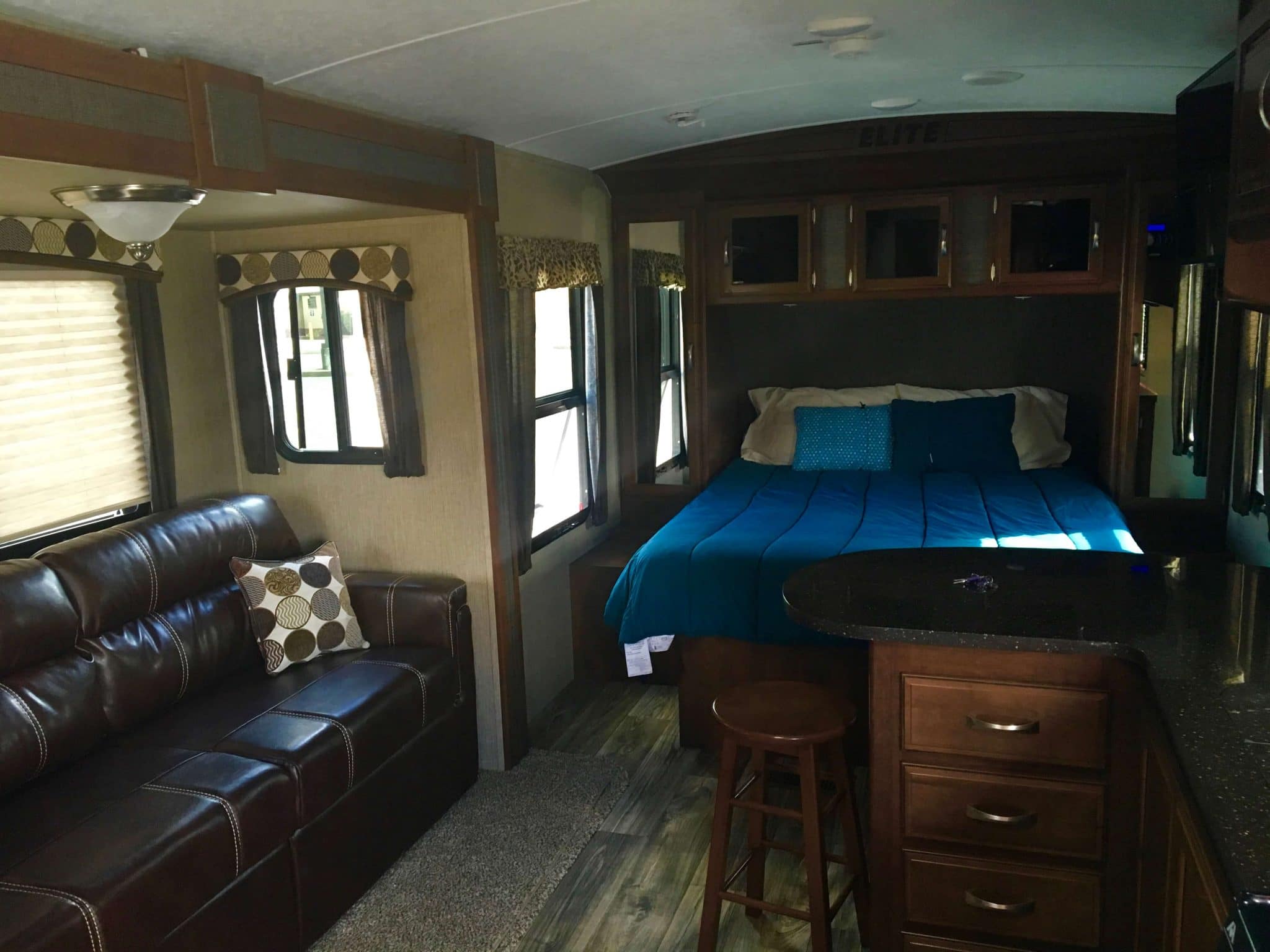
Make sure you have the dealer walk you through the camper. Have them show you where everything is. You need to know where to find cut-off valves, the fuse box and the reset buttons on various appliances.
Read about our experience of buying our first travel trailer.
Add-ons to Have the Dealer Install
Once you have found and priced the perfect travel trailer, there are few things we recommend having the dealer install right off the bat. For some of these, you might be able to get the dealer to toss them in with the purchase price. Others, you are gonna need to budget for.
First and foremost, have flying insect screens installed on all of your exhaust vents! Dirt daubers like to make a home in those vents. Their nests can ruin a fridge, a furnace or a hot water heater. If you’re fairly handy, you could probably do this yourself.
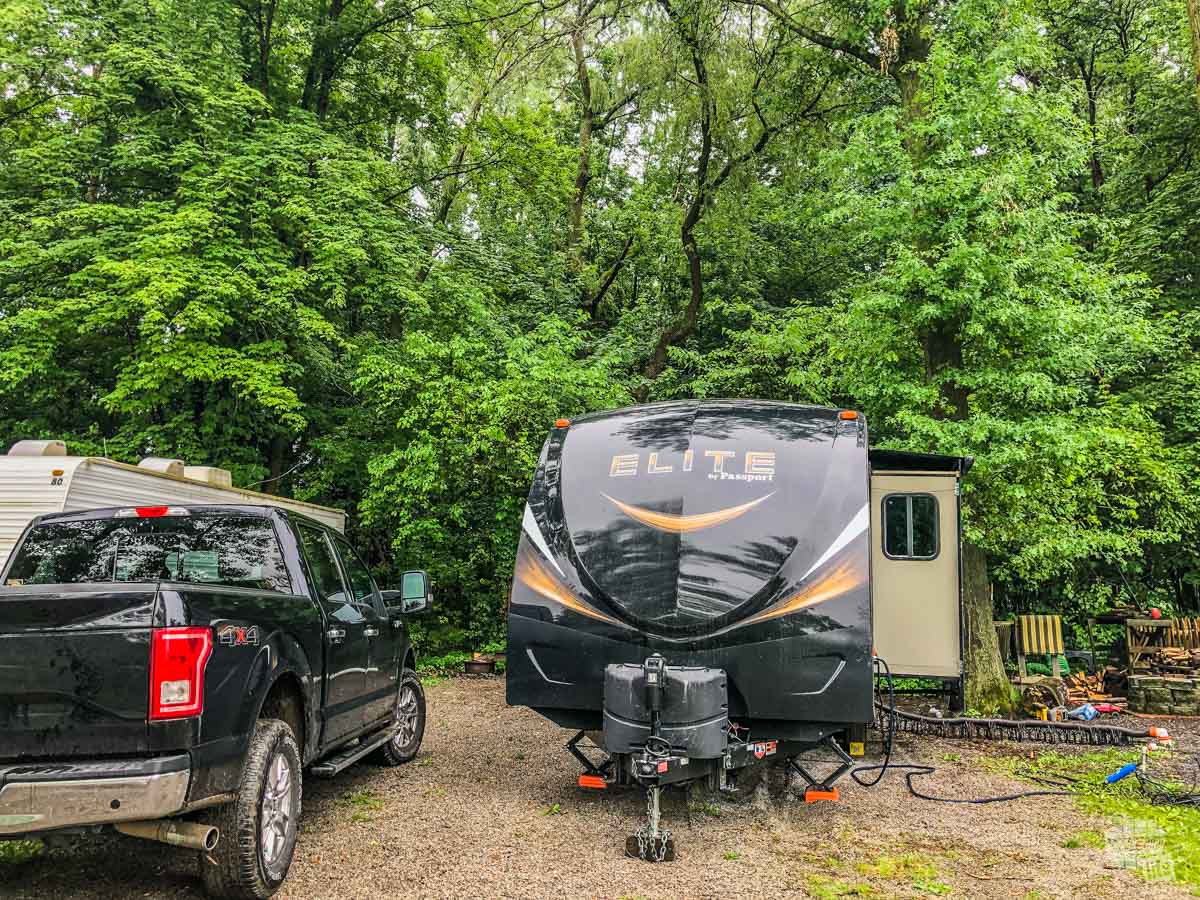
Second, get slide toppers if the trailer does not already come with them. These will keep debris from getting on top of your slide. The rubber gasket around the slide keeps debris out of your camper when you retract the slide. The slide topper will keep the debris from getting there in the first place. You will avoid having to clean off the top of the slide when you strike camp.
Third, get a battery disconnect. The carbon monoxide detector is always on and always draining the battery when we store the camper. A simple battery disconnect will help preserve the life of your battery if you cannot leave the vehicle constantly plugged in.
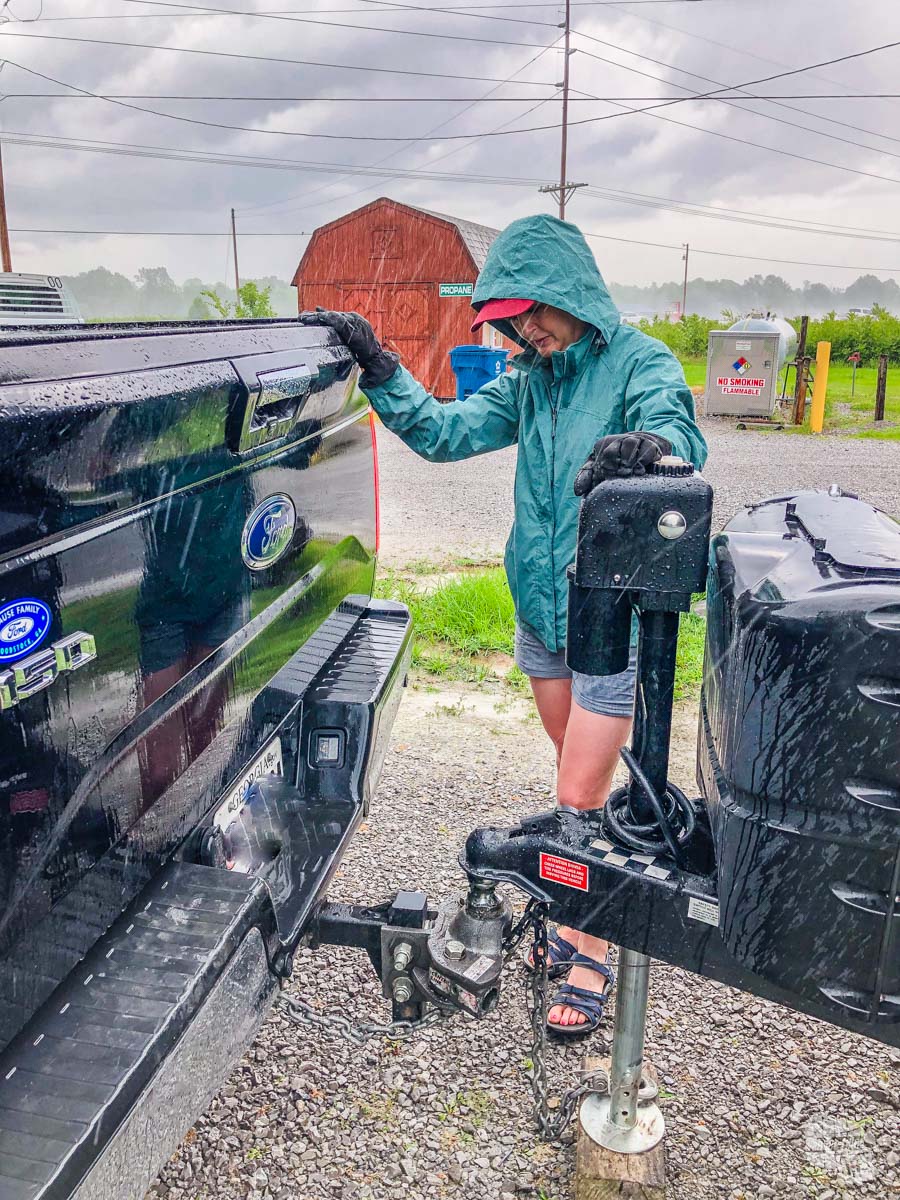
Fourth, get an electric hitch jack. I can’t tell you how much time and effort this will save you from having manually lower and raise the jack of the trailer.
I also recommend getting vent covers for the pop-up vents. We have a couple of Max Air vent covers that allow us to open the vents even when it is raining. This is really nice for venting out your bathroom after showers.
If being able to watch satellite TV is important to you, have a dish mounted on the roof. Both Dish and DirectTV offer packages aimed at RVs. I would certainly check the fine print in terms of contracts and requirements.
Lastly, if you camp away from connections (called boondocking) often, we recommend you talk to your dealer about having alternate power sources, like solar panels or a generator, integrated into your trailer from the get-go.
Outfitting Your New Travel Trailer
The reality is you are gonna need a lot of stuff for your camper. You’ll need equipment for getting everything hooked up and operational along with all the comforts of home – linens, cookware, dishes. We have written a top-ranked comprehensive guide on outfitting your travel trailer inside and out.
Read more about outfitting your camper here.
Seriously, we have you covered when it comes to outfitting your travel trailer.
Before You Take Your Travel Trailer on the Road for the First Time
As you load everything into the travel trailer, make sure the majority of your gear is loaded toward the front of the camper. If you push the majority of the weight (60%) forward of the axles, you will reduce sway considerably.
Check out this video from the folks at UHaul…
Once you load everything in, it’s time to check the wheels and tires on the trailer. Take a lug wrench and tighten down all the lug nuts. Then check the air pressure on all of the tires, including the spare. It does you no good to have a flat spare.
If you installed a battery disconnect, reconnect the battery at this point.
Then connect the hitch and the trailer. This process is different depending on the weight-distributing hitch you have. Make sure you lube everything that needs lube, including the ball.
Pro tip: If your battery is dead and you need to power the jack, once you connect the cable to the truck, you should get enough power to operate the jack. If the power is not immediately flowing, depress the slider on the trailer brake controller to send power to the trailer.
Make sure you hook in the chains, crossing in an “x” underneath the hitch so that if it comes loose, the chains will catch it.
Once you connect everything, you can remove the chocks and you are ready to perform one last walk-around.
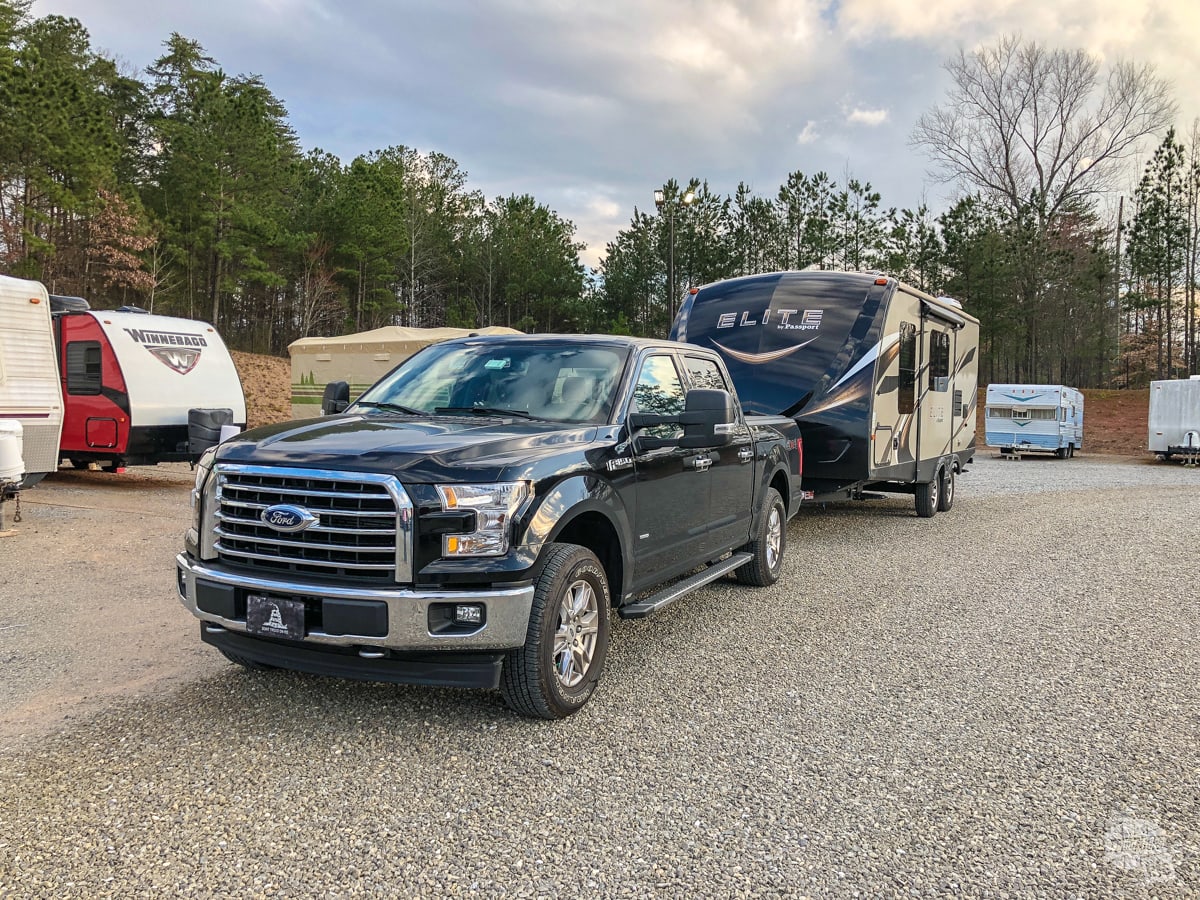
In this walk-around, make sure you close and lock all of the compartments. Be sure to double-check the windows are closed and the TV antenna is down. Then check the brake lights on the trailer to make sure they are functioning.
Lastly, make sure you extend the tow mirrors and you can see down the length of the trailer in the mirrors.
You are now ready to hit the road.
Towing a Travel Trailer
The first thing to know about towing a travel trailer is you can’t go as fast as you would otherwise. Most trailer tires are rated for 65 MPH.
A higher driving speed significantly reduces your braking speed and stopping distance. That means it is a lot easier for you to rear-end someone if they stop suddenly. Additionally, excess speed leads to increased sway which can easily topple your vehicle.
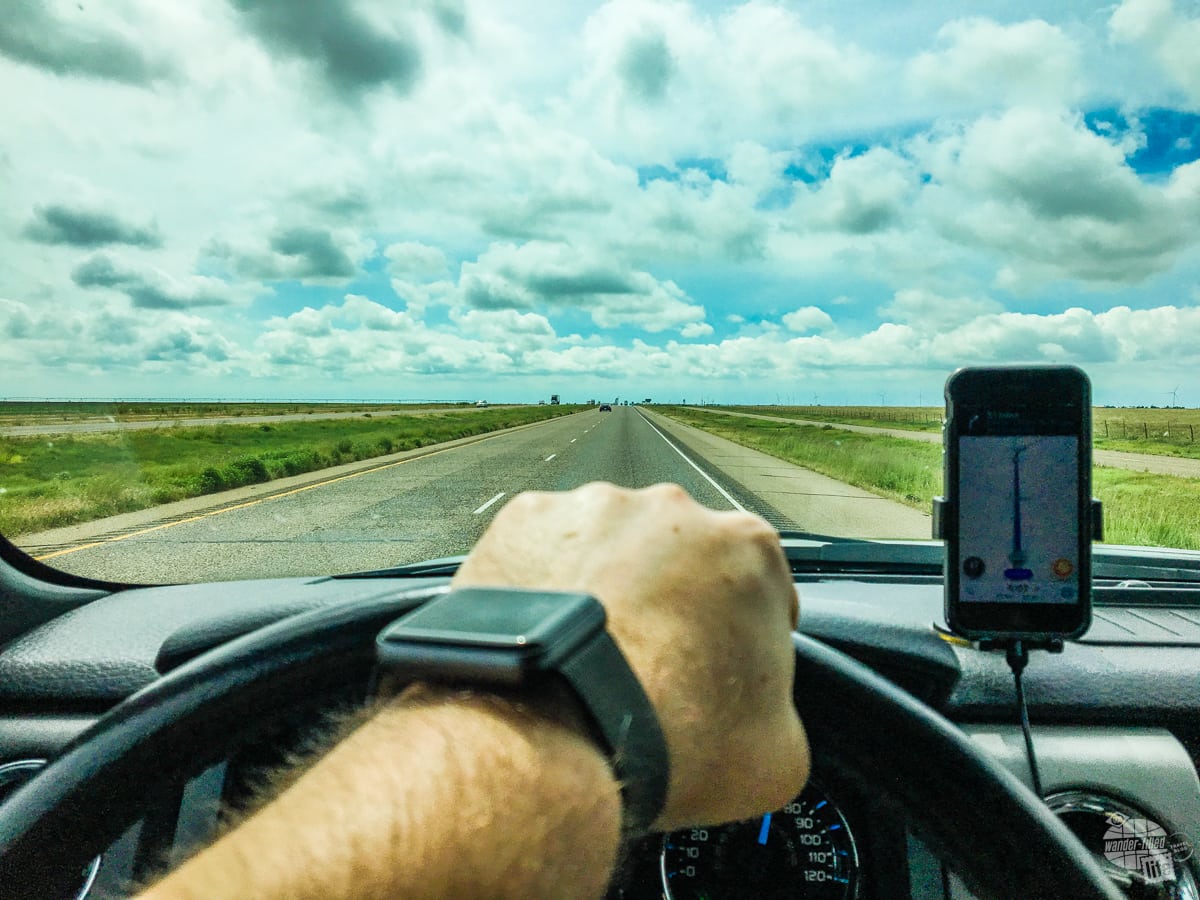
Additionally, it takes some time to get used to the additional space the truck and trailer combo take up on the road. Even towing a relatively small trailer poses difficulties in heavy traffic.
This also holds true for finding gas and fast food on the road. We highly suggest researching gas stations and restaurants to make sure they have RV parking or at least plenty of room. We use the satellite view in Google Maps or Apple Maps to check it out in advance.
Backing up a travel trailer is tough and there is no way to get good at it other than practice. Honestly, our worst arguments come from backing up our camper. I have gotten better at it but I always struggle a bit when we first head out.
Our F-150 has the Pro Trailer Back-Up Assist, which I love… when it works. When it doesn’t, mostly due to the sensor losing sight of the sticker, it tends to cut off when I need it most: on a tight turn.
Setting Up at a Campsite
We suggest camping somewhere with a Walmart or RV store nearby for your first few outings. You will find you need things you didn’t think of. Camping near a store means you can buy items you need easily, which will make your first trip that much better.
Read about the RV essentials you need before you hit the road here.
As you settle your trailer into the campsite, be sure to take note of where the connections are. On our second trip, we managed to set up too far away from the water connection and had to buy a second water hose.
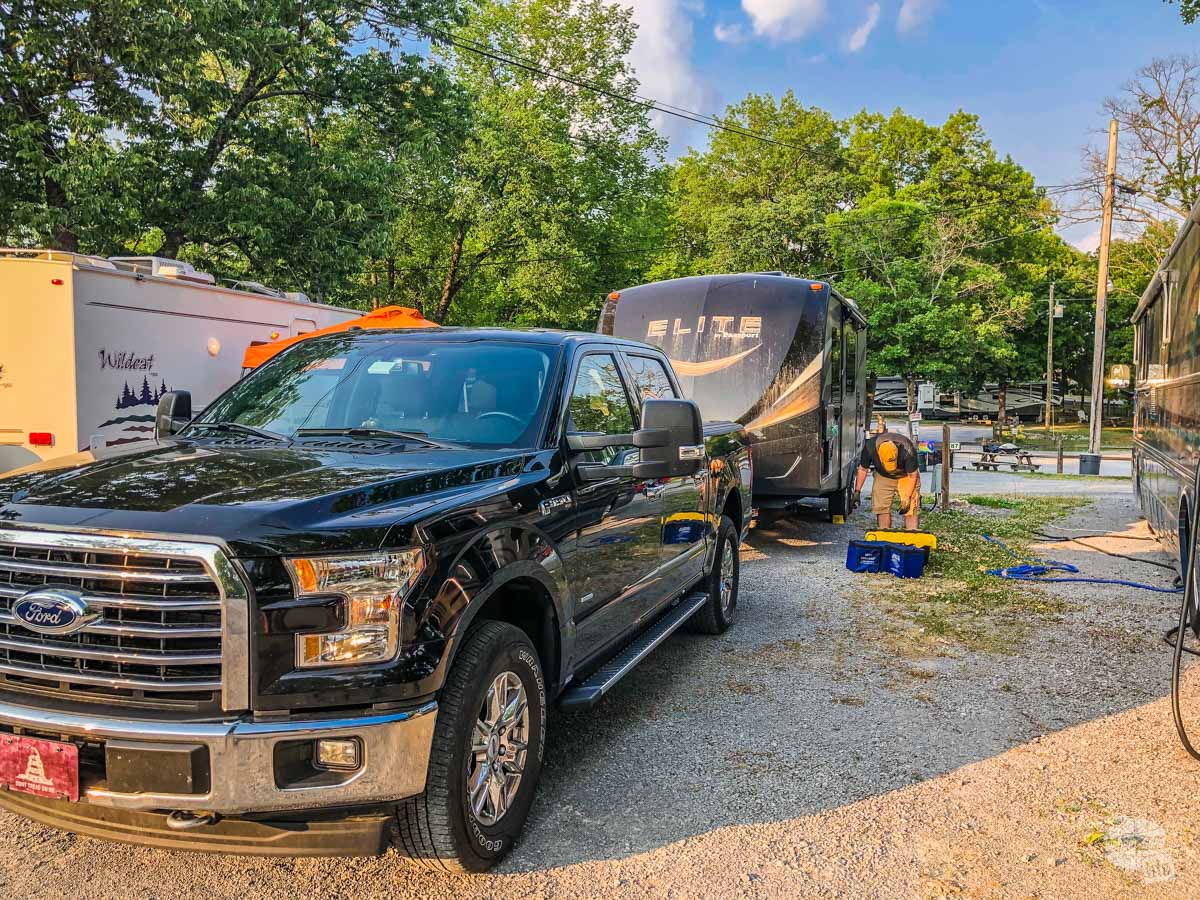
Pro tip: We store all of the gear we need for setting up in the pass-through on the left side of the trailer. This allows easy access for the driver to everything needed to get the travel trailer set up.
Take a large construction-style level with you for the first trip. As you get settled in and level the trailer, then apply the bubble levels we recommend in our outfitting guide to the outside of the camper to make leveling it easier in the future.
Use levelers to make sure your trailer is level. Most fridges will not operate if the camper is not level. Make sure you put chocks down to keep the trailer from moving before you disconnect from the truck.
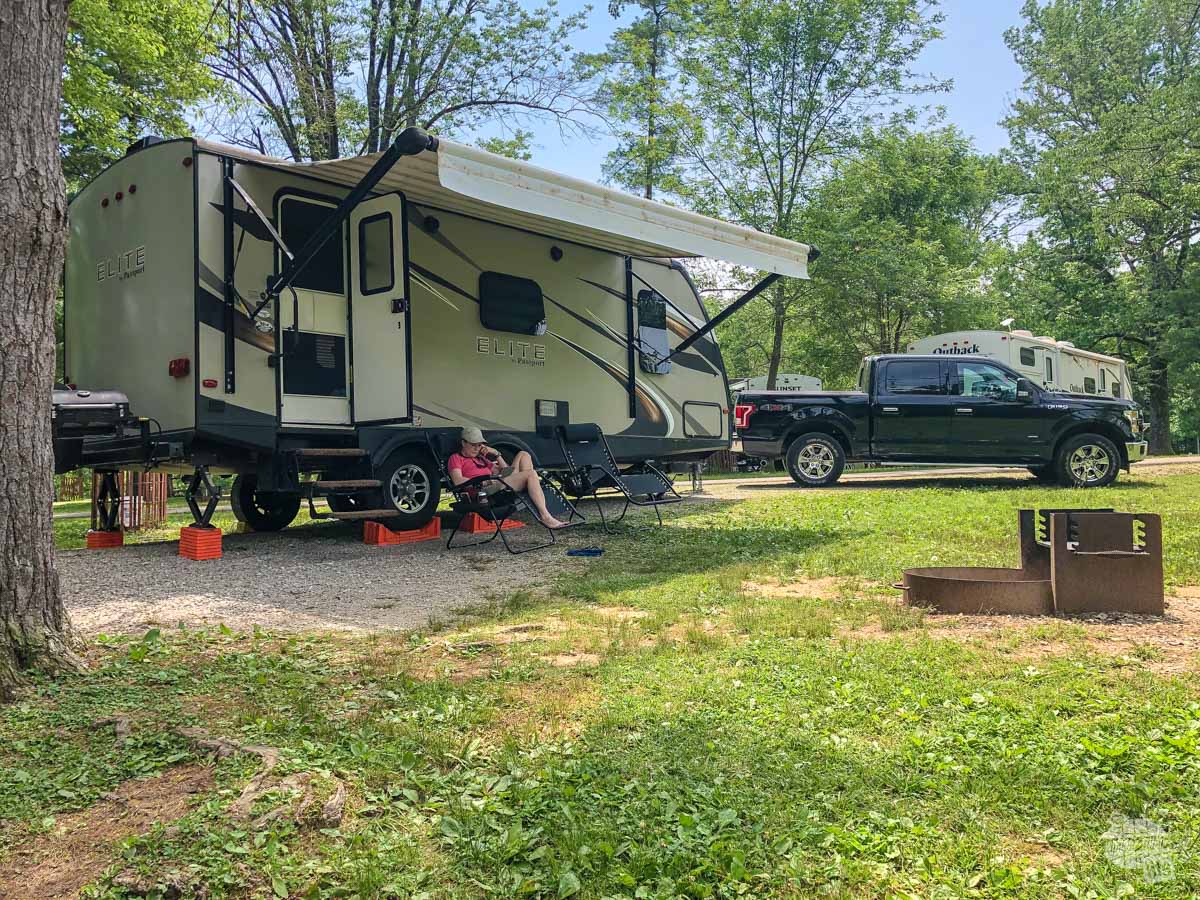
Once you are level and disconnected from the truck, connect the electrical. We use a power management system (basically, a surge protector for RVs) and that takes a couple of minutes to allow electricity through. Make sure the system is reading no errors before you get too invested in the site. We have had to move a couple of times because there were electricity issues at the campsite.
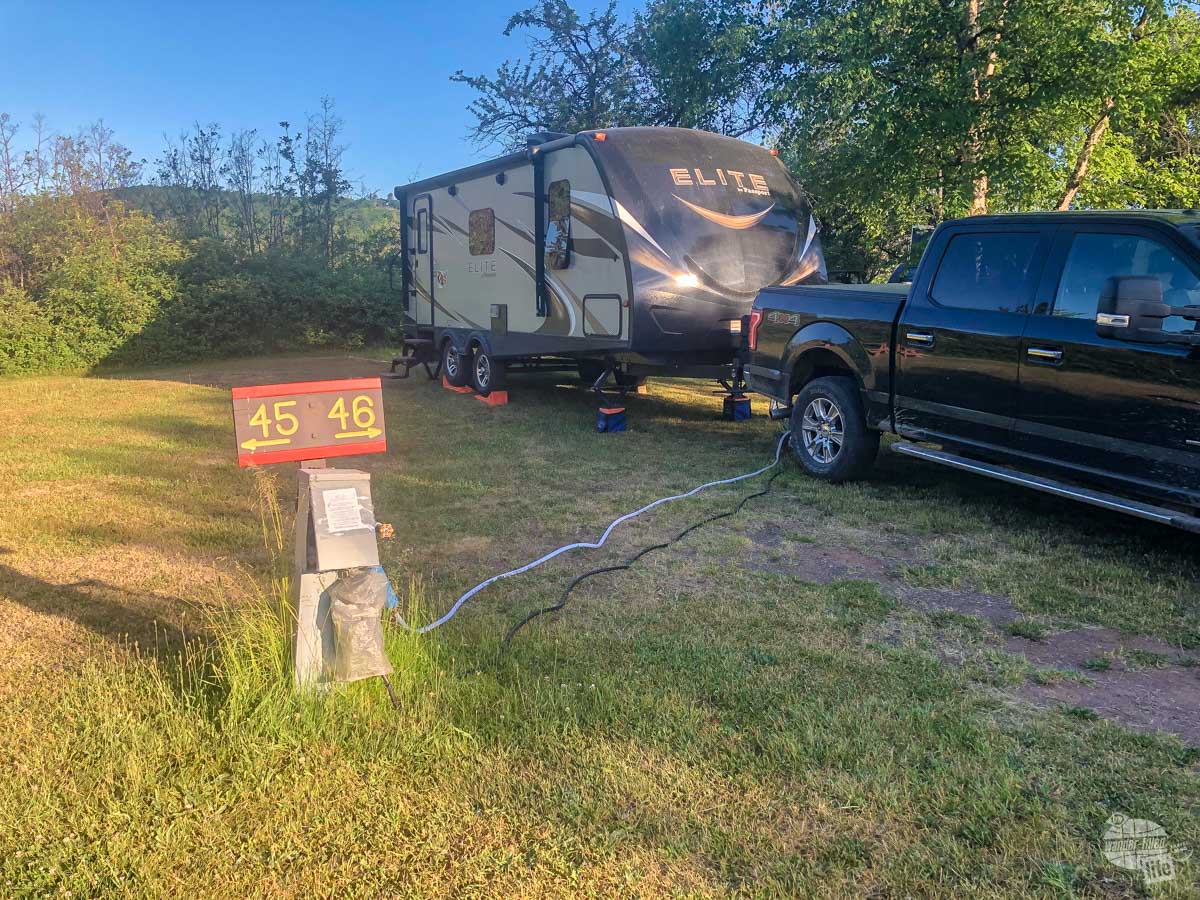
Pro tip: Put on gloves when working on the outside of the camper. That will keep your hands a lot cleaner when dealing with greasy stuff and the sewer connection.
Bonnie and I typically divide our efforts at this point, with her taking care of everything inside and me taking care of the stuff outside.
Once you connect the electrical, then connect the freshwater. Our camper is only designed to handle 45-55 PSI. We use a pressure regulator and a water filter to make sure our pipes are not damaged and the water tastes good.
Pro tip: Don’t forget to switch the bypass valve for the hot water heater to allow water to flow into it the first time after the camper has been winterized. Turning on the hot water heater without water in it can damage the heater.
Chances are, the dealer winterized your travel trailer before you bought it. You will need to flush the antifreeze out. Just keep the water flowing until it is clear. If the dealer used an air compressor to blow out the lines, you may need to keep the water flowing until all the air is out of the lines. You will need to do this on all of the sinks, shower and toilet.
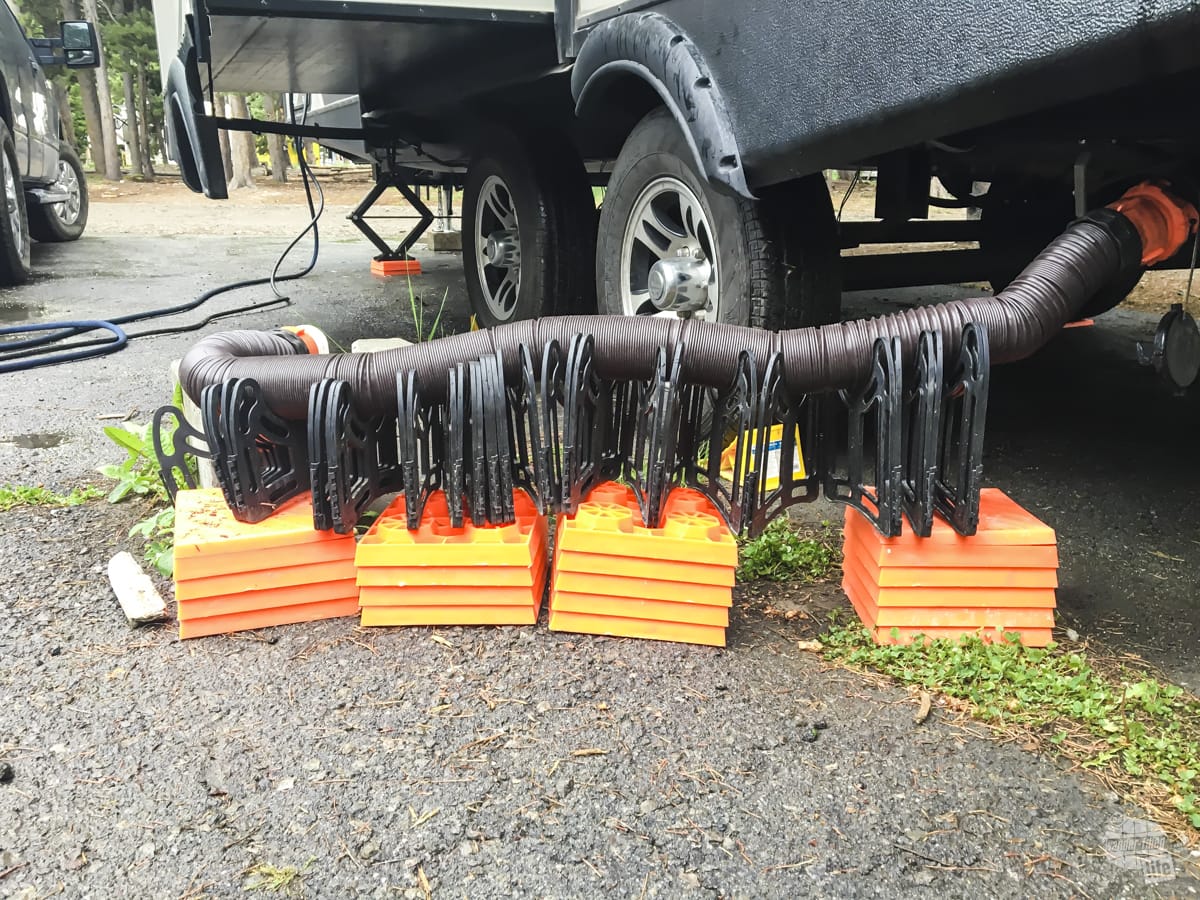
Next, it’s time to connect the sewer. The hose rotates on and should stretch to the sewer connection at the site. Be sure to use a screw-in adapter or a donut to prevent foul smells from leaking out of the sewer lines. Use a hose stand to keep the water from the tank flowing easily.
Now, it’s time to drop the stabilization jacks. These work to prevent the camper from rocking too much as people move in it. We use a cordless drill with a scissor jack adapter to put ours down quickly.
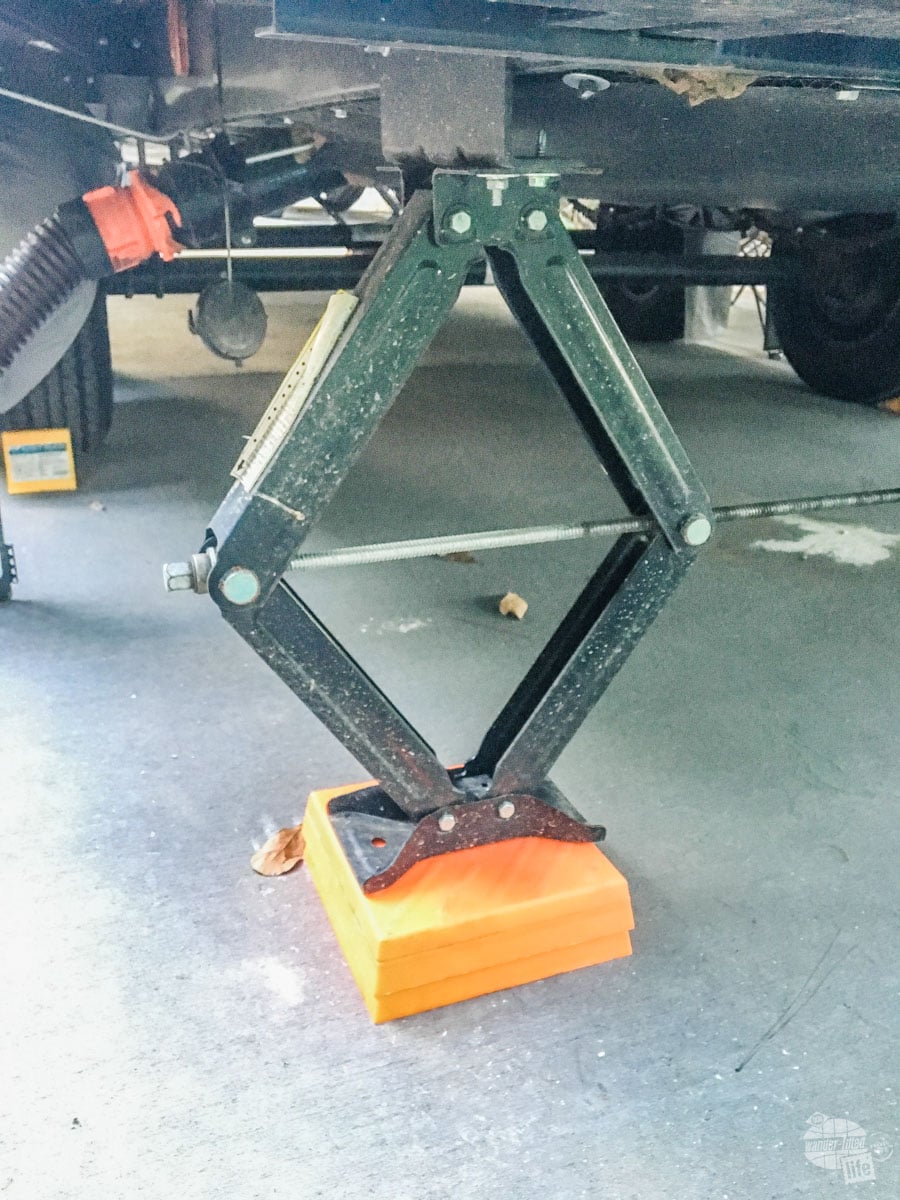
Some travel trailers come with automatic leveling jacks. Those are pretty cool but they are pricey, too.
Now, your trailer is set up. You may need to move a couple of things around on the inside, put out slides or generally get things shifted from storage to use, but that does not involve any complicated steps.
If you have a cable connection at the campsite, you can plug in your cable or you can raise your antenna to see what broadcast TV you can get.
Typically, this takes us around 20 minutes but we have been doing it a while. It will take you more time the first few times, but you will get the hang of it.
Now, it’s time to get out camp chairs and enjoy a cold beverage!
Leaving a Campsite
When you’re ready to leave you have to take down everything you set up when you arrived. No one ever said RVing was easy.
Start by putting on some rubber gloves. You will need them.
Once everything requiring water is taken care of on the inside, you can start draining the tanks. You will want to drain the black water tank first.
While I am working outside, Bonnie works on the inside to make sure everything is put away and ready for travel. She also pulls out the trash and leaves it out for me so I can dispose of my gloves and any shop towels I use.
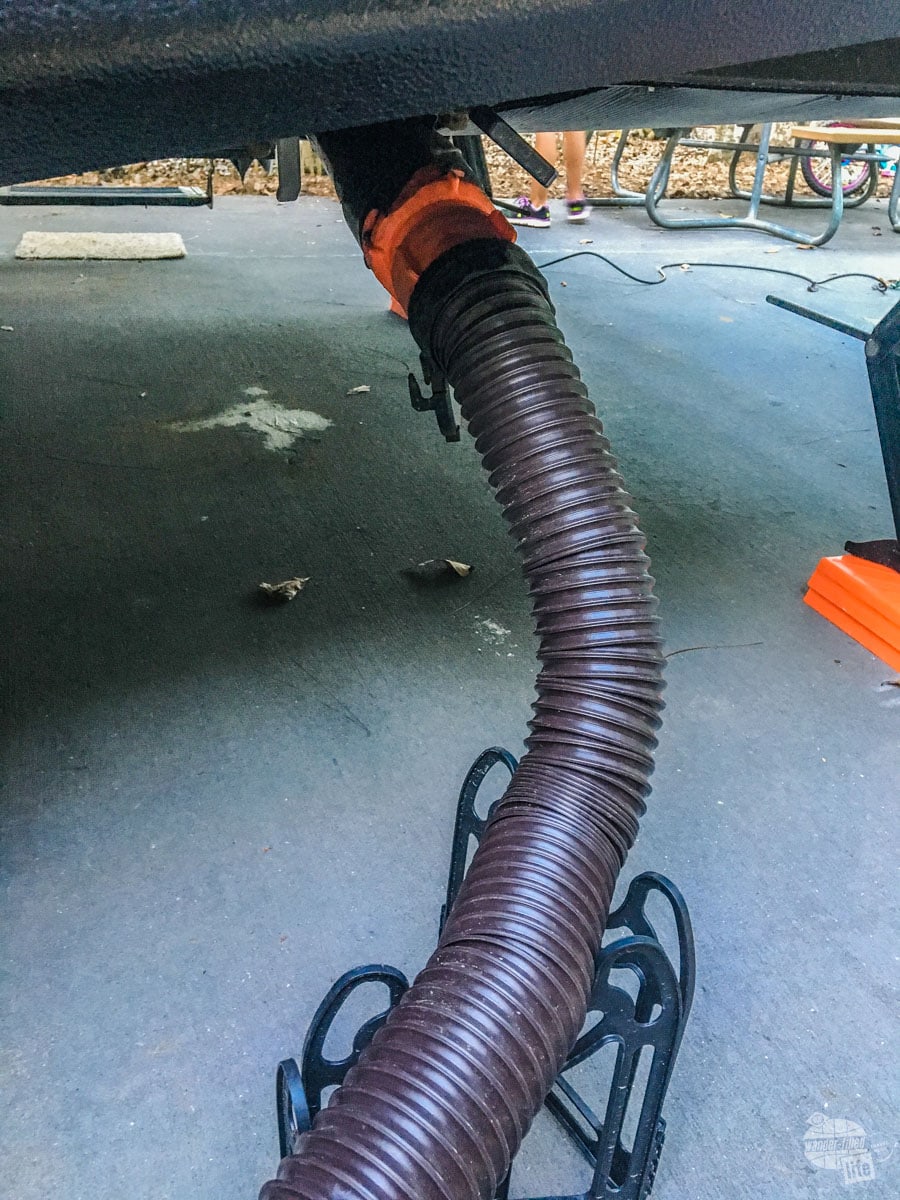
While the black water tank is draining, you can take care of other items, like putting the hitch on the truck or putting away camp chairs.
Once the black water tank has finished draining, you close that valve and drain the gray water tank. You want to always drain the foulest tank first, then rinse with less nasty water, then finally rinse with clean water… more on that in a moment.
While the gray water tank is draining, disconnect the freshwater hose and put it away. Then attach your utility hose. Once the gray water tank is drained, use your utility hose to flush your sewer hose then put the sewer hose and stand away.
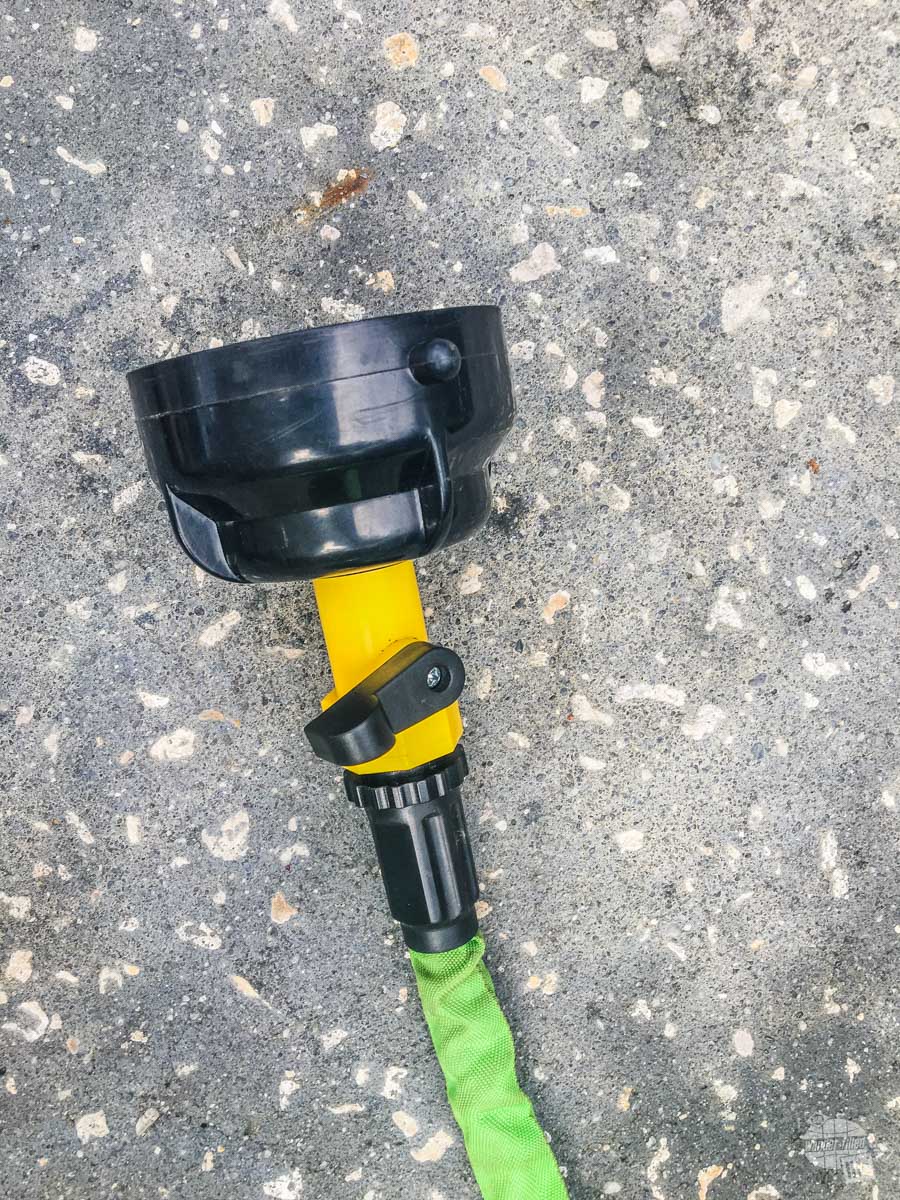
Pro tip: Do not use your freshwater hose for anything other than fresh drinking water. Additionally, store it in a separate bin from anything related to the sewer, like the utility hose.
Once everything is done on the inside and any slides are in, you can disconnect the power connection and then retract the stabilization jacks.
It’s now time to reconnect the travel trailer with the truck. Then, move off the levelers and get everything put away in the pass-throughs.
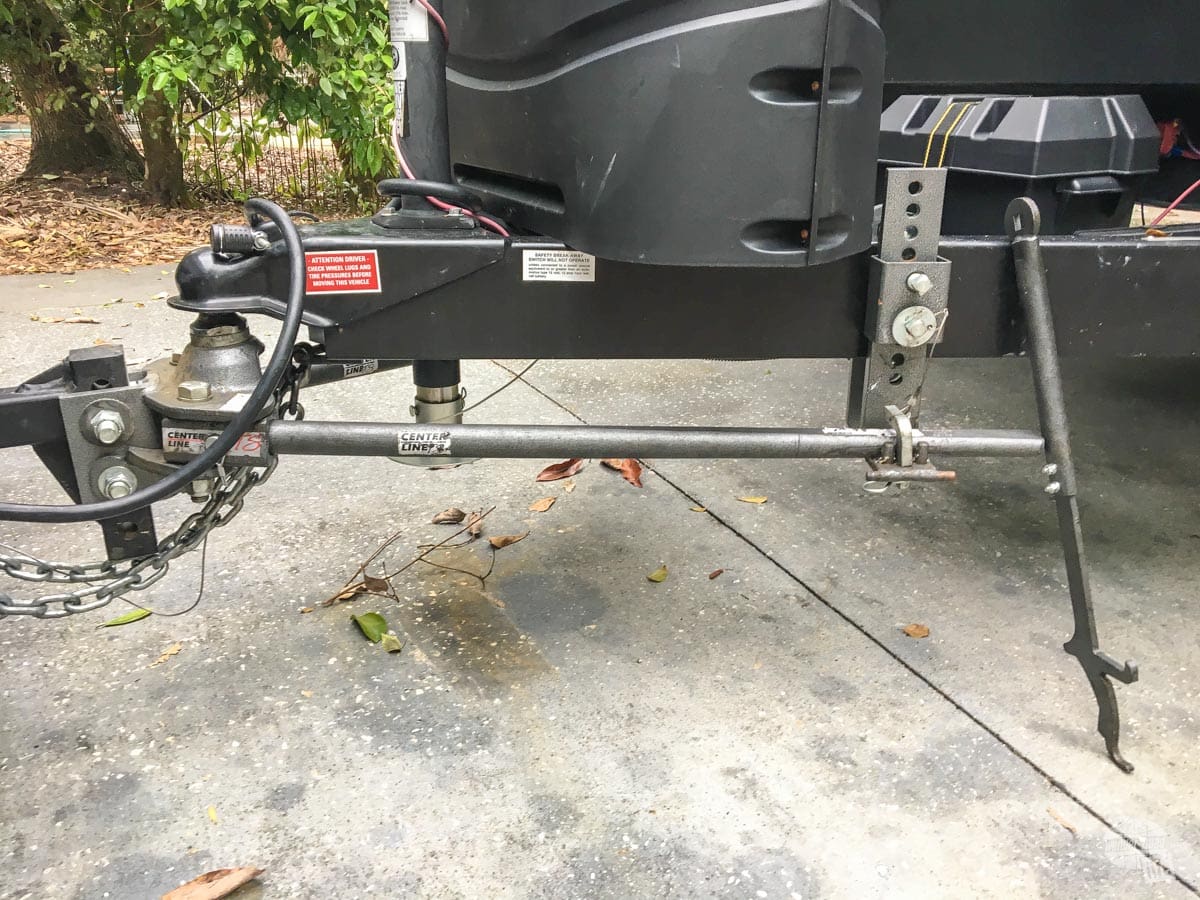
You are now ready to do the walk around on the camper, making sure everything is put away, locked up and ready for travel. Be sure to check those brake lights and the TV antenna one more time before you leave.
This typically takes us about 40 minutes. Then we visit the bathroom one last time and hit the road!
Final Travel Trailer Tips
Don’t let this long list of travel trailer tips discourage you. Yes, there is a learning curve to owning your first travel trailer. Yes, it’ll certainly be difficult and frustrating at times, especially in the beginning. And there is no doubt that you’ll make mistakes along the way. That’s true of most anything that you are new to.
Still, it’s a wonderful lifestyle and a great way to explore the world around you. With time, you’ll figure out what you’re doing and soon you’ll be the veteran and will share your travel trailer tips with a beginner.
Every year, we get better at RVing. With experience, the little things like winterizing the camper or handling small emergencies get easier.
I am heartened when I look back on how much easier the basic tasks are now. Owning a travel trailer may be a bit difficult to manage at first, but once you get the hang of it, it is a lot less stressful. And those tasks that took forever at first are second nature and finished with ease.
We hope this travel trailer guide takes some of the guesswork out of how to deal with a camper and what to expect when you first start out.
We invite you to join our Facebook group, USA RV Adventures . This group is for experienced, newbie and wannabe RVers to discuss RV destinations, itineraries and camping/travel tips.
Travel Resources
What do you use to find a flight.
We use Skyscanner to find deals on flights. Skyscanner has a great interface and compares tons of airlines for the best pricing and routing. That said, it does not always have every airline and some airlines will have better deals on their website. Still, Skyscanner is a great place to start. Click here to search for a flight.
What do you use to find a hotel?
We typically stay at Hilton properties , so we use the Hilton website . You can find good Hilton Honors discounts or AAA discounts for a hotel there. We make great use of our free night certificates from our Hilton Honors American Express. Click here to book a Hilton property.
If there are no Hilton properties available, we use TripAdvisor to read reviews and book the hotel. We find we can get the best price that way. Click here to search for a hotel.
We recently partnered with Stay22 to add interactive maps to each of our destination posts. This will allow you to see a plethora of hotels and vacation rentals all in one responsive map of the area.
What if I need more space than I can get at a hotel?
We use Vrbo for the times when we have rented a cabin for a weekend getaway, like this cabin in Townsend, TN , or needed to rent a house for a large family vacation. We had a great experience with them in terms of refunding deposits when COVID hit and will continue to use them. Click here to search for a vacation rental.
Who do you use for rental cars?
As a general rule, we book with Hertz for rental cars. We have had nothing but good experiences with them. Plus, we really like unlimited mileage and not worrying about crossing state lines. We have even rented from Hertz overseas in both Slovenia and Croatia . Click here to book a rental car.
How about booking a cruise?
We have found some amazing prices for booking a cruise through Cruise Direct . We have saved a lot of money on our cruises compared to what we found elsewhere, making a last-minute Bahamas cruise even cheaper. Click here to book a cruise.
What if I want to rent an RV?
We highly recommend Outdoorsy for RV rentals. We rented a camper van for a week to visit Rocky Mountain National Park for the elk rut and Custer State Park for the Buffalo Round-Up and had a blast. The program was easy to use and we really enjoyed the freedom of having a camper van for that trip. Click here to rent an RV.
What do you use for booking tours?
We don’t often book tours. Typically, we like to do stuff on our own. That said, there are some experiences you can’t have any other way. So, when we do want to book a tour, we always check Viator first. Click here to book a tour.
Do you use anything to get discounts on the road?
We make extensive use of both Good Sam and AAA on the road. Good Sam is normally regarded as a discount card for RVers at campgrounds and Camping World but anyone can use the 5 cents off a gallon at the pump at both Pilot and Flying J. Click here to get a Good Sam membership. We have had AAA as long as we have been married and it has more than paid for itself in discounts at hotels, aside from the peace of mind of having roadside assistance. Add in paper maps and the ability to get an international driver’s license and it is more than worth it for any traveler out there. Click here to get a AAA membership.
18 thoughts on “Travel Trailer Tips for Beginners”
Thanks for sharing this information. We have watched many YouTube videos and read multiple blogs in preparation for our first camping adventure in our new HTT this upcoming weekend. I feel more confident after reading your blog. We’re camping about an hour and a half from our house at Land Between the Lakes and it’s supposed to be good weather. I’m saving your blog info to have just in case.
Coop, that is a great spot and distance for a first camping trip. We hope you have a great weekend and enjoy your camper! Welcome to a great lifestyle!
Great tips for first timers! We purchased a fifth wheel 2 weeks ago and still reading blogs and posts. Thanks for your insight!
Thanks for the feedback and glad you found it helpful. Let us know if you have any other questions.
Great tips. We are picking up our new TT in a couple of days. While we are experienced with campers and camping in general the new trailer has many features the old did not. So for your readers I would say, you will never stop learning or improving your processes when it come to RV’ing. Furthermore, create a checklist and follow it. Once you get into a rhythm it will be less applicable, but doing things in a slow orderly deliberate manner will ensure your equipment stays in great shape for years to come.
100% agree!
Thought you have one of the better articles for newbies however not all campsites are full hookups. That first trip to the dump station can be a learning experience. You may want to add that for the new campers.
Thanks Debra and great idea! We will certainly add that after our next trip to a dump station to take some pictures!
Thanks for telling me that I should purchase a travel trailer that can be towed by our vehicle. My boyfriend and I are fans of outdoor adventures and we think that this is the best time to try RV camping. I’ll try to look around local auto dealers and see if they can offer us a good price for the vehicle we wanted.
Good luck, Zoe! I am not sure how much you want to be able to tow but be sure you get a truck that has a max tow package installed. That typically has a lot of the features you are going to want your truck to have, like a trailer brake controller and tow mirrors.
Loved how detailed this post is. Well done compiling this, its the complete package and I couldn’t thank you enough!
Thanks so much, Jeremy!
Hubby and I recently bought a 28 foot TT after 28 years of tent camping. Whew! Big step for us! Our first excursion will be at a nearby RV resort (close to civilization) in case we forgot anything. Your fantastic article helps to give us the confidence we need, thanks!
Welcome to an amazing community! We know you will have a great experience and we think staying local for your first trip is the perfect thing to do.
Please let us know if you have any questions going forward!
Great article lots of good tips. My wife and I just upgraded from a medium size tent trailer to a hybrid trailer. (20 feet long). We won’t be taking possession until next May as it’s going into storage for the winter. Looking forward to our first outing. I hope we can get into the US in 2022. Bathroom hook ups and water heater are going to be the biggest learning curve. Lili and Mike, Montreal, Quebec,Canada.
Thanks so much!
We hope you can get in the US in 2022 as well! We hope you enjoy your new camper!
Aloha guys, this is probably the longest amount of reading I’ve done since high school, lol. Very informative and simple to read and understand. Been doing a lot of research and we are finally ready to get ourselves an RV… Heading to camping world for the 4th time now and I am as prepared as I’m gonna be. Thanks once again! Cody Kanekoa Selman
Mahalo Cody! So glad we could help! Please let us know if there is anything more we can do to help you as you embark into this wonderful world!
Leave a Comment Cancel reply
I accept the Privacy Policy

100 Best RV Camping Tips for Beginners
Enjoy this article? Do us a favor and hit share!
100+ RV Camping and Towing Tips for Beginners
Here are over 100 of the best RV camping tips that we have used to make our trips safer, and more enjoyable.
5 Free Checklists Enter you email below for access to 5 free checklists for you next trip. Email Address First Name Camping Checklists Winterizing Checklist Subscribe
Should I get a membership or join an RV club?
If you don’t feel comfortable changing tires on the road, get a membership to a road side assistance club like AAA Plus with RV Coverage or Good Sam Roadside Assistance .
If you are looking for ways to save money when camping a membership camping club might work well for you. If you are new to RVing I suggest taking a year or two before joining a club. That way you can decide what type of camping you like and where you want to stay. Some clubs and seasonal sites only allow you to stay at one campground while others have many locations across the country. A couple places to start are Thousand Trails , Travel Resorts of America , Passport America and Coast to Coast .
What should I do before my camping trip?
Use Checklists, checklists for packing, towing, breaking camp, the trip home and after you return home. Using a checklist will help make sure you have everything you need and ensure you arrive to your destination and back home safely.
If you are preparing for your first RV trip don’t go it alone. Most likely you have a friend of family member who has done it before. Ask them to join you. You will learn a few things, and have more fun knowing you have some help.
For anyone new to RV’ing or if you purchased a new camper. The first thing is would suggest is to take a shake down trip. A Shake down trip is a short trip close to home. Your shake down trip could be as close as camping for a night in your own driveway. This will allow you to find any problems with your RV while you are close to home.
When I make my reservations I always check out google maps satellite view. This allows you to get a much better idea of how the sites look. That way you can check for thinks like backwards sites (picnic table and fire ring on wrong side) or other things not shown on the campground map like a trail or sidewalk the runs thru your site.
Plan your Route . If you are new at driving a motorhome or pulling a travel trailer or 5 th wheel you don’t want to be driving downtown in rush hour traffic. Look over your route and consider the time you will be near major cities and where you might need fuel.
What should I pack for my camping trip? RV packing tips beginners
Start packing early and place everything in a corner of a room in your house. As you think of items add them. This way you won’t be trying to remember everything at the last minute. Also, add items to your checklist so you remember them next time.
Pack items in to bins and storage containers. This will make it easier to load and unload for your RV. It will also help to keep items in place while you are traveling. A set or two of plastic drawers will fit in your RV’s closet and provide you with a lot of additional storage.
Pack for the weather. The forecast might say 85 degrees so I’m sure you will remember your shorts and swimsuit, but don’t forget a hoodie or jacket for sitting around the fire at night. On a cool evening some blankets can be enough to keep you warm without turning the furnace on too.
Pack heavy items down low in your RV, not in the upper cabinets. Items tend to shift while traveling and flying pot can do some serious damage.
If you have problems keeping your RV’s cabinet doors and drawers closed while traveling bungee cords can save the day.
If you are taking fishing poles with you PVC pipes make great carrying cases. The PVC pipes can be stored in a pass thru compartment, the bed of your truck, or you can mount them to the ladder on your RV.
Get a small tool kit to leave in your RV. Here are a few items you want to make sure you have. This isn’t a complete list, but it should get you out of most situations.
- A nice hammer you will use it a lot.
- A set of several sizes of Philips and flat screwdrivers
- Plyers, needle nose, channel lock, and vice grips
- Wire stripper/cutter, a few wire connectors
- A small and a large adjustable wrench.
- A socket set (not required, but useful if you have the room)
- A can of WD-40 can come in handy if you need to break loose a rusted bolt under your RV.
- Duct tape and electrical tape
- A can of Flex Seal (perfect for a temporary fix, on any leak)
What do I need to know when towing an RV?
This section highlights many towing tips for new RV owners, always remember that when towing safety should be your highest priority.
Tip to get you your destination safely
Check your tire pressure before every trip. Even better, get a tire pressure monitoring system . The wrong tire pressure can cause a decrease in fuel mileage. More importantly, knowing in advance that you have a problem can help you to prevent a blowout that could end up costing you thousands of dollars in repairs.
If your tires are getting old they should be replaced, dry rot will most likely cause your RV tires to fail well before the tread is gone. Manufacturers recommend replacing your tires every 5 to 7 years. If you want to find out how old your tires are check out this guide from Tire Rack on determining the age of a tire.
Never let your fuel get below ¼ tank. Unexpected traffic jams, rush hour traffic and long stretches between fuel stations can lead to unnecessary anxiety if you are running on fumes. Plus, if you start looking for fuel at ¼ tank you will have more chances to find a large station like a Pilot of Flying J that will be easier to get in and out of.
Make sure your tow vehicle and hitch are rated for the weight of the trailer. The trailer life magazine towing guide is a great resource to look up the limits of your vehicle.
If your RV is over 5,000 lbs then you should probably use a weight distributing hitch. Most weight distributing hitches also include sway control to help keep your trailer going straight down the road when you get passed by a semi or hit by a strong cross wind. Click here to learn more about weight distributing hitches.
Learn the features and function of your hitch. Whether you have a 5th wheel hitch or a weight distributing hitch, make sure you understand how it works before towing.
If you tow a 5th wheel, make sure your hitch is locked. Make this your last check every time you get in your truck.
Measure the height of your RV, write it down and keep it in your tow vehicle. Now you will know for sure if you will fit under that gas station canopy or below that low clearance bridge.
Leave more space between you and the next car when traveling down the road. Towing a heavy RV can more increase your stopping distance by 50 percent or more. Be safe and use the 6 second rule, when the vehicle ahead of you crosses an object keep a 6 second delay before you cross the same point.
If your RV has brakes make sure your tow vehicle has a brake controller. Without a brake controller your tow vehicle’s brakes will be doing all the stopping. A brake controller activates the trailer brakes lightening the load on the tow vehicle.
Load your RV evenly the tongue weight of your RV should be 10 to 15 percent of the total weight. Don’t load all you gear right up in the front or back of your RV otherwise you might end up with too much or too little tongue weight.
What equipment should I have for towing an RV?
Keep a 4-in-1 lug nut wrench in your RV. I had a blowout on one of my first trips and didn’t have the correct size wrench or socket to change the tire. I was close to home and was able to make it on 3 trailer tires going 20 mph, but you might have to unhook your RV or call for help if you can’t change the tire on the road.
If you tow vehicle does not have towing mirrors look into purchasing some mirror extensions, being able to see what is going on around you is well worth the small cost.
Know how to read a map. GPS is great, but if your battery dies, or your phone loses its signal an old fashioned map can save the day.
Download the area in google maps so if you lose cell service you won’t lose your map on your phone. If you don’t know how find out here.
Another great tool is the Gas Buddy app . This app will help you locate the lowest fuel prices in the area to save you some money.
Before You Tow Checklist
- Once you are hooked up and think you are ready to leave take one more walk around your rig to double check the following items:
- Hitch latch and secure
- RV lights working
- RV brakes working
- TV antenna and roof vents down
- Are all doors, windows and vents are closed on your RV
- Wheel chocks removed
- RV license plate on with current tags
A few more RV towing tips for new RV owners
Plan on bad gas mileage when towing. If your tow vehicle has a gasoline engine expect about ½ the range you usually get. If you have a diesel your mileage decrease will not be quite as drastic, but on long trips you should still plan more frequent stops for fuel.
Don’t travel with full tanks if possible. A full fresh water, black and gray tank can be several thousand pounds of additional weight on your RV and tow vehicle.
Get connected. If you need Wi-Fi access there are plenty of places to get connected for free. Libraries, travel plazas, McDonalds and Starbucks are a few spots you can get online.
How do you back a travel trailer into a camp site?
One tip to make backing a trailer easier is to place you hand at the bottom of the steering wheel. When backing up the direction you move your hand is the direction the back of the RV will go.
If you aren’t comfortable backing in, find a large empty parking lot and go practice. Don’t feel bad about practicing, it will make parking your rig at the campground a much more enjoyable experience.
Don’t be ashamed to pull forward and try again! Even the most experienced driver sometimes need to pull forward to get a better angle to back in.
Always use a spotter, and work out a system of hand signals to communicate.
Use a set of short range radios so you can easily communicate with your spotter. Trust me, yelling out the window at your wife when trying to back into your site is a perfect way to get your trip off to a bad start. The radios also come in handy for communicating around the campground, especially when you don’t have good cell phone coverage.
Have your spotter stand behind the RV where they can see the back and you can see them in your mirror to watch for hand signals
If you don’t have a spotter (or want to save your marriage) adding a backup camera to your RV makes life much easier. There are wired and wireless backup cameras available in a wide range of prices.
Step by step guide to backing up your RV
Whichever side of the road the spot is on drive along that side of the road as close as possible to the edge.
Once the middle of your RV is in line with the spot turn towards the other side of the road, this will start to angle the RV towards the spot.
When the RV is just past the spot you need to start backing up. When you begin backing up turn the wheel as far as possible toward the side of the road opposite the site.
After the RV is turning start turning the wheel back the other way adjusting to get in line with the site.
Check out this article for more tips and tricks to backing your travel trailer or 5th wheel.
Tips while at camp
What camping gear do i have to have.
A level and leveling blocks. Most of the time your site will not be level. When you back in lay the level across the counter or floor of your RV and check the slope. Then you will have to pull forward setup your leveling blocks and back on to them. Leveling blocks are easier to stack and store than carrying wood.
Comfortable chairs for around the camp fire , you will probably be in them a lot. If you have children get them a nice chair too, otherwise you will be fighting for the good ones. I love my Eureka Curvy chairs because they have side table for your food or drink, but find one that fits you.
Get a nice hatchet for splitting wood for your camp fire.
A couple of foldable tables are perfect around the campfire and for outdoor cooking.
Line your shelves and drawers with a non-slip shelf liner, this will help keep everything in place.
Tension curtain rods work great in the refrigerator and cupboards to hold things in place.
Spice racks can be used in the kitchen and bathroom to keep things organized and in place.
Small baskets also help keep things in place while traveling.
Use a filtering water pitcher like the Brita Slim Water Pitcher, campgrounds don’t always have the best water so for drinking or coffee you might want filtered water. The slim design fits in most RV refrigerator doors.
Don’t forget a bottle opener and cork screw for those adult beverages.
Pack a large flash light or battery powered lantern. If you are camping in a remote area you will appreciate having a powerful light at night.
Take a small first aid kit and a backpack. You never know when you might need a band-aid or some motrin and the backpack is great for taking so first aid supplies and water bottles when going on a hike.
What is the best non-essential camping gear?
If you want to make leveling even easier install stick on levels on the front and side of your RV. I had a set of the Hopkins Graduated Levels on my hybrid and it made leveling a breeze. They tell you exactly how much height is needed so you only need to set up your blocks once.
You might not think of packing a ladder, but a telescoping ladder can come in handy. After lifting my wife up on my shoulders to hang lights from the awning I decided we needed a ladder. A ladder will help at the end of your trip if you want to clean leaves and branches off the awning and slide toppers before closing everything up.
Slide toppers keep your slides clean and help keep debris from damaging your seals. If your RV didn’t come with slide toppers you might want to get some. If you are handy you can install them yourself over a weekend, or have your local RV dealer install them.
The crank that came with your RVs stabilizer jacks works great, but sockets are available that will fit your cordless drill and make raising and lowering the jacks a snap.
An oscillating fan. On a hot day, a fan setup next to your picnic table can make it much more enjoyable. Running the fan on low will also help keep mosquitos away.
If you want to enjoy the outdoors, but don’t enjoy mosquito bites a screened room is exactly what you need. Set it up over the picnic table and you have a great place for meals or sitting around playing cards in the evening. The room will also give you somewhere to get a break for the sun on a hot summer day.
Tips for setting up you camp site
Plan to get to your site well before sunset. Backing in your site and setting up can be difficult even in daylight, doing it at night is much harder. During business hours, many campground will show you to your site and help you. If you arrive late you might be on your own.
If you didn’t pick your site out ask what sites are available when you arrive and see if you can check them out. You might find that perfect site overlooking the lake is open.
When you park make sure your RV door is facing the picnic table.
When you park your RV check the location of the water, electric and sewer hookups. This way you can position your RV where all the lines will reach.
Before opening any slide-outs make sure all cabinet and room doors around the slide are closed. An open door can get caught by the moving slide and get ripped right off the hinges. I know one person who had this happen in their brand new 5 th wheel.
Make your outdoor space work for you. You don’t what to spend your trip cleaning dirt and mud out of your RV, so setup a large RV patio mat near your door (some campgrounds no longer allow outdoor carpet because it will kill the grass, but many breathable options are available).
Cooking/Food
Pack a make-ahead or frozen meal for your first and last meals at camp. This way you can still enjoy a nice meal and not be too rushed. If you have a lot of activities planned, take a few more make-ahead meals for those busy days.
Pack decent quality utensils, but nothing too expensive. After a few trips things will come up missing. Also, don’t over pack, here is a list of the items you should have for each person.
Fork, spoon, knife, plate, bowl, cup and mug
You should also have a set of pots and pans and a basic set of cooking and serving utensils.
If you enjoy a cup of coffee in the morning a coffee pot is something you don’t want to forget. Depending on the type of camping you like to do, there are several different options.
Stock up on paper plates and disposable utensils. Not only will it help you to conserve water, but it will also make cleanup from meals quicker.
Speaking of trash, don’t forget plenty of trash bags.
Aluminum foil has many uses. You can wrap foods for cooking over the camp fire, or use it to store leftovers.
There’s nothing like cooking over a campfire, some campgrounds have a grill grate built into the fire ring, others don’t. I like having my own, I love my Perfect Campfire Grill .
Don’t forget a set of hotdog / marshmallow forks.
Another campfire cooking necessity is a pie iron. I would suggest 1 per person. Here are a few of my favorite mountain pie recipes .
Don’t forget the S’mores ingredients.
Not every meal will be cooked over the camp fire, a propane grill, stove or combo unit will come in handy. Some RV’s are equipped with a port to connect a grill to your rigs propane tank(s). If you plan to go this route just make sure you choose a grill like the RV Sidekick that is designed to work with the low-pressure system on you RV.
A few more first time RV camping tips
If you run into a problem you can’t solve while camping try asking the people next to you. Campers are usually happy to lend a hand if they are able.
Unless it means to difference between keeping and losing your job, keep work at home. Keep the laptop off and let the emails wait until you are back in the office.
Remember to pack some games and other activities. Here are a few ideas to get you started
- Cornhole (bean bag toss)
- Football, or soccer ball
- Volleyball or basketball (most campgrounds have courts for both)
- Bicycle, skates or skateboard
- Squirt guns for hot days
- Rafts and beach blanket or towels
Avoid eating at restaurants. For short trips pack enough food for your stay. For longer trips pack enough for the first few days, and have a grocery list ready to use at a local grocery store or market.
On your way in to camp look for local farmer’s markets or roadside stands to pick up fresh fruits and vegetables later.
Pack a laundry bag or 2 for all your dirty clothes and use it. This way when you get home instead of searching for all your dirty laundry you can just take the bag into the laundry room and empty it out.
If you camp with your dog keep it on a leash any time it is outside your RV. Take them for walks every day and clean up after them. If you will be leaving your pet for the day make sure they have water and on hot days run the AC in your RV to keep them cool.
RV camping tips for wet weather conditions
Leave a deck of cards or a board game in the RV.
If you have small children their favorite movie can pass some time on a rainy day. Just remember you are camping to get out in nature so don’t spend too much time watching TV.
A couple tarps or a roll of painters plastic sheeting are great for covering your gear.
Keep a couple cheap ponchos in your RV in case you are setting up or taking down camp in the rain.
RV water hookup tips
Run some water out of the water hookup before connecting you drinking water hose. This way if the line hasn’t been used in a while any rust or sediment ends up on the ground instead of coming out our faucet.
Keep a spray bottle with a mixture of water and a cap full of bleach in your RV. Give the faucet a couple shots before connecting your hose, you never know someone could have just used that faucet to give their dog a drink.
Use an inline water regulator. The regulator will prevent your RV lines for being over pressurized causing damage to the lines and fixtures.
Many campgrounds have poor water quality as well. Using an inline filter will keep your water clean and safe. If you use a filter like the Camco PUR inline filter your water will be safe to drink and when it gets old you just throw it away and get a new one. Make sure to use a 90 degree elbow so the filter isn’t sticking straight out and putting extra stress on the RV connector.
Get a Water Bandit. The Water Bandit is a hose coupler that attaches to your hose and uses a rubber boot to connect hose bibs that have damaged threads.
Always have a 2-way water valve and second hose that is not white. You can connect the 2-way valve to campground water spigot and have one side for your fresh water hose and a second hose for flushing your black water tank or other uses. Having the second hose in another color makes it easy to avoid connecting your black water flush hose to your city water connection. I use a Pocket Hose, when it’s not in use it stores in ½ the space of a standard hose. The 2-way valve can also come in handy if you need to share a spigot with the site next to you.
RV electric hookup tips
Get an RV surge protector, power at campgrounds and RV parks can change quite a bit and could damage the electrical systems in your RV. Although they aren’t cheap they are worth the protection they provide.
Keep a set of fuses in your RV a blown fuse might take out your lights or furnace and ruin your trip. Make sure to check the type of fuses your RV uses, not all fuse boxes are the same.
RV sewer hookup tips
Make sure you have a sewer hose. I like the Rhino Flex lines, they stay collapsed when the full length isn’t needed and come with a built-in elbow and universal adapter that connects to most drains.
Get a sewer hose support, this will slope your sewer line to allow your hose to drain completely.
Don’t waste your money on expensive RV toilet paper. Scott 1000 single ply is cheaper and still safe for your holding tanks.
Double check the connection of your sewer hose before dumping the tanks. If not secured the hose could come loose and dump sewage in you compartment of all over your camp site.
Don’t leave your black and gray drain valves open all the time. This is most important for the black tank, you want the tank over ½ full before you dump so there is enough water to flush any solids out of the tank. You also want water in your gray tank to flush the sewer hose after dumping the black tank. Keep a pack of disposable rubber gloves and hand sanitizer in your RV. Use the gloves when at the dump station and then toss them out.
Click here to see tips for RV’s with dual sewer connections .
Click here for everything you should know about RV tank chemicals.
Tips to conserve propane
Conserve propane by switching on your electric water heater instead of propane. Just make sure to turn it off before you leave. If you plug your RV in with the tank empty and the electric heater on you will fry the element in a matter of seconds. If you need hot water quickly turn the propane and electric on for a faster recovery time. Another way to conserve propane is to limit the use of your furnace. Pack extra blankets at night, and if you have electric hookups use an electric space heater instead of the furnace to stay warm.
Click here to checkout my comparison of RV propane monitors.
Getting ready to leave
Double check the connection of your sewer hose before opening the tank valve. I have a friend who filled the bottom of his motorhome compartment with sewage because the hose flew off when the valve was opened.
Make sure your awning is rolled up and secured. If your awning opens while traveling down the highway it will not only cause serious damage to your RV, but you might be the start of a multi-vehicle accident.
Use a checklist to do a final walk around the RV and campsite before you leave.
Boondocking (camping without water, electric and sewer hookups)
Here are a few camping tips to conserve water, electric. Look above for tips on conserving propane.
If you plan to do any boondocking you will want an inverter. The inverter will convert your 12V battery power to 120V AC power for your electronics. Many low-cost inverters are modified sine wave, they work fine for things like lights, hair dryers and microwaves, but for powering electronics you need a pure sine wave inverter.
Another tip for boondocking is to install a solar system and additional batteries. This will allow you to have power without needing to run a generator.
Depending on the size of your RV your onboard water tank may not hold enough for your entire stay. Taking a few fresh water containers and a small 12 volt pump will allow you to refill your tank when it gets low. I added an Andersen RV valve to my 5 th wheel that allows me to fill my tank using the built in water pump and a hose connected to my city water port.
When camping without water and sewer conserving water is very important. Taking “Navy Showers” conserves a lot of water. Get wet then use that valve in your shower head to turn the water off, after you soap up turn the water on and rinse off. You might want to check out the shower house at the campground the facilities might be nicer than you think.
Another water conservation tip for washing dishes is to save them until you have a full load. Scrape as much as possible into the trash first, then fill a dish part way and put the dishes in with some soapy water and wipe them all. Then drain the dish pan outside and add some fresh water to rinse the dishes. Again, drain the rinse water outside. This will save fresh water and space in your gray water tank.
If you are taking a shower use a dish pan to catch the water while the shower is warming up, then you can use that water later to wash you dishes. This will not only conserve fresh water, but it will also save room in your gray tank. (this tip is courtesy of Nathan and Marissa at lessjunkmorejourney.com )
What should you do after you get back home for camping?
Once you get back home there are some simple things you can do to be ready for your next trip.
If you got caught in in rain while closing up camp open everything up to dry out as soon as possible. Bunks on a pop-up or hybrid and awnings will grow mold and mildew quickly if left wet. You should open up your slides or at least open some windows to get that moisture out of your RV. Remember to dry out your screen room or patio rug as well.
Click here for some more awning tips.
Take any bedding , dish rags and towels, or dirty dishes in as soon as you get home. Wash them and put them back in your RV so they are ready to go.
If you run out of any food or spices that you leave in your RV replace them on your next trip to the grocery store. Otherwise you might forget until you need it on your next trip.
After every trip give you RV a quick wash with an RV wash & wax cleaner. Make sure to spend some time cleaning all the bugs off the front, this will keep your front cap looking great for a long time.
Clean your roof at least a couple times a year. Use a cleaner made specifically for RV rubber roofs. This will help reduce streaking on your RV and you will see problems sooner.
Check you RV often for water leaks. Get up on the roof at least 4 times a year and check for any seals or caulk that looks cracked. You should keep a tube of Dicor handy to touch up these areas before they turn into a much larger problem. Water in the walls of your RV can cause the sides to delaminate or the floor or ceiling to rot. Stopping the water early can save thousands of dollars in repairs.
If you have a roof leak, but aren’t sure where it is coming from check around the air conditioner first. AC units on RVs are a common place for leaks to start.
Before winterizing your RV and putting it in storage give it a good cleaning. Wash and wax the outside. Inside sweep the carpets, mop the floors, wipe down all the countertops, cabinets and drawers. Take all your sheets, towels and laundry items out wash them and store them in space saver bags. A deep cleaning will not only leave your RV ready for next spring, but it should help keep rodents and insects out over the winter.
What is the most important thing to remember when camping?
Leave a bad attitude at home. We have all been there running around to get camp setup before the sun goes down. Rushing from place to place because we planned too many activities for our trip. Remember this is your time to relax and enjoy some time with your family. Don’t over book your activities and don’t get worked up over the little things. Make sure that when you look back you will remember the great times you had.
Share this Post
40 thoughts on “100 Best RV Camping Tips for Beginners”
You’ve made some decent points there. I checked on the net to learn more about the issue and found most individuals will go along with your views on this web site.
It’s the best time to make some plans for the future and it is time to be happy.
I’ve read this post and if I could I wish to suggest you few interesting things or suggestions. Maybe you could write next articles referring to this article. I wish to read even more things about it!
whoah this weblog is wonderful i really like studying your posts. Keep up the good work! You already know, a lot of people are looking around for this info, you can help them greatly.
Thanks for the feedback.
I think you thought of everything! Great tips. We aren’t in an RV yet (a minivan at this point but maybe in our future down the road) but some of these still apply!
Thanks Angela, Once I started it was hard to stop. There are so many things you learn along the way that could have made life easier if you had known them sooner. Jason
Thanks for the tip to have a sewer hose when going on an RV trip and need sewer hookups. My family is planning on going on a trip this summer, and we want to find some good RV sites to visit during the trip. We will be sure to get a sewer hose and surge protector when traveling.
Larry, I’m glad you found some of the tips useful. Jason
Your website is full of excellent advise, tips and information. We are new to RV’ing and your website is first on my bookmark list.
Thanks for putting up such a useful resource. Great job!
Chris, thanks, if you have any other questions just let me know. Jason
Hi! My husband and I have been thinking of trying RVing for a first time. Our thoughts are to try local campgrounds (live near Lake Michigan…Chicago area) just to get out “feet wet”. Perhaps a smaller camper type to see how we feel about it. I have been reading various blogs and sites but you were so thorough….the best I’ve come across yet. We may try camping in early to mid September. I will definitely use your suggestions and get the checklist going….planning ahead and early. Thanks for the great info.
Linda, Thank you for the compliment. I am sure you will love RVing once you give it a try. Please feel free to ask any questions you have. Thanks, Jason
Thank you for this post – very informative! When you say to secure your awning while traveling is there something we should do other than roll it up (it’s electric) to make it secure? We just bought our first travel trailer and I don’t want it flying open while we travel. Thanks for your help!
Emily, With an electric awning, there isn’t really anything to do other than make sure it’s completely rolled up. When I had a manual awning I also wrapped a Velcro strap around each of the arms to make sure they stayed in place. Thanks for the question and enjoy your new travel trailer, Jason
Wow! Your info has been so helpful!! We just bought our first RV and your site has really helped us get ready & gain some useful tips for when we camp!! Would love to know if you have a RV GPS app that you recommend?
Julie, Thanks for the feedback. I really like google maps, but it has got me into a couple situations where the roads weren’t “RV friendly”. I have a friend with an in dash Kenwood radio that uses Garmin’s RV GPS system and he really likes it. You can input your RV’s height and then it checks for clearances along your route. If I were to make a suggestion it would be a portable unit that uses Garmin’s software like the Garmin RV 660LMT . The link will take you to Amazon where you can check out the reviews and Q&A. Thanks again, Jason
Lots of good information! Thanks from a newbie. I wanted to get your thoughts on leaving the tow vehicle and camper hitched while camping. It would be for a day or two and would be in a location having full hook ups. I can hitch and unhitch solo but when my partner cannot camp with me that process can be a challenge. Again, this would be for short camping trips not any long stays. Thanks!
PC, I have left my camper and tow vehicle connected for 1 night stays. Most of the places I camp I wouldn’t be able to level out when connected, so that is the main reason I always disconnect. If staying connected works better for you than go for it. Thanks, Jason
Pingback: 24 Of The Best Camping Blogs That You Should Be Following - Beyond The Tent
You put together a great list of camping blogs and I’m honored to be on there. I am going to start following some of your other recommendations. Thanks, Jason
Pingback: 100 Tacos With My Pastor – Chasing Less
Pingback: RV Travel Newsletter Issue 885 – Anywhere RV
Thanks for including my tips in your newsletter. Jason
Pingback: RV Travel Newsletter Issue 886 - RV Travel
Thanks for the quote. Jason
Hi Jason This is my second year with my new travel trailer and I love all the tips you’ve provided. I have this site bookmarked and refer to before each trip. Thanks for the informative article.
Kathleen, Thanks for the compliment. I hope you continue to enjoy your travel trailer and if you have any questions please let me know. Jason
Lots of good tips and information. I just want to add few things from my side. To enhance the life and performance of RVs, it needs proper care and maintenance particularly the roof. If the roof surface is compromised so will be the RV. A coat of RVRoofMagic on the surface of the RV roof is one of the best and simplest preventative measures one can do.
Lauren, You are correct that RV roof’s need to be taken care of. Please send an email to Jason at weekendrvadventures.com and let me know more about rv roof magic. Thanks, Jason
Pleasant post. I was checking continually this blog and I am awed!
Can you make this printable? So many helpful tips!!!
Anne, Thanks, That’s a great idea! I will try to make a printer friendly version. Jason
I like your tip to be prepared for camping in wet weather conditions by bringing a tarp to cover your gear. My family wants to go camping before winter sets in and we are still looking for a campground. We’ll be sure to be prepared for all weather conditions.
Skylar, I would love to check out your campground if I ever make it down to Corpus Christi. Thanks, Jason
We are new to a travel trailer and I enjoyed your suggestions. The owner’s manual which came with the used trailer left a lot to be desired, so You-Tube and blogs such as yours have become a great resource for us. Thank you.
Thank you very much. Jason
It’s really awesome guide for beginners! Thanks Jason! We just starting our RV life. I hope it will help us 🙂
I like your suggestion to use a checklist for every aspect of the trip from packing to after we return home. My husband and I purchased a Class B RV and are currently looking for a campground that has some good military specials. Keeping your tips in mind should help our future camping trips go as smoothly as possible!
Thanks, Enjoy your new camper. Jason
Thanks Jason, great info here buddy. I never actually thought about the possibility of power surges from campsite power outlets causing issues but it makes sense. I will be looking into these before our next trip. Thanks for the tip!
Comments are closed.
7 RV Camping Tips and Tricks for First-Timers
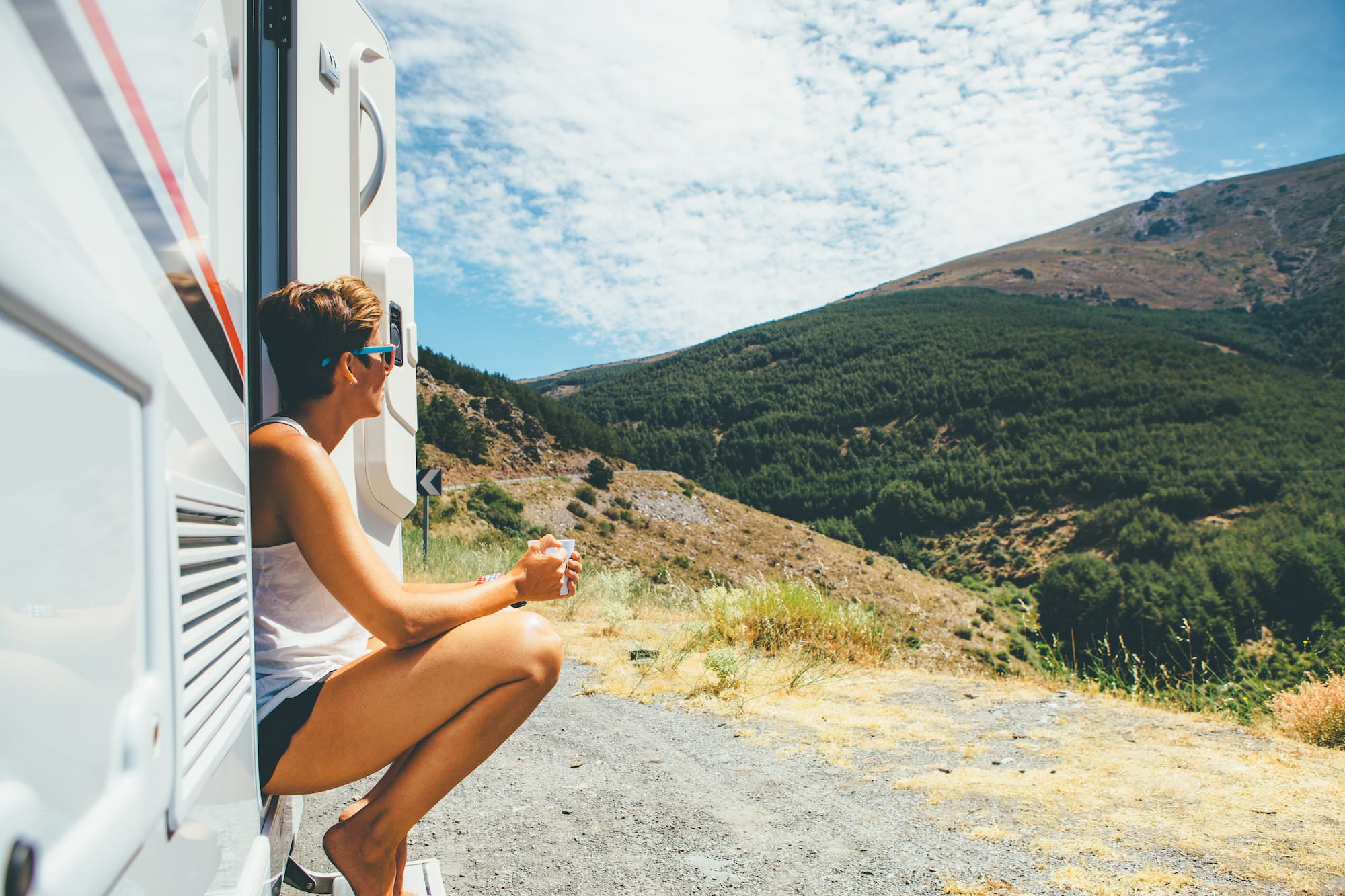
Buying your first RV comes with a lot of anticipation — you’ll likely be staring at maps, dreaming up all of the beautiful places you want to finally explore. Though this new purchase is exciting, there’s a lot to learn when it comes to spending your days on the open road. We’re here to help with these 9 RV camping tips for beginners.
We’ve asked some well-versed RVers for advice on what to expect as a first time RV owner. We hope this list of RV camping tips for beginners will help you find peace of mind when preparing for your next big adventure.
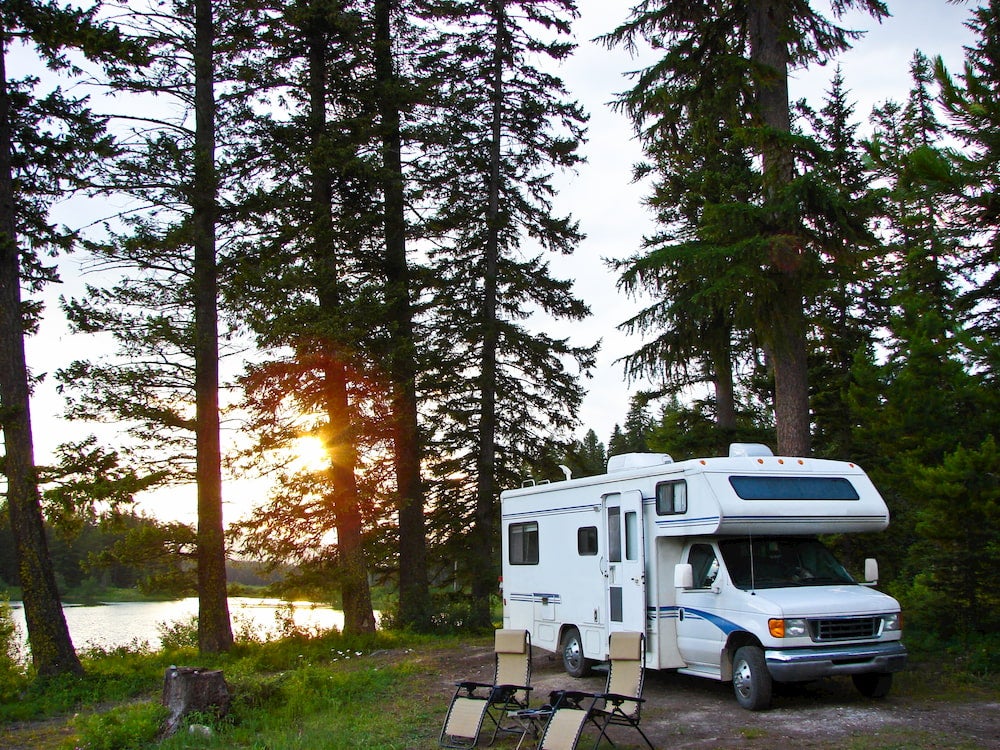
1. Use The Dyrt PRO
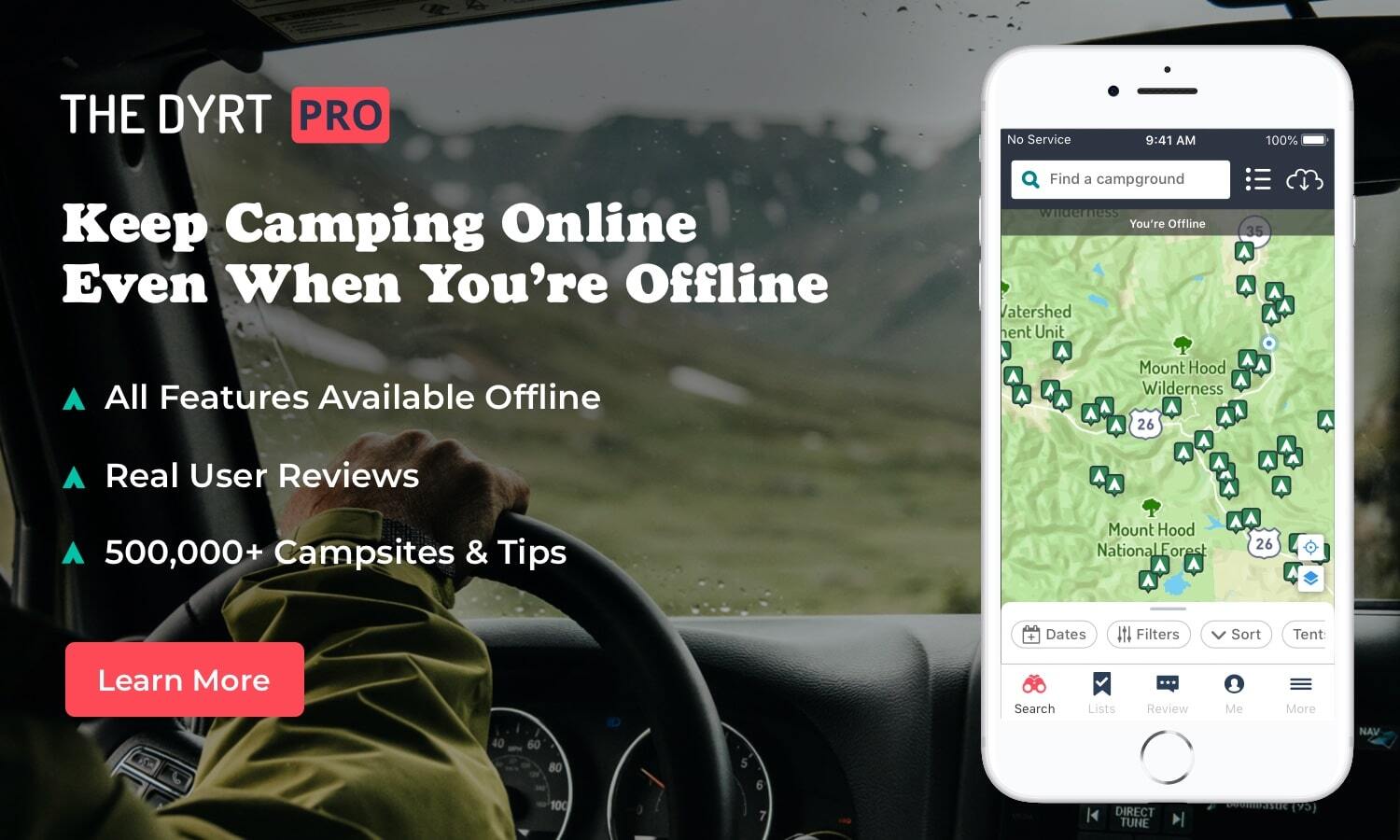
Once you’ve got your RV, the easiest thing to do is decide where you want to go; with The Dyrt PRO , trip planning is made easier. You can download maps, photos and more when you don’t have wifi. It’s a go-to for RV campers and can save you lots of time if you want to find campgrounds on the fly.
2. Take Trips Close to Home to Start
The prospect of taking a long trip to explore lots of new places is tempting, but as a new RVer, you’re still getting to know your vehicle. That’s why it’s a good idea to take smaller trips to get to know how your RV runs and be close to home if there is an emergency or if you forgot an essential item.
3. Make a Checklist for Setting Up and Breaking Down
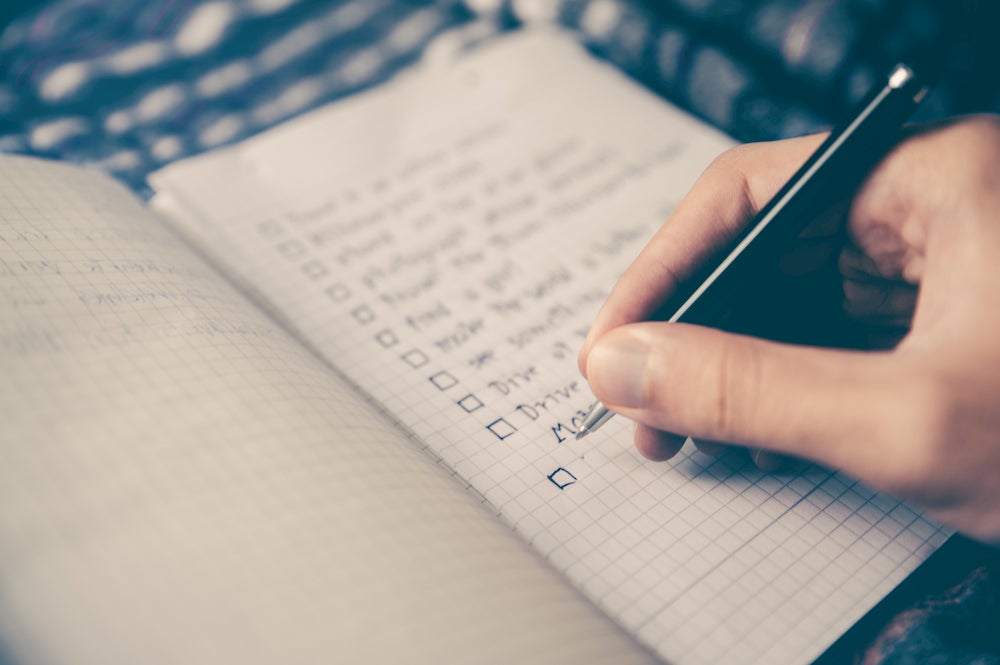
Making a checklist for setting up and breaking down your RV correctly will help you stay organized and ensure that you don’t lose anything. When setting up your RV at a campsite for example, check the site for low hanging branches or big rocks, level and chock the wheels, and hook up electricity, water and sewage. There are lots of other to-do items when you arrive at a campsite like turning the propane on and off or details like putting out your outdoor rug, You’ll get more familiar with your list with more experience.
4. Keep A Notepad in Your RV
This RV camping tip for beginners is simple, but can help you stay organized. Keep track of any repairs the vehicle may need or items to stock the RV so it’s feeling cozy and like home as soon as possible.
5. Don’t Overpack
When you’re going on a long trip, it’s easy to feel like you need to bring everything to maintain your normal life. But keeping it simple can help make your day to day life easier when in an RV. You’ll also most likely be near a store wherever you go, so you can pick things up as your trip goes on and you realize what you might need.
6. Carry a General Tool Kit
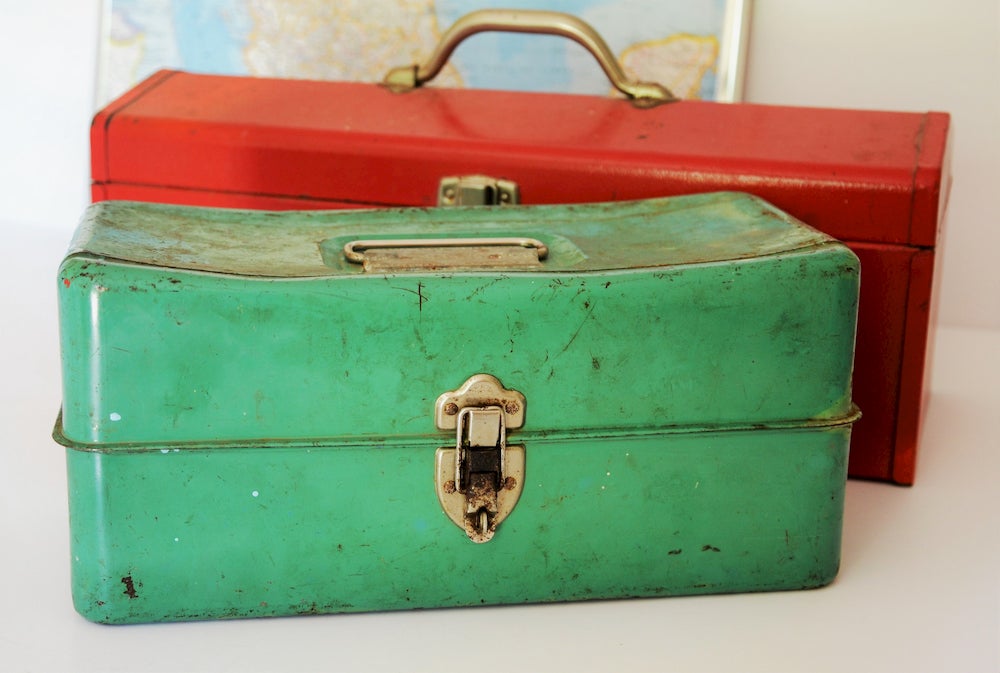
Having a general toolkit is always helpful. Make sure to bring screwdrivers, a hammer, and wrenches. Bungee cords, gorilla tape, levels, a headlap and extra rain gear will also help keep you safe when you need to make repairs or there is an emergency during your journey.
7. Bring Extra Cords and Hoses
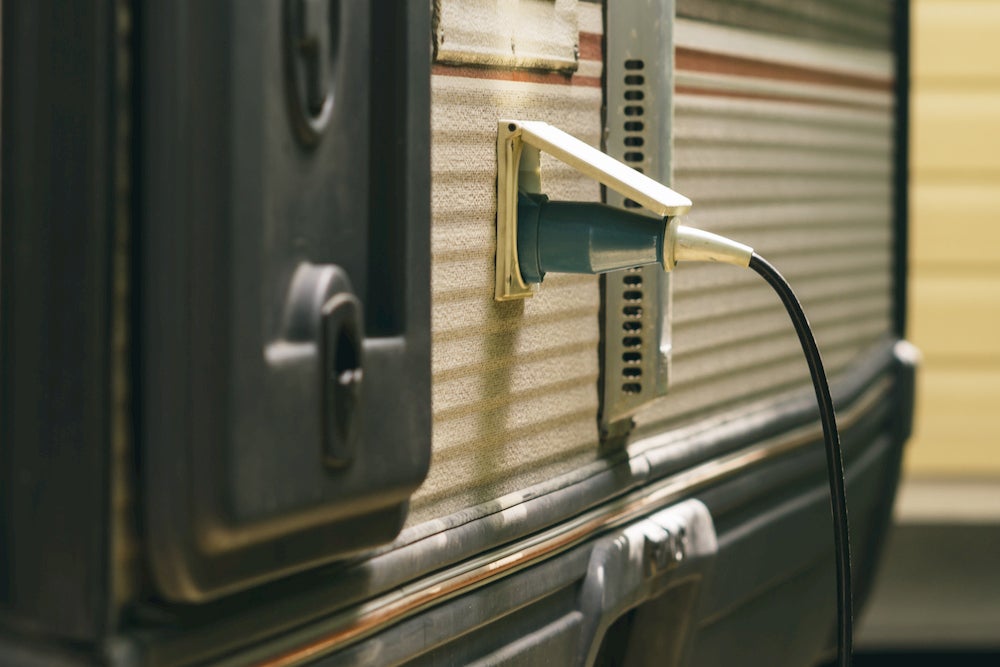
Always have extra hoses and power cords in the instance that something breaks. This can be essential in an emergency or if you are far away from the next town.
8. Think Budget-Friendly
Owning an RV can take a toll on your finances if you’re not careful. Before you buy a bunch of new accessories and appliances for your RV, check around your house for duplicates. After that, try shopping second for items you may need around the RV. Youtube can be a great place to figure out how to repair your RV yourself instead of spending tons of money at the mechanic.
9. Relax and Enjoy
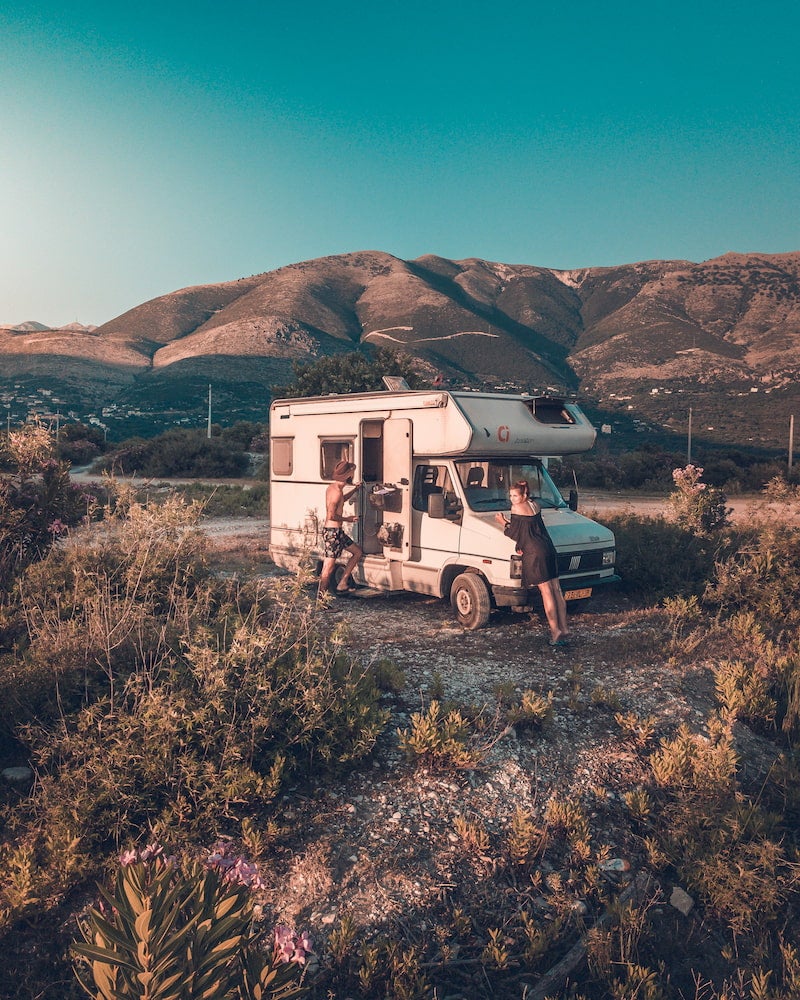
Our final RV camping tip for beginners is to relax and have fun! There are lots of things that can go awry on a trip, so expect the unexpected and roll with it. Make sure to have follow up plans if something doesn’t work out, but remember to keep an open mind while you’re on the road.
Emily Gallegos
Emily Gallegos is a travel-lover, backpacker and is generally curious about all this world has to offer. She grew up in the front range of Colorado where she fell in love with snowboarding, fishing and being outside as often as possible. She has studied Spanish in Spain and Argentina and has written for magazines in Boulder, CO such as Elevation Outdoors.
More Articles
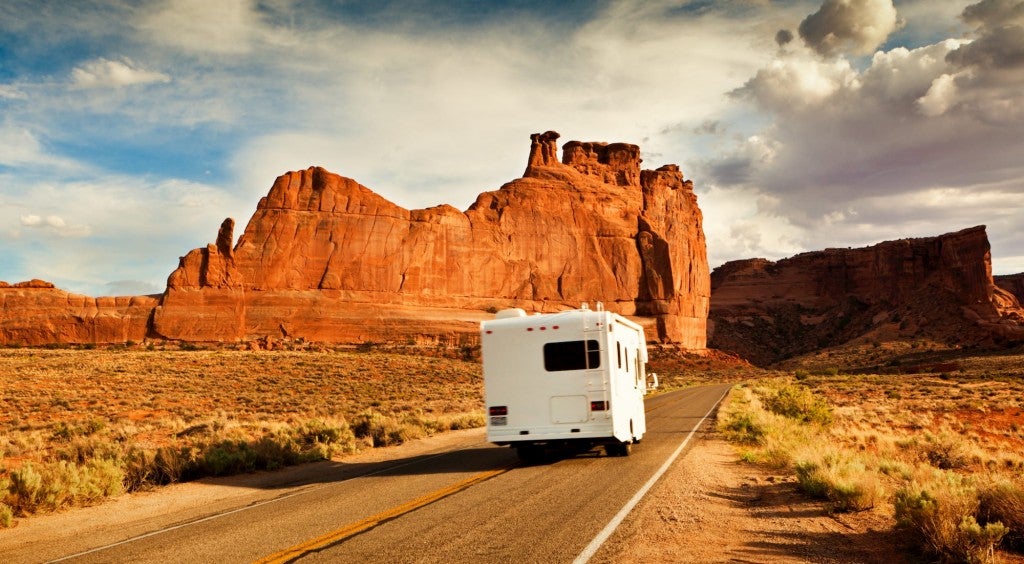
7 of The Best RV Trips For Your Next Summer Vacation
Summer is all about hitting the road with your friends or family to explore somewhere new. As an RV owner, you probably value adventure. The…
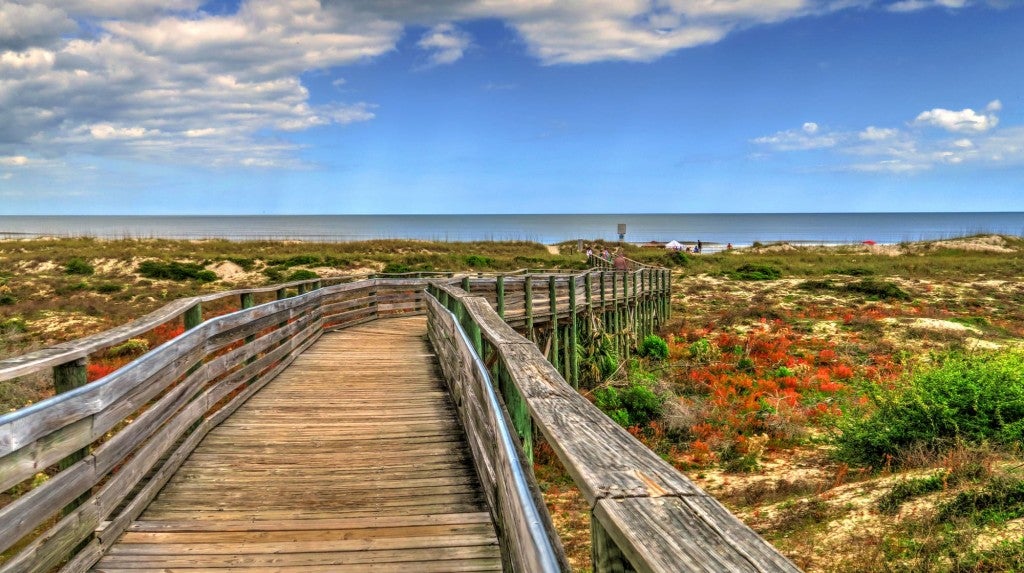
Glimpse Florida's Glittering Coast on an Amelia Island Camping Trip
Amelia Island is a sunny island retreat just 30 miles outside of Jacksonville, Florida. Although it’s one of Florida’s lesser-known holiday destinations, Amelia Island is…

26 Tips For Camping in a Travel Trailer
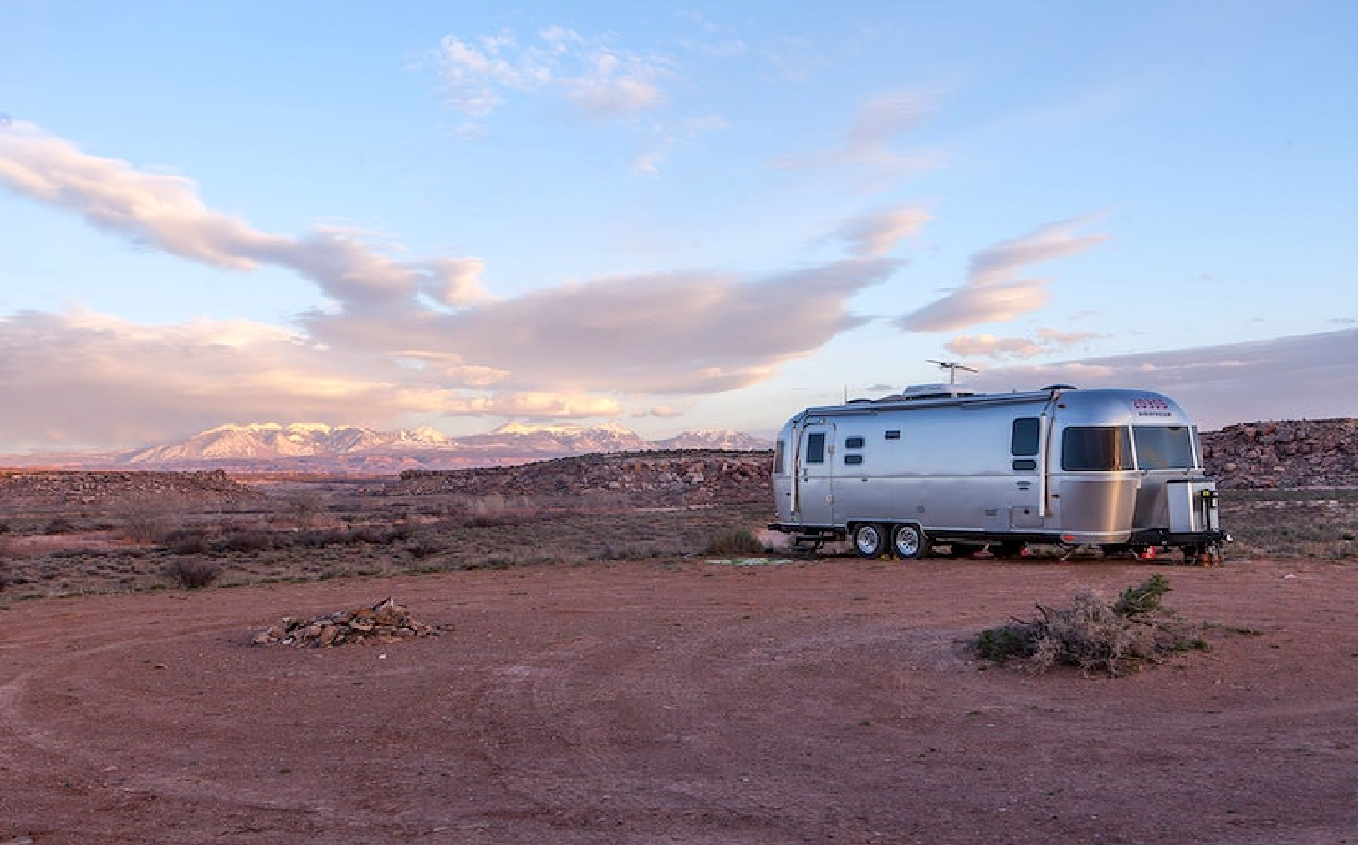
- BEGINNERS GUIDE
Camping is a fantastic way to enjoy great weather and make the most of what the outdoors has to offer.
Camping with a travel trailer is an equally great way to enjoy camping, with the added benefit of being able to take all your home comforts with you.
If you’re lucky enough to own or rent a travel trailer for your camping, you can enjoy the great outdoors without having to rough it. However, there are a few things you need to know to make the most of your camping experience.
Tips for Camping with a Travel Trailer
Here are some tips for travel trailer camping that will help you have a safe and enjoyable trip.
1. Know the minute details of your travel trailer
The more you know about your travel trailer, the easier it will be to have a safe and enjoyable time on your camping trip.
Read whatever manual you can find on your trailer, so that you know how to operate things like the generator, propane tank, and water hose, for example.
Familiarize yourself with all aspects of your trailer and ensure that it’s in good condition before embarking on your trip.
2. Use levelers to make sure your trailer is on level
One of the most important things to do when setting up camp in a travel trailer is to make sure that it is level. This will help ensure that everything inside the trailer stays where it should and that you’re comfortable while inside.
Use leveling blocks or chocks to achieve this. Travel trailers are not like cars, and if you move your travel trailer often, you’ll need to be a little more careful about the process.
First, check for alignment and all the bolts that hold the trailer together. You may want to get a friend or family member to help with this step. Then, put duct tape on the tires and wheels so that they don’t slip on the road.
This can prevent a crash that could be potentially very costly to replace your travel trailer.
3. Clean the travel trailer after every trip
Although you won’t need to clean the trailer before your first trip, once you’ve done it once you will know where everything is and how to handle it.
So, it makes sense to clean your trailer at least once so that you can make notes and ensure that when you do need to clean your travel trailer all the important advice is fresh in your mind.
4. Do not overload
If your travel trailer is weighed down with lots of gear, you’ll need to adjust the tire pressure to ensure that your travel trailer holds up on the road.
When you’re on a camping trip, you don’t want to be worrying about how much you have packed in your travel trailer and whether it’s going to tip over in strong winds or not.
Pack light and enjoy your experience without worrying about whether or not things are balanced right.
5. Take a test drive with your trailer
Before your first trip with your travel trailer, you’re going to want to ensure that everything is in order and you know exactly how it works. You’ll need to load up your travel trailer and take it for a test drive with you (and the family, if you have one) inside.
This will allow you to ensure that no squeaking or banging sounds are coming from anywhere in the travel trailer, alerting you of potential problems down the road.
You’ll also want to ensure that everything works and that all the air conditioning, heating, and lighting systems are working correctly.
6. For overnight stay, check the regulations.
One of the most important things to remember when staying in a travel trailer is that they need to be parked in designated areas. Always check your local regulations on how you can stay overnight in your travel trailer.
Additionally, make sure that you have the correct permit for where you’re staying in your travel trailer and that it will fit into the designated parking area.
7. Double check hookup connections
If you plan on staying in your travel trailer overnight, it’s important to know how to hook up the water and electricity correctly. Most campgrounds provide this service, but some may not.
Check with the specific campground you’re visiting to confirm that you can hook up to these services safely.
8. Plan for temperature changes.
Depending on when you’re going to be traveling, it’s important to prepare for temperature changes. If your travel trailer is air-conditioned, it will get extremely cold once the air conditioning stops running.
This can be dangerous and uncomfortable if you don’t prepare for this change properly and bring along some extra blankets or warm clothes to wear.
9. Check for gas leaks.
One of the most important things to check before your first trip with your travel trailer is any kind of gas line or propane tank.
Make sure that you check these items and any others, like your generator and water tanks, regularly to make sure that they are working properly and there are no leaks.
10. Drive carefully.
When it comes to driving a travel trailer, you will need to be careful about the way you do it. Keep the trailer at a good speed, as this will help prevent damage to your travel trailer and the items inside.
This is especially important if you have children in your travel trailer and they have a lot of toys or games that can get knocked over or broken during a sudden stop.
11. Bring along tools and spares.
If you plan on traveling far or staying somewhere for a long period, it’s important to bring along the tools that you need and extra parts.
You never know when something will break on your travel trailer and if you don’t have the right tool to fix it, you’ll be stuck in a lot of trouble. Bring along all the tools that you’re likely to need for your journey and don’t forget about spares, in case something breaks unexpectedly.
12. Check the tires before driving.
Make sure that your travel trailer tires are all in good condition before heading out on the road. Check the tread, and tire pressure, and make sure nothing is cracked or flat. This way, you’ll avoid any nasty surprises while you’re on the road, like a flat tire.
13. Clear sewer hose adaptor.
You must make sure that there is no gunk or buildup in the sewer hose adaptor before your first journey. This will ensure that you don’t end up with a clogged drain or a swamp in your trailer once you’re on the road.
You don’t want to be cleaning up this mess during your trip, so it’s best to get it out before heading out on the road.
14. Have enough gas and propane.
You should probably check the gas and propane levels once or twice before you start your journey. It’s important to ensure that all your appliances are working, as well as the water pump and the generator.
The same goes for your propane tank, so head over to it once in a while to make sure that it’s full and at least half an inch from the top of the bottle.
15. Don’t remove the yellow blocks too early.
After you’ve parked and leveled your trailer, don’t remove the yellow blocks too early. These are designed to keep your trailer from rolling, so be sure to leave them in place until everything is secured.t.
16. Invest in a trailer fire extinguisher.
You never know when you’ll need to put out a fire in your travel trailer, especially when traveling on a long trip. It’s better to be safe than sorry and invest in a trailer fire extinguisher that you can use at any time.
17. Keep common electrical items handy.
You don’t want to have any problems with electricity while you’re on the road, so it’s best to stock up ahead of time and make sure that the power is working properly before heading out on your journey.
18. Know how to safely tow your trailer.
If you’re traveling with your travel trailer, it’s important to know how to tow it alongside your vehicle. This can be tricky and it’s best to check with the manufacturer or a trailer tow-truck shop ahead of time.
19. Switch off all appliances when you park up for the night.
It’s best not to leave any appliances on when you park up and switch everything off, including your refrigerator and heaters, before going inside for the night. This will help to keep the temperature down and the place nice and cool.
20. Take some time out of your journey to get rid of road dust.
Road dust is one of the biggest causes of dust in a travel trailer and it can affect your overall health as well as contaminate everything in your trailer once you start returning home from your journey.
Ensure that you take some time out to clean yourself and shake off as much of this dirty stuff from your eyes, mouth, and clothes before you head out on the road again.
21. Check your trailer regularly for any leaks or damage.
It’s important to check on your travel trailer regularly as it doesn’t take much damage or leakage to make your trailer feel damp and uncomfortable.
Check the roof and the floor, as well as the ceilings and undersides of the walls, for any leaks before you head out on your journey.
22. Watch out for highway patrol officers.
It’s important to watch out for highway patrol officers if you’re planning on traveling over long distances or staying in one place for a long time. They are often on the road to check for any drivers who appear to be under the influence or intoxicated, and if you get pulled over by these people, it can be very expensive and you may even lose your license.
23. Bring along a first aid kit.
You must bring along a first aid kit when you’re on the road with your travel trailer. If anything does happen, it’s good to be prepared and know what needs to be done in case of an emergency.
You should make sure that you are familiar with all the components of the kit and know how to use them.
24. Remember to have an automatic leveling jack.
An automatic leveling jack is one of the best additions you can make to a travel trailer, as it helps to ensure that the trailer is safely and properly leveled every time. This way, you don’t have to worry about anything being damaged or broken on your journey.
25. Leave no trace.
When camping in a travel trailer, be sure to practice leave no trace principles. This means packing out all of your trash and leaving your campsite as clean as you found it.
Do everything you can to avoid leaving any dirt, leaves, or unwanted trash behind when you’re on the road. You must be as respectful of the environment as you can when you’re traveling with your travel trailer.
26. Always refuel your vehicle with a full tank of gas.
The most common cause of travel trailer breakdowns occurs when someone accidentally runs out of gas while they’re on the road and this causes them to be stranded in some dark, dank area on a lonely stretch of highway.
Make sure that this never happens to you by always refueling your vehicle with a full tank of gas when you’re on the road.
Travel trailers are great for many different reasons, including the fact that they can be easily transported in a car or truck and they’re much easier to tow than larger RVs.
These travel trailers are also easier to operate and maintain, which means less work for you and more time spent enjoying your journey. When camping, you can do your cooking, cleaning, and sleeping without having to worry about the structure or functionality of the trailer.
By following these tips, you can ensure that you have a safe and enjoyable experience while camping in a travel trailer. Be sure to practice safety first and always follow campground rules to avoid any problems. With a little planning and preparation, you can have a great time on your next camping trip.
You Might Also Like
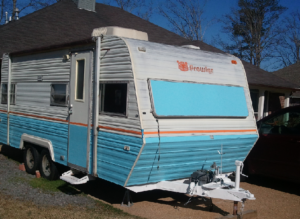
Buying a Vintage Camper Trailer 101 – Beginners Guide

How To Keep Mold Out of RV Refrigerator
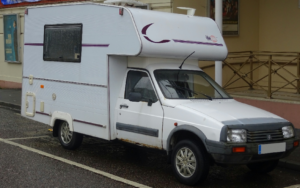
Ultimate Guide to Small RV Rental
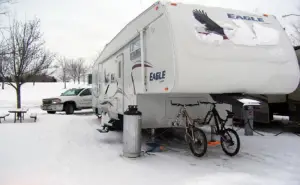
9 Tips for Towing a Travel Trailer in Snow
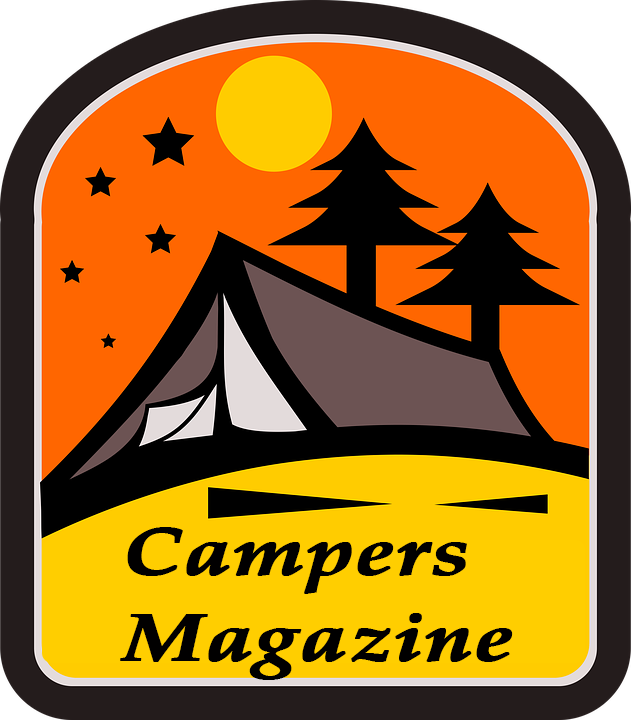
- BEGINNER INFO
- CAMPER EQUIPMENT
- PRODUCT REVIEWS
Travel Trailer Camping Tips: Top 17 Points of My Best RV Camping Guide
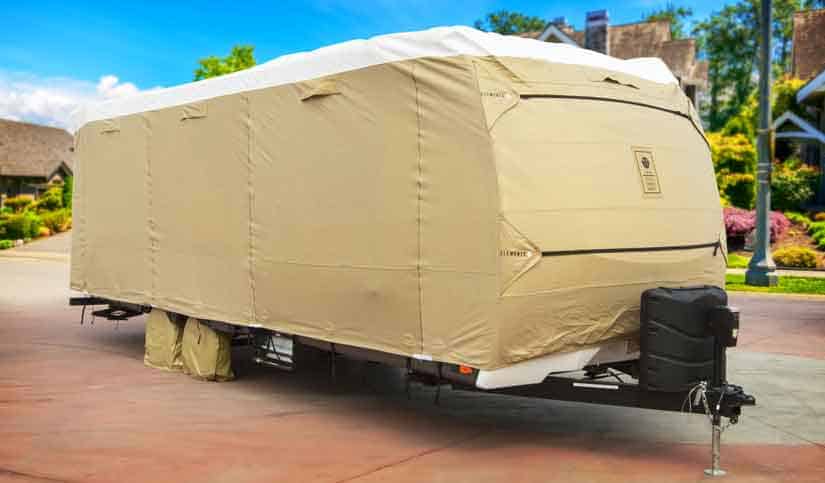
Camping seems easy and simple at first sight, especially when you first go with someone experienced, who is already using all the travel trailer camping tips.
Most of the time campers start with tents and then upgrade themselves into RVing enthusiasts using RV camping guide. Someone experienced can do both easily. The switch works just fine.
However, for a newbie it will take some time and practice of camper trailer tips. Of course, having an RV camping guide will only serve to good.
Camper trailer tips are not just for those who want to go camping on a trailer. This includes RV drivers as well. There are slight differences in approaches to RV camping tips.
The problem, most of the time, with RV drivers is that they don’t even know themselves what is the information from travel trailer camping tips that they are missing.
The very first RV camping guide I can give is to get a travel trailer checklist and start packing accordingly. The rule is that however you start with the packing is the way you will go on with your trip.
RV camping tips: before the trip make sure you know at least the basics of driving an RV
Vehicle tools and parts are essential to have during the trip: travel trailer camping tips, rv camping guide to camp in your driveway or back yard with your trailer, several packing rules and camper trailer tips you would have to consider as a beginner, try to do with no water in the camper: rv camping guide, be prepared for various outlets: camper trailer tips, travel trailer camping tips: be careful with overloading your camper, tank dumps should be planned ahead of time: rv camping tips, travel trailer camping tips 101: make sure to reserve your camping spot at any campsite way in advance, rv camping tips on not being locked out of the campsite, rv camping guide for night setups, rv camping tips for being a good driver and getting used to a new camper, pay attention to brakes, camper trailer tips: forget about oversteering and fishtailing, rv camping tips on protection of camper electronics, travel trailer camping tips: rv camping guide to stabilization of the trailer, travel trailer camping tips for when arriving home.
Driving an RV or any other huge vehicle is relatively different than driving a regular car. Usually, families get quite nervous when hitting the road for the first time.
As a driver, you should feel totally comfortable when driving an RV. Once you do so, the passengers will feel more relaxed and there will be no tension.

Everyone, who is in the camper, including children and pets need to be aware of RV rules. This will ensure the driver focuses solely on the road and drives calmly.
The main difference, which is very obvious, is that the vehicle is taller and wider. Therefore, I recommend stating practice at open areas.
Try to watch and examine how the vehicle moves in general. How sensitive the wheel is, how much you should press the gas and brake pedals and so much more.
There are, in fact driving classes for RVers. You can take several classes just to feel comfortable with the instructor next to you. This way it will be easier to adapt to the large vehicle.
Knowing the vehicle from head to toe is critically important. Once the sun sets, and you start driving in the dark, there is no way you can find anything if you do not know where they are in advance.
When I say you should pack parts and tools with you, I in no way mean that the camper should be full of parts and become a store on wheels.
RVing is about escaping the everyday routine and reality. However, the further away you travel, you should keep in mind that you are just that much relying on yourself when it comes to your camper.
Car services are not everywhere you want them to be. Therefore, be prepared to get your hands dirty when needed.
This might be the most fun time for your family. Moreover, this test will reveal the true readiness for camping in a real RV to a real campsite.
All you need to do is to just pretend you are in the middle of nowhere, camping all together. A whole day and the night should be spent in the trailer, or near the trailer. My camper trailer tips are not to go into the house.
This is in order for you to see if you have done everything correctly. Is everything packed? Are there enough extra blankets? Coats? Food? Everything?
This will help you out in creating your own camping list, along with camper trailer tips. All you need to do is just write down everything you have already packed and add each item you go and get from the house or the garage to that list.
This will make the ultimate camping checklist for your own family. Each and everyone’s needs are different. By defining yours, you will make the trips more enjoyable and fun.
As a result, you will feel comfortable and confident for taking your first trip with your RV, using all the travel trailer camping tips. Campsites are the first stops for everyone. These places are somewhat equipped with certain facilities, which will make your camping easier.
However, once you get the rhythm and understand the logic, you will fall in love with boondocking. It will take you hundreds of miles away to unknown and unexplored lands.
There are various types of RVs. They are of all heights, widths and sizes. You can have a tiny model, such as a teardrop and a huge motorhome, which sometimes can exceed in sizes an average apartment.
However, this in no way means that you need to over-pack your camper just because you have extra storage place.
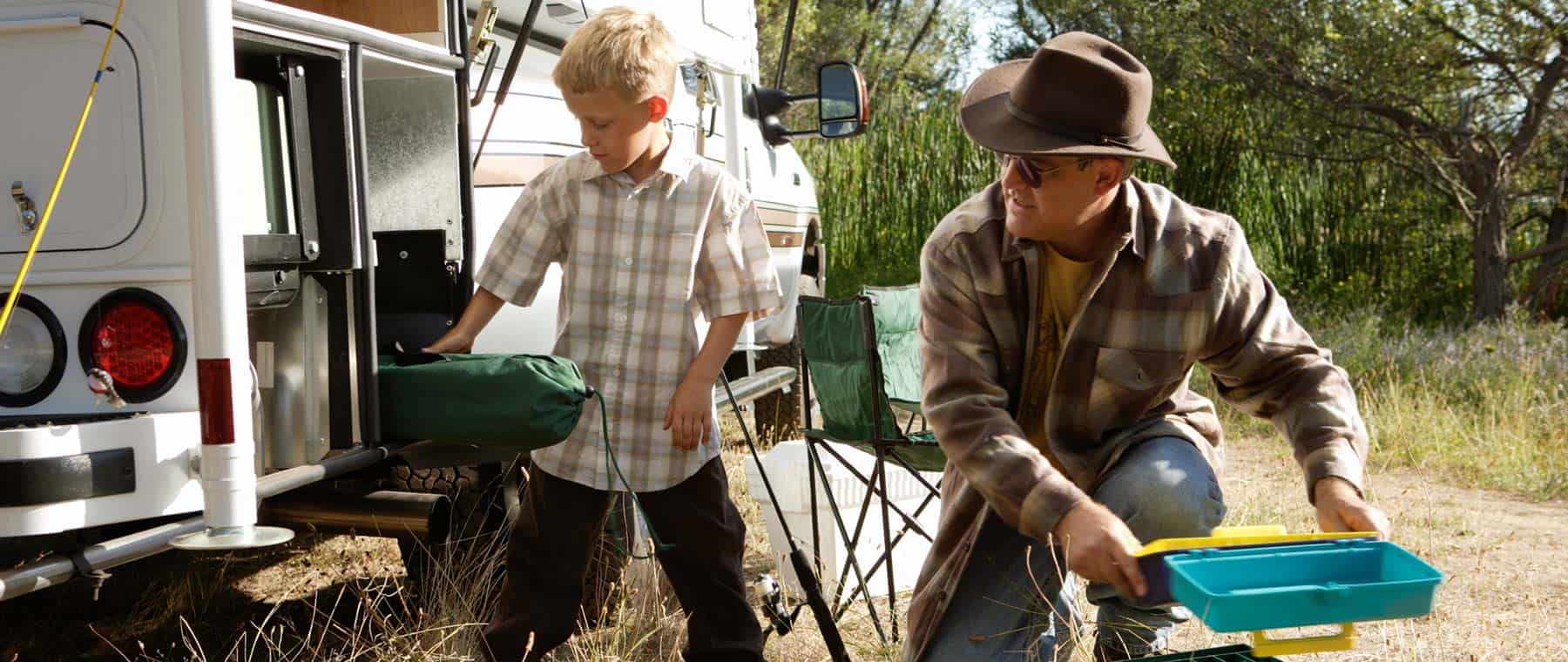
I understand the urge of buying all the cool accessories for your camper. You want to be equipped with the latest technology and gadgets.
However, this is going to be a problem for you. Packing the first necessity things and organizing them in a way that you do not feel that the RV is packed is the key to successful packing and smart RV camping tips.
Once you are a somewhat experienced driver, you can buy some accessories and enjoy their assistance during your camping.
When we think of packing food and drinks, water is not included to that list. The main reason is that it is very heavy and makes transportation harder.
My RV camping tips include trying to avoid full tanks of water in your camper. You can, of course take several bottles for drinking on the way. However, if you travel to a campsite, there is a filling station, where you can get fresh drinking water.
Moreover, there are hookups at parking spaces. So, you can connect the hose and have water at your disposal.
These camper trailer tips refer to both gray and black water tanks. Driving with empty tanks will save you huge amounts of fuel and money. You will not have to carry extra weight.
The case is, of course, different when it comes to boondocking . However, this is not something you would want to do as a beginner.
RV electronic can be really unpredictable. You can never know which outlet adapter will you be needing. Campsites do not have a general standard.
Therefore, as travel trailer camping tips go, you should get information about electrical outlets that exact spot at the campsite that you have reserved for your trailer has to offer.
Most of the time, the campsite will offer three different outlet voltages. You may think that if this is so, there might be only 3 types.
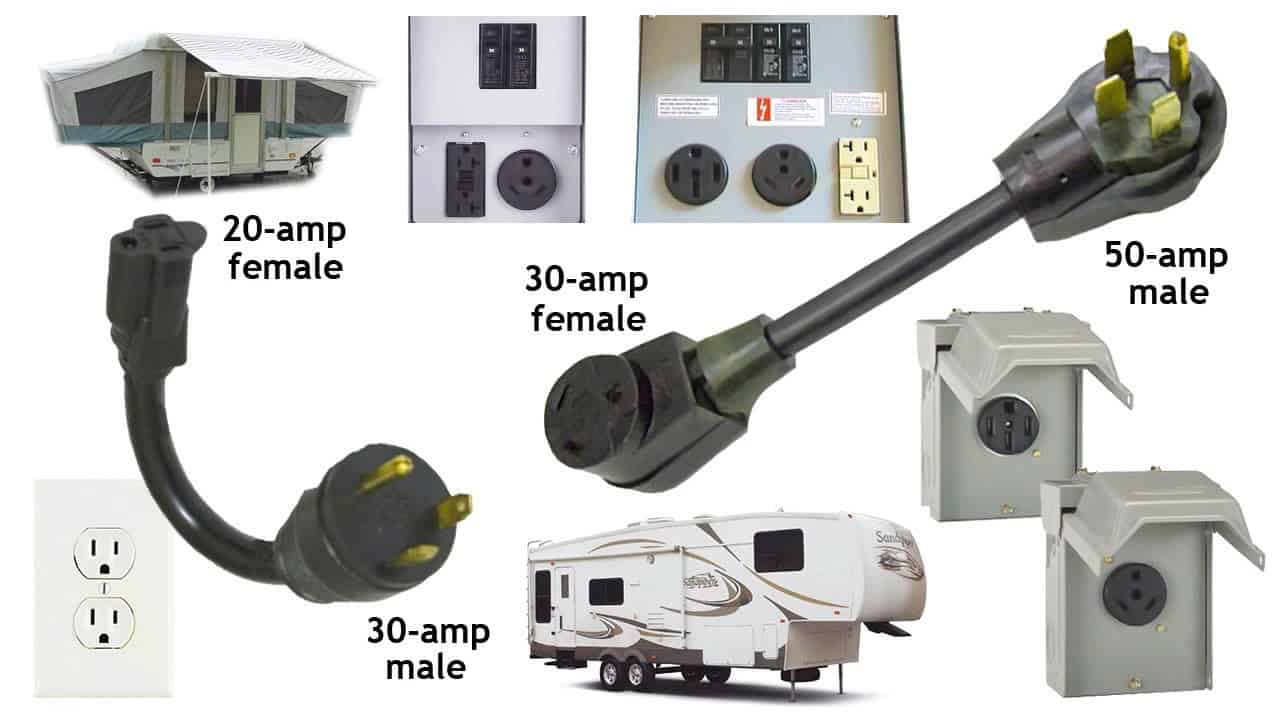
However, be attentive to my camper trailer tips. This is not even close to the reality. Depending on the size of the camper, you would have to deal with the following voltage plugs.
Very small campers have 110volt and 15 ampere plugs. A little bigger ones, to medium size have 30 ampere plugs. This is not the definite number, however.
In the case of large campers, you can see 50 ampere plugs.
Regardless of the voltages, campsite receptacles can require various adapters, in order for you to be able to connect your electronic devices.
It is similar to flying with an airplane for the first time. You pack everything you see without even thinking of the weight of your suitcase.
RV camping tips have a special approach to such issues. Each trailer comes with a specific weight limit. You should never, ever exceed that limit.
It is not just to save fuel and money. The question is with your safety and the safety of all those who are in an overloaded camper.
Luckily, every truck stop has a scale. Before going on a trip, drive there and weight your already loaded trailer.
There are two types of capacities for your camper. The first one is its own weight, if the camper is also a driving vehicle. In this case, you need to consider solely the weighting number of the vehicle itself.
However, if your camper is a towing trailer, there is the towing capacity of your towing vehicle. This means that there are two numbers for the weight: one is for the trailer itself and the other is the towing vehicle capacity.
Depending on the campsite, you may have the option of filling your camper with fresh water and emptying the tanks yourself. Alternatively, you would have at your disposal all the necessary hookups.
This brings up camper trailer tips of having all the necessary equipment ready for all kinds of situations. Dumping the waste tank is extremely important.
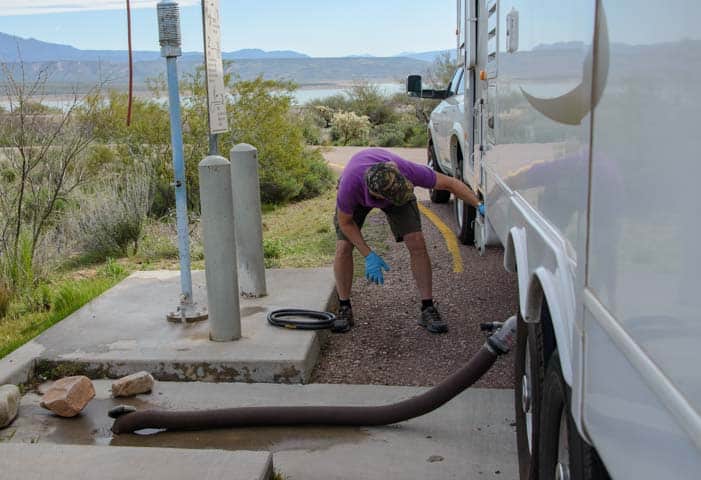
You cannot leave it all inside the tanks. The will simply ruin the material and you will be left with a leaking waste tank.
RV camping tips that newbies appreciate is not to forget to include the dump gloves to your camping checklist.
Campsite reservations are crucial when it comes to having a good camping experience. The further in advance you reserve a spot, the better insurance you will have for everything to be perfectly intact.
There are several thing you would want to confirm when making your reservation. Questions like check in and check out time are very important.
Good camper trailer tips are to know in advance if the campsite has quite hours. If it is the case, make sure to find out what are those hours.
Additionally, find out about the power, water and dump amenities at the campsite. Having hookups will make your life easier. You will be free of the obligation to go to a station and do all the procedures there yourself.
In certain campsites generators are banned. This is for various reasons. First, generators make noises and some campsites have rules about being quite.
Almost all trailer parks have regulations for RV sizes. Travel trailer camping tips all recommend knowing those regulations in advance.
During your trip, you will gather much trash. Therefore, you will need to know where the receptacles are for the trash.
If the campsite you are travelling to has bathroom facilities, make sure to know exactly where they are. You can never know how urgent will you be needing those.
I have had the problem of not knowing in advance if the campsite is pets allowed. I always travel with my dog and had to take off before even parking.
No matter how well-prepared you are for the food and drinks, there is still need to find out if there any food supplies nearby.
Having a campsite map will make your moving around easier. Some RV camping tips can depend on the campsite regulations and rules.
Therefore, make sure to read those rules and follow them.
Travel trailer camping tips also suggest having all the documentation regarding your reservation printed and in somewhere inside the camper.
My RV camping tips also include getting a transparent folder, which will be your travel document section. This is the perfect spot to keep all the paperwork for the trips.
When I say that camper trailer tips regarding timing are important I seriously mean it. Of course, certain campsites are open during all day and night.
Nonetheless, there are campsites, which have quite hours, or they close at a certain time. With that being said, it is not possible to neither enter nor exit those campsites.
Therefore, travel trailer camping tips mention clearly that you need to know those hours in advance. Otherwise, you might have to spend the night outside.
Not even experienced campers are fully able to setup their camping facilities during the night, when it is already dark.
Therefore, good camper trailer tips mention the need to arrive early. This will give you several privileges. First, you would be able to setup during daylight, without anyone bothering you.
Second, you have the day to yourself and will have plenty of time for all the activities you have planned. You will not have to waste time on setting up during the day.
Additionally, my camper trailer tips include replacing all you RV lighting with LED bulbs. This will ensure you have great lighting when needed.
Whatever trailer you have set your eyes at is available for rent. Most campers are too enthusiastic about buying their first trailers.
Therefore, many struggle with their first couple experiences. As a result they are either sure that it was a mistake, or they simply get in accidents because of not being used to the size of the car.
Therefore, the smartest decision would be to rent that exact camper you are planning to buy for at least 4-5 times. Before you get used to driving the rented one, do not rush into buying one.
Moreover, it is very possible that you might even not like the model. You may also dislike how it feels to drive it. The suspension might be uncomfortable for you. Simply the driver seat might feel wrong.
If you are planning to buy a trailer or you already have one, which can be used as a towed vehicle, there are certain nuances to be extra attentive to.
There are these things called travel trailer brakes for towed campers. These features are extremely important for when it comes to safe driving.
You may never know what situation might force you to brake abruptly. Therefore, keeping low speed is the number one obligation as a driver of the towing vehicle.
Additionally, the camper will shift forward every time you press brake on the towing vehicle. This is simple physics.
These camper brakes make the inertia reach to the minimum and prevents the trailer from shifting outward.
Nonetheless, keep I mind that these brakes are in no way connected to the towing capacity. All they do is just make the handling of the trailer relatively easier.
Because of the driving surface, the camper can lose traction. Therefore, it is important to be extra careful when the situation forces you to oversteer.
Besides the traction, you might have uneven weight distribution. This is probably the most common reason for fishtailing and oversteering.
Fur such reasons, there are travel trailer camping tips on weight distribution systems. The problems occur, most of the time, for heavy trailers, which are being towed.
In the case of smaller size campers, such as a teardrop, and a heavy towing vehicle, such as Ford pickup, there will be no need for weight distribution systems.
Nonetheless, there are areas, such as the countries of the EU, where having the weight bars is mandatory. This law is to prevent unnecessary accidents.
RV camping guide is about knowing what exactly do you have in your vehicle and how exactly you should be using it.
Camper refrigerator, for example, works with liquid ammonia. The gravity does its work and the fluids go wherever needed, without the evaporation tube being accumulated.
With all this being said, camper trailer tips strongly recommend parking on a flat surface. If here are any bumps on your parking spot, make sure to cover them with either sand or rocks.
The result should be your camper being parked on an ideally flat surface. You can use a level in order to make sure you are parked evenly.
After the previous point and after parking on a flat ground, after measuring to make sure you have done everything correctly, the next step is to stabilize the trailer.
RV stabilizers have nothing to do with leveling. If you have done the leveling incorrectly, the stabilizers will fix the wrong position of the camper.
The very first step with camper trailer tips is to unhook the towing vehicle from the trailer. This will give you two privileges: the first one is having a car, which will drive you around the campsite and out of its premises; the second one is that it will ease the process of stabilizing the camper.
All campers come with four stabilizers. Each wheel has its own. With these travel trailer camping tips you can freely move around the trailer, without it being moved.
There are two types of jacks: electrical and manual. A smart RV camping guide would suggest an electrical one. However, you might be so loaded that you would not want to add some extra weight.
In this case, my RV camping tips suggest that you get a drill to facilitate the adjustments of the stabilizers.
Provided you have followed all the above mentioned travel trailer camping tips, there will be no need to unpack and take all the stuff out of the camper.
Just keep in mind that you will have to pack all the necessary items again, for your next trip. In most cases there really is no need for that.
According to my RV camping tips, you would just take out the dirty laundry. Being smart is the key to successful camping.
Therefore, act smart about using your time and effort accordingly.
Nonetheless, emptying all the necessary tanks of the camper, using the techniques of my RV camping tips, should be done with absolutely no excuses.
Campers Mag is the website where I will share a lot of information about my experience, trailer, and things, that will help other camper owners to enjoy their RV even more.

Save my name, email, and website in this browser for the next time I comment.
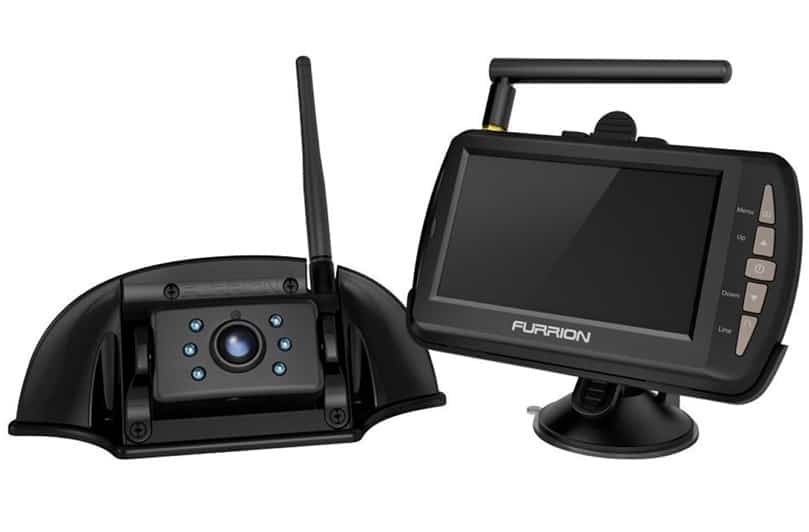

Travel Trailer Tips For Beginners: Guide To RV Camping
by Glynn Willard | Nov 26, 2023 | Fulltime RV Living , RV Fulltime Prep | 2 comments
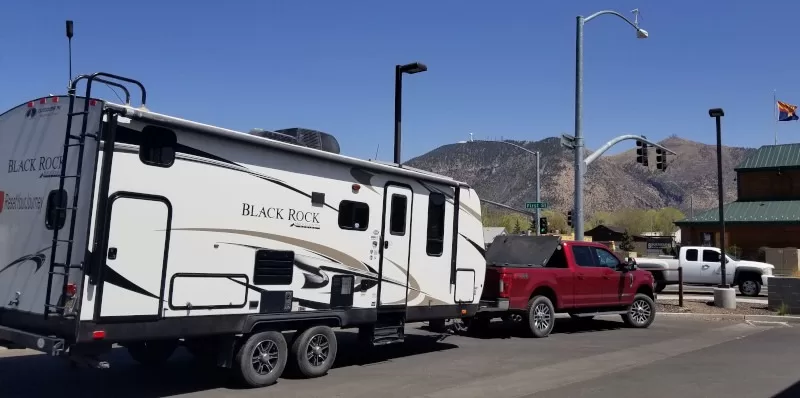
Last Updated on 04/07/2024 by Glynn Willard
Your Blog Post with Divi-Style Box
Is this your first time diving into the RV lifestyle?
Or are you a new RV owner and this is your first RV trip?
Before you can safely embark on your first trip or first camping trip, it’s a good idea to review some of these RV tips.
Honestly, these tips are not just for RV beginners. Those with some time under their belt can also benefit (or even add to the list).
Also, this article is not just for people towing travel trailers, it’s for any RV beginner.
It’s amazing how easy it is to make mistakes when you’re under pressure. Add inexperience to the mix and the mistakes are amplified.
Even though new RVers researched, watched countless YouTube videos, practiced and mentally went over everything “RV”, they can still make mistakes. We certainly did!
Some of these mistakes are more difficult to correct than others. but, you’ll likely not make the same mistakes twice.
Here are some mistakes we made and learned the hard way as well as some of the best tips we’ve picked up during our endless road trips.

Boondocking north of Ouray, CO
Mistakes We Made With Our First Travel Trailer
Not completely packing the rig the day before our travel trailer camping trip.
We had our lists. We had our RV essentials and necessary RV equipment in piles separated by location. And we had good intentions.
But, that wasn’t enough!
Oh yeah, no problem, the important thing is we can still easily leave by 10 or 11 AM. Ha! Wishful thinking!
More like 2:30 PM and we were rushing. What happens when you rush?
You forget things and make mistakes! And we forgot a lot and packed too much weight.
So, pack the rig the day before, connect the tow vehicle/toad and then pack a night bag with essential items for an overnight in the house.
Especially if it’s a new rig and you’re getting to know all the small spaces and storage space.
Oh, and there’s no need to pack the sleeping bag since your rig is equipped more like a house.
While I’m on the subject, we packed a heavy Camp Chef camp stove and extra propane tank. It was so inconvenient to set up, we almost never used it!
Regardless, you’ll remember ten things you forgot while you’re preparing to sleep.
And most importantly, you won’t rush to your first destination.
Which leads me to the next point.
Trying To Cover Too Many Miles In One Day In An RV
I like to drive slowly and under control. When you’re towing a heavy trailer or driving a heavy rig, bad things happen at high speed on the open road.
As far as I’m concerned, my speed is something of which I have full control.
Why increase my risk, my family’s risk and other driver’s risk just to cover more ground?
What’s the rush for anyway if you’re full timing?
Even if you’re not full-timing, the best way is to leave on time and take your time.
So, I use the following guidelines:
- The maximum mileage I’ll drive in one day is 280 miles. That’s my personal comfort level.
- I leave at a time that allows me an arrival time no later than 3PM. Remember, you still have to find level ground and set up in RV parks before settling (or find a boondocking spot). The best times to leave are several hours before rush hour or right after rush hour ends. Unless you’re in a really rural area, of course.
- We prepare lunches, pack incidentals in the truck and clean the rig the day before leaving.
- Have a meal plan for that evenings dinner already established for moving day. We always ate tuna packets and frozen vegetables on moving day. I realize this is not appealing to most, but it was easy.
- I check tire pressure and do maintenance the day before.
- I check the weather and map the route the day before departure. Driving on windy days is not a smart move.
Moving While Living Full Time In An RV Too Frequently
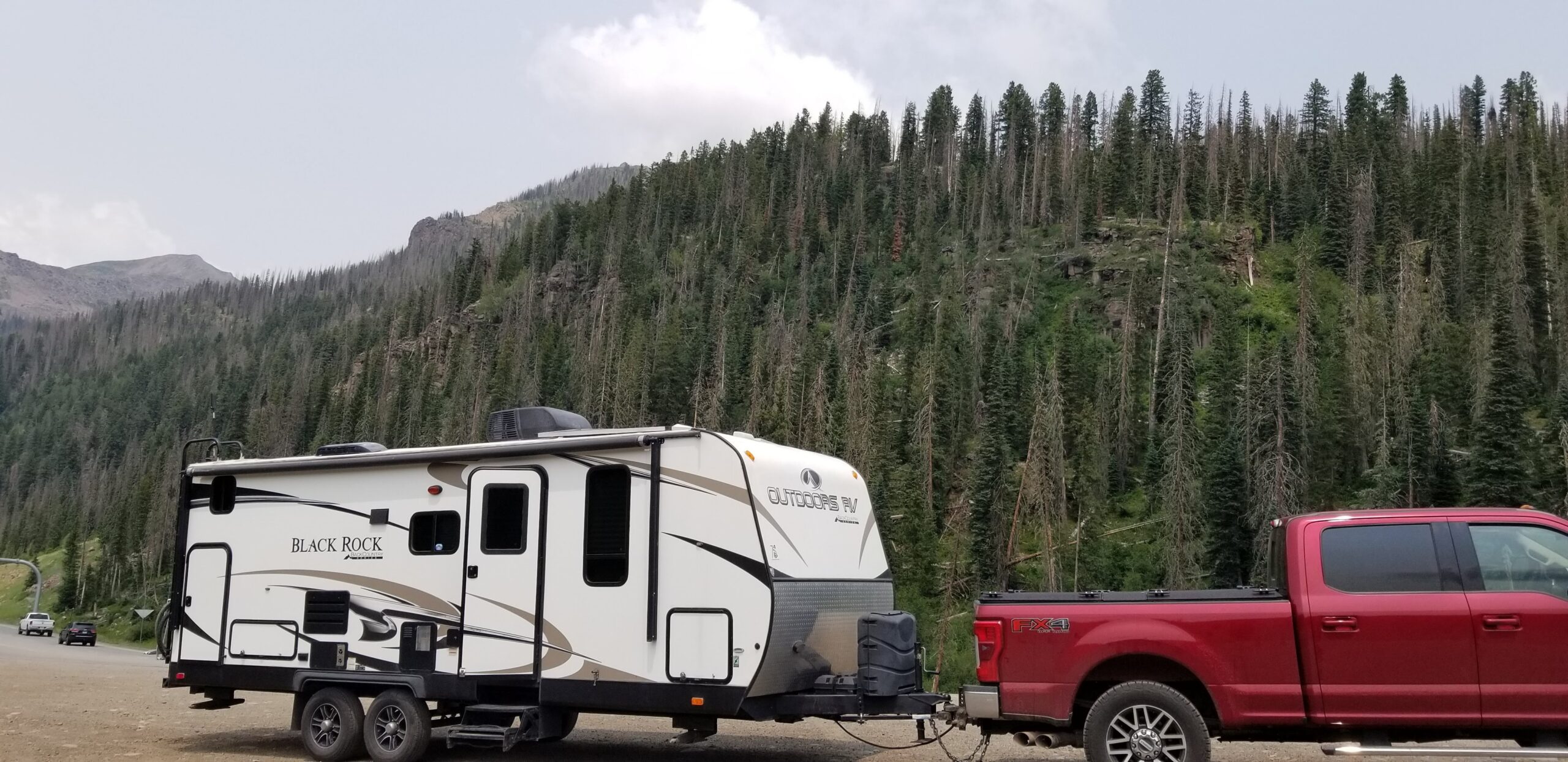
That’s a minimum if you’re full-time.
At some point, you have to recharge your own batteries!
Initially, over time, we found four to five days of stationary to one day of moving to be very doable.
But as time evolved, we preferred to stay six to ten days in one location.
It gives enough time to explore the local attractions.
There’s enough time to get school work, regular work and laundry done.
And finally, it leaves enough time to do preventative maintenance on the rig and tow vehicle.
Never disregard the preventative maintenance aspect of your travels!
In addition, moving every 6-10 days is frequent enough to cover a lot of ground and see more of the country.
There’s also a lot to be said for staying put a month at a time to lower your “lodging” expenses. But we’re not full-timing to stay put.
We want to experience new things and meet a lot of people.
So, again, we’ve found six to ten days of stationary to one day of moving to be our most comfortable pace.
Draining Your RV Batteries
Yeah, I’m guilty. We don’t even have lithium batteries and I drained them on the first night out. I was a total RV newbie!
We got a late start, I was exhausted and it was really cold outside. So, naturally, I finished setting up and used the furnace.
Awesome, we have 60 pounds of propane! Well, you have to have some form of electricity to run the fan.
And it doesn’t take long for the heater fan to draw down the batteries.
I knew this. But I was so exhausted and overwhelmed that I thought nothing of running the furnace fan off the batteries. It didn’t take long to drain our two batteries.
So, on day one I shortened their lifespan and limited their capacity. Again, they’re not lithium.
I learned very quickly (the hard way) how to balance our energy consumption. Initially, it was a steep learning curve.
But it didn’t take long to figure out how much power each family member required and budget accordingly.
If you’re a beginner RVer, make it a point to learn the amperage draw from your appliances, devices and fixtures.
Then make a mental note of what you can and cannot run off the batteries before fully draining them.
Running Out Of Water
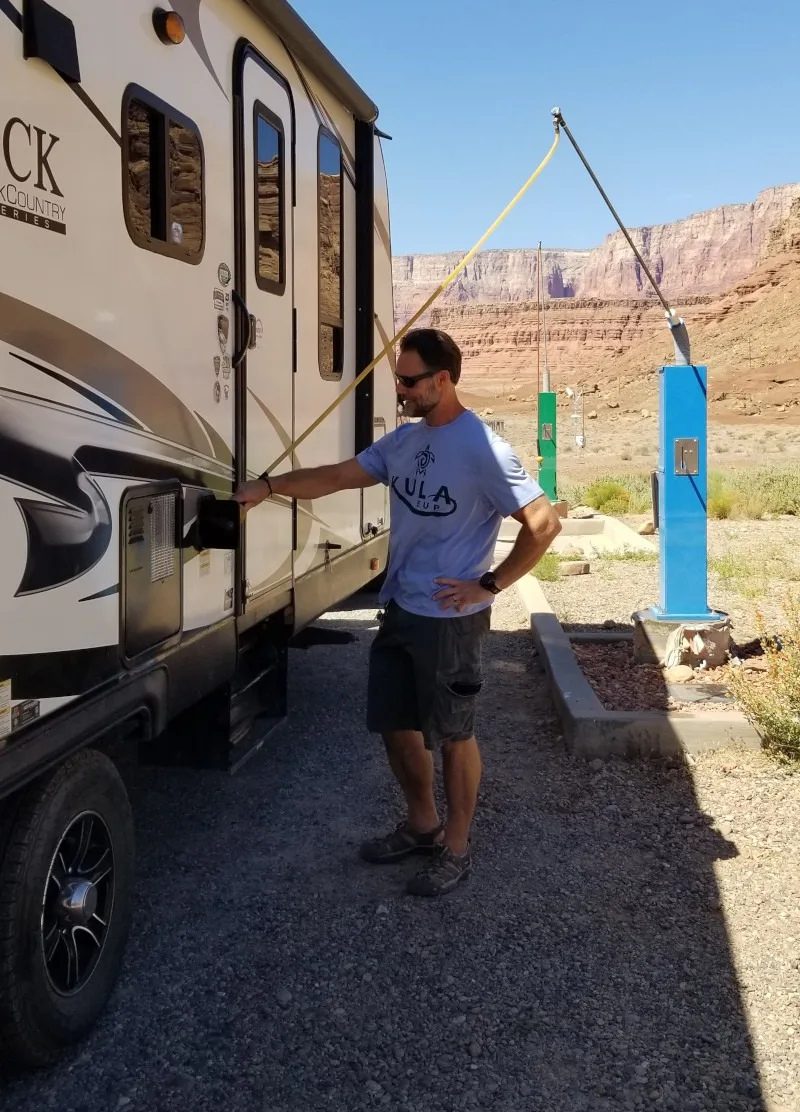
Dump station at Lee’s Ferry, AZ
Nope, not enough.
We ran out just after dinner on our second night out.
Fortunately, we were staying at a Harvest Host’s/Boondocker’s Welcome distillery.
And they were kind enough to allow us to fill all of our water bottles to hold us over until we found a place to fill our fresh water tank.
However, there was no way to fill our tank there, so we had no water for dishes or personal hygiene until our next location.
Not a big deal. Just more of an annoyance.
On a side note, most gauges on RV’s for the fresh water tanks, gray tank and black tank are rudimentary and lack accuracy.
If you haven’t yet experienced this, you soon will.
So, knowing how much water you and your family consume in a day is a good starting point.
Calculating your water usage will likely take months on the road before you have this system perfected.
When calculating your total cargo carrying capacity, make sure you take into account, a full freshwater tank and stay within your gross vehicle weight rating with all of your stuff in the RV.
Be careful! It’s easy to carry too much weight.
This video was one of our earliest. Please don’t judge. They improved a lot!
Beginner RV Tips
Practice maneuvering in an empty parking lot..
Regardless of whether you have a new travel trailer, fifth wheel, or motorhome, learning the complexities of a towable RV or large motorhome in a safe space is essential!
That even applies to pop-up campers if you’re new to towing.
Use a moving day checklist for your RV.
Using a checklist when you’re moving your RV can help prevent mishaps, especially when you’re new to the RV lifestyle.
Check your tire pressure daily.
Get into the habit of doing this! When you’re towing that much weight (not just larger trailers), one of the weakest links in the chain is your wheels. Part of your “RV basics” is to stay on top of your tire psi to prevent accidents.
Torque the lug nuts on all wheels every second move.
Pack the basic tools for your type of rv in your rig..
When it comes to any type of RV (fifth-wheel trailers, toy haulers, bumper pulls, vans or motorhomes), a lot of things will break while you’re traveling the great outdoors.
Check your tire wear, suspension welds and axle appearance daily.
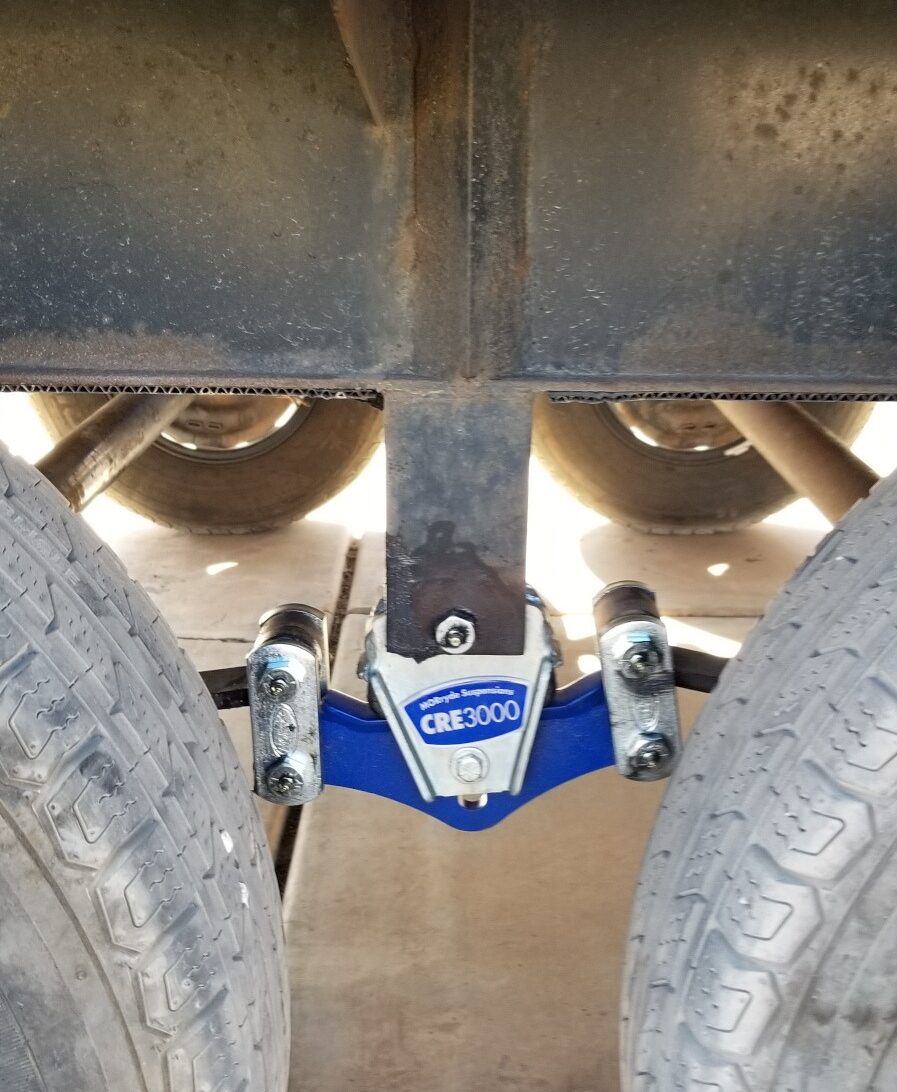
Grease your Zerk valves on your suspension.
If your rv is towable, clean and lube the hitch ball intermittently., make sure you allow enough hours for a good night’s sleep the night before driving., check and tighten anything attached to your rig (bike rack, jerry cans, spare tires, etc.) at every stop..
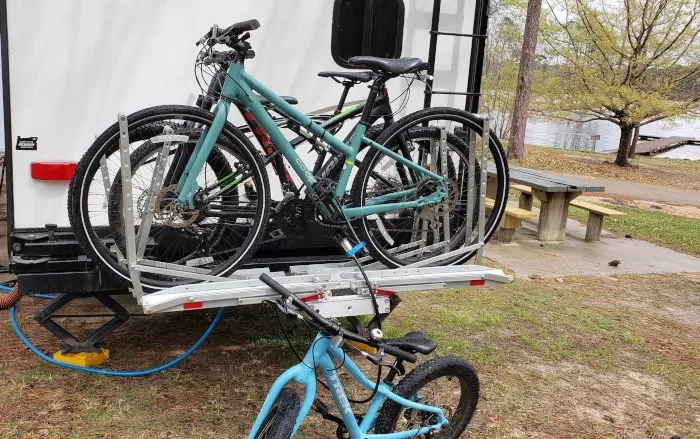
Check and tighten the bike rack at every stop.
If your RV is towable, make sure your tow vehicle’s capacity.
Knowing your trailer weight and it’s tongue weight will help you decide which tow vehicle is right for your setup . It’s dangerous and unwise to tow a heavy trailer with a half-ton truck.
Craving Video? Visit Our Channel
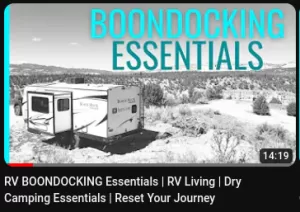
Review the route on Google Maps the night before a moving day.
Familiarizing yourself with the route the night before can really reduce anxiety and make for smooth travels. It also give you an opportunity to figure out where to dump your tanks along the route and pick up more freshwater.
Check the weather the night before along the route and plan accordingly.
Traveling with a heavy rig through storms, heavy rain or strong winds is not smart. If you can alter your travel days or routes when inclement weather is predicted, you might just be preventing an accident.
We use the Windy App to determine gusts along the way. The max I’m willing to tow our trailer in is 40 mph gusts. Anything more and we wait it out.
Stop frequently along your route to rest your legs and use public facilities.
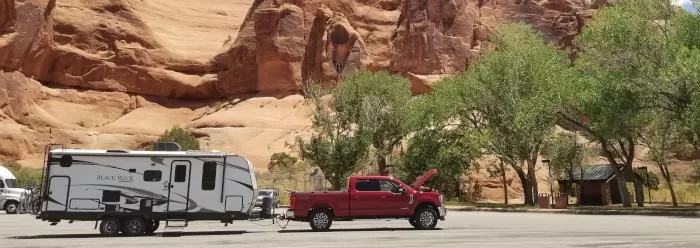
Taking a rest to use public facilities in UT.
Plan your grocery store trips into your moving day.
This forces you to stop, eat a meal, resupply your groceries, swing into one of the local gas stations and start the second part of your day fresh. Besides, it’s an opportunity to remedy the ingredients you forgot for your camp cooking recipes.
Adjust your calories down on moving days.
Plan some of your trips around national parks..
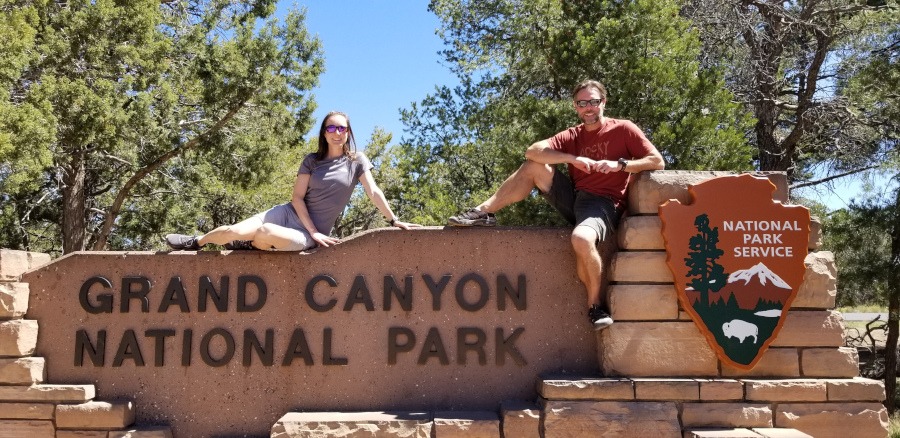
A secret RV road trip tip is to obtain your freshwater and dump your tanks for free in National Parks.
Introduce yourself to everyone along your RV camping adventures.
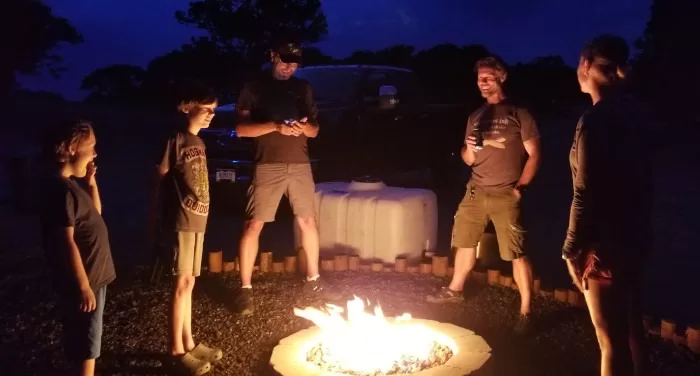
You meet some really great people around RV’s
Not Sure What You Need For Your RV?
Things That You’ll Actually Use In Your RV
Essential Tools You Should Have For Any RV
Essentials For Boondocking
Wrapping Up Travel Trailer Tips For Beginners
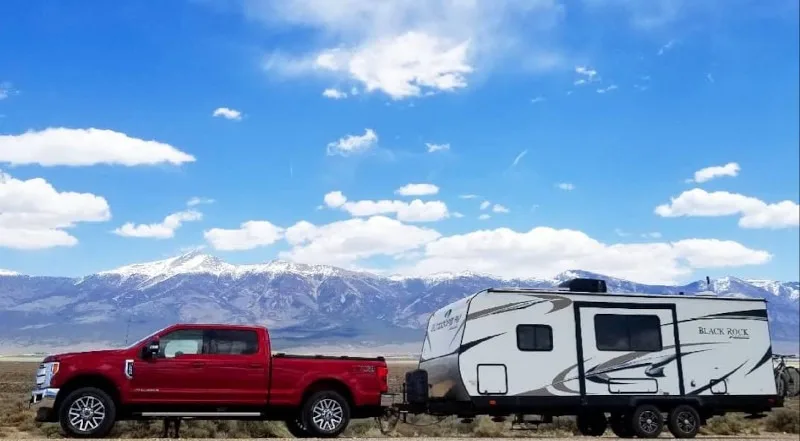
And seriously, you can survive just about all of the newbie mistakes unscathed.
Stay patient, take your time and think rationally.
You’ll be fine.
Get to know your electrical system, plumbing system and water consumption rate as early in the game as possible.
Carry all the essential tools on board your RV. You’ll be glad you did.
Plan your routes realistically. You’ll learn to love the short drives and loathe the long days on the road.
Stay ahead of this by booking your stays a maximum of 280 miles apart.
Planning and preparation are the keys to making your best RV experience. Regardless of whether you are full-time, part-time or a weekend warrior.
Most importantly, it allows more time to do fun things!

much of this is common sense……unfortunately common sense isn’t very common these days….I’m about to start my very 1st camper trailer experience and my head is so frazzled trying to figure it out….but this read definitely is gonna help….stop…think…rest….and screw the a$$H@#$ behind u honking … protect your family and yourself 1st….just saying
So true David! Appreciate you commenting.
Submit a Comment Cancel reply
Your email address will not be published. Required fields are marked *
Save my name, email, and website in this browser for the next time I comment.
Recent Posts
- Best Full-Time Camper Vans For Living In | Guide
- What Are The Best Type Of RVs For Boondocking (Dry Camping)
- Choosing The Best Fridge For Campervan Life | Considerations
- Outdoors RV Manufacturing Owners Review | Full-Time ORV
- 5 Benefits To Roadschooling Kids | RV Living & Homeschooling
- Skip to primary navigation
- Skip to main content
- Skip to primary sidebar
- Skip to footer
Journey With Confidence
The Best Camping Tips For Beginners, According To A Seasoned RVer

- RV Lifestyle

The Best Camping Tips For Beginners, According To A Seasoned RVer. Photo via Shutterstock Standard License
New to RV Camping? You Need these Camping Tips For Beginners
So, you’ve purchased an RV and are ready to take it out on its maiden voyage. After driving home in your new rig, hopefully you feel confident that it’s time to check out a destination you’ve been looking into.
Still, there are a lot of things to consider other than just the purchase. If you are a new RV owner, take into consideration a few of these RV camping tips for beginners.
1. Make reservations well in advance.
The number of people who want to RV is hitting an all-time high and is growing every day. Popular parks are often full a year or more in advance.
If you are adventurous and don’t mind stepping out of your comfort zone, you may want to consider boondocking. There are also organizations such as Boondocker’s Welcome , that, for a small membership fee, provide you with opportunities to stay at a spot for free. With one of these, you may have the opportunity to enjoy a winery, farm or other unique spot for camping. Some have hookups and some don’t so you definitely want to take that into consideration.
2. Less is more when packing.
Whether you are taking that first inaugural trip a few hours away or are heading out to tour the country, you need to realize that packing a lot is not necessary.
Your first trip will give you a good idea of what you need or don’t need to bring with you. Make a list before you leave of things to pack. When you return, take out anything that you didn’t use. This is a good rule for full-timers as well. If you haven’t used it in six months, get rid of it.
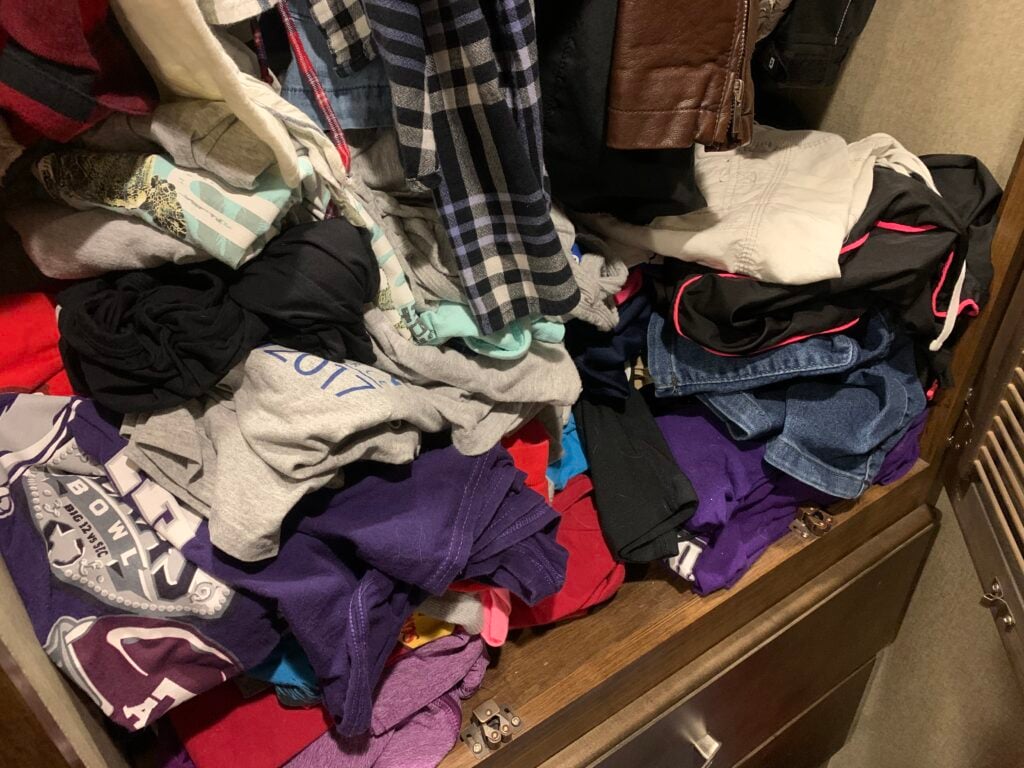
It might be time for this author to take some of her own advice and clean out her clothing storage space.
3. Watch your load weight and know how much you can pull.
Confirm your vehicle’s towing capacity from the manufacturer. Learn terms such as Gross Vehicle Weight (GVW), Gross Vehicle Weight Rating (GVWR), cargo weight, tong/hitch weight, pin weight, maximum towing capacity, and payload capacity.
You can calculate your towing capacity with a few trips to a Cat Scale. We did this on our way home from the dealership. Weigh the camper empty, then weigh it again when it’s full.
4. Have a checklist for departure.
This can help in two ways. First, you will have gone through your packing list to make sure you haven’t forgotten anything. The second is you won’t forget important tasks like securing shower doors or padding breakables in cabinets.
An outside checklist is essential as well and your list might depend on what type of rig you have. Tasks such as pulling in slides, gathering up hoses, and unplugging electricity should be on that list.
5. Do your research
Take time to watch YouTube videos , read articles , and learn everything you can about taking your RV out for the first time. Researching camping tips ahead of time may save you time and frustration.
As a new RVer, do you know how long it takes for your refrigerator to get cool? It usually takes up to 24 hours for it to reach cooling temperature. Leaving your refrigerator on propane while driving will help but most don’t recommend doing this for safety reasons .
6. Take time to get where you are going.
Remember, traveling with your RV is a marathon, not a sprint. If you drive at acceptable speeds for your tires and take time to stop and smell the roses, you will arrive at your destination safely.
Know the arrival time for the park where you are staying. Some may not allow late check-ins and you definitely don’t want to arrive after dark . Your GPS may indicate an arrival time but it’s good to add in time for a slower pace, stops for meals and gas. It may take more time to get in and out of gas stations as well.
7. Scope everything out in advance when you arrive.
One of the most important camping tips for newbies is to scope out your campsite when you arrive. Backing up your big rig or travel trailer will be intimidating at first. Staying at a park that has workers who assist with that will get you started on the right foot on that first trip. You can also ask someone nearby to help. Someone will be glad to assist while everyone else takes a seat to watch the show.
Get out and look (GOAL) is an important term to remember. Consider obstructions in the site, such as a picnic table, electricity post, or trees.
You might want to find an empty parking lot before you take off and practice backing up. You’ll want to get comfortable with the correct way to turn the steering wheel that will put the trailer in the correct direction.
“No worries means no worries. Whether you are a ‘newby’ or a seasoned traveler, take time to get out of your vehicle and examine your site. Once you have a plan for parking and are on the same page with your spotters (highly recommended), calmly and slowly proceed to park. This will help to prevent any damage or misunderstanding. A stress-free (you can do this) set up for your rig will be a great start for your stay, even if it is for just one night.” Aaron Harris, full time RVer, work camper, seasoned veteran.
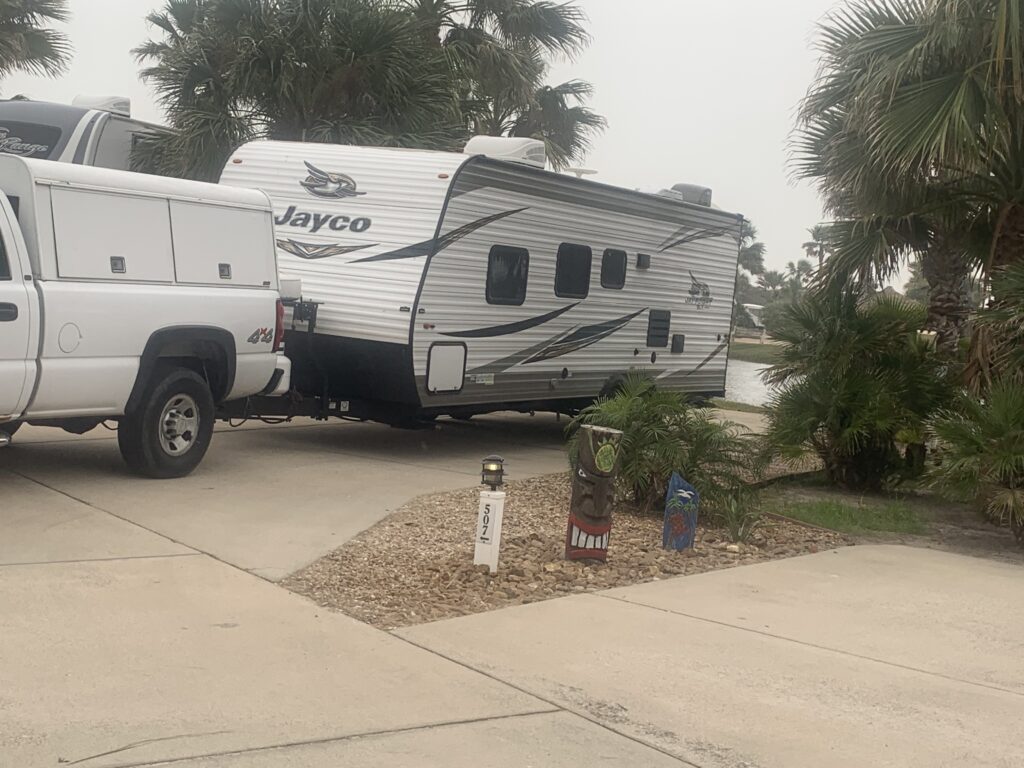
Backing your travel trailer or fifth wheel take some finesse but practice and a good spotter will save the day and a few nerves.
8. Ask for help and get to know other RVers.
Don’t be afraid to ask for help. RVers are some of the nicest people and will be more than willing to share their camping tips – probably more than you want. It’s also a great way to share a coffee at your picnic table, gather around a fire pit, and make lifetime friends.
Find more beginning camping tips
Before you hit the road, make sure you have the RV LIFE Pro tools to get RV-safe GPS directions and to find other points of interest along the way.
For more camping tips, check out this article from Do It Yourself RV on New To RVing: Top 7 Things You Need To Know Today .
O. Christine
10 Essential RV Camping Tips for Beginners
Site under maintenance, please excuse our appearance.
This article’s recommendations may include affiliate links.
After visiting RV trade shows and taking an epic RV road trip towing a pop-up camper, I’ve learned so much about RV camping! It’s not only perfect for retirees and digital nomads (here are tips on how to find remote jobs ), but it can be a great vacation alternative for people on school break, family vacations, or sabbaticals.
Alex and I were complete newbies when we decided on a two-week RV road trip , so here are ten RV camping tips, RV essentials and safety advice, and RV tips and tricks we learned along the way.

Learn the different types of RVs
I didn’t realize there were so many types of RVs before I took my RV camping trip / started going to RV shows. Every time I booked an RV campsite they’d use so much RV lingo I didn’t understand!
If you are an RV beginner, you’re probably in the same boat. Once you know the type of RV you’ll be camping in, the different RV styles you’ll be neighboring, and more importantly, how much space you’ll take up, booking RV campsites will be much easier.
Here is a quick guide to the types of RVs:
Motorized rvs.
- Class A Motorhomes (shaped like a bus; 30-45’ long)
- Class B, B+ Motorhomes (camper with amenities; 18-28’ long)
- Class C Motorhomes (larger than campers at 25-34’)
- Converted Camper Vans (like Class B but often with fewer facilities)
Towable types of RVs
- 5th wheel campers (for pickup trucks)
- Travel trailers
- Truck Camper
- Teardrop campers
- Pop up campers
- Toy hauler (for hauling ATVs, etc.; often comes as fifth-wheel campers or travel trailers)

Confirm how much your vehicle can tow
One of our big RVing mistakes was not realizing how little our SUV could tow! We had big RV dreams and had to scale down to a lightweight pop-up camper to make RVing more accessible for our then-Subaru Forester’s sad towing capacity, which was around 2,400 lbs.
Before choosing your RV (whether renting or buying) be sure to confirm all towing capacity to choose the vehicle that is best for you. Remember to include your own gear in the calculations.
Know where to best park your RV
Another first-time RVing surprise we encountered was finding parking! This was probably the most stressful part about our RV road trip for me.
When stopping by malls and markets, we always had to find two parking spots to fit our SUV and pop up camper. This was no problem at large shopping mall parking lots, but quick restaurant stops and drive-thrus were not always feasible.
When planning your RV camping trip, be sure to map a route that includes truck-friendly rest stops so you can secure sufficient parking spaces for the size of your vehicle. If you are embracing “van life” in a converted van, or are in a small motorhome (< 20 feet length), you may be able to get around this.

Map out a realistic RVing budget
RVing may cut hotel and flight expenses, but it also adds on new ones! The average RVer spends about $1,000-3,000 per month on expenses, but if you love eating out/shopping or don’t want to stay long periods of time at campsites, you might find yourself spending $4,000-8,000 monthly.
On the bright side, this is still considered big savings considering most people (non-backpackers) spend $2,000-5,000 on a 1-2 week vacation.
When planning your RV road trip budget, be sure to consider:
- Decreased gas mileage and increased fuel costs (and possibly a need for diesel, depending on the vehicle)
- Increased highway toll costs for trailers/motorhomes
- Leasing/rental fees for the vehicle
- Auto insurance
- RV campsite and hookup costs/dump station costs
- Amenities cost (wifi, cable, supplies)
- RV repairs and maintenance
- Standard expenses (health insurance, food, cell phone bill, student loans, etc.)

Find RV Campgrounds and RV Parks that won’t break the budget
If you are used to paying site rates for tent camping, be prepared to double that! RV camping requires more space and services, so you can expect the prices to reflect that accordingly. From our experience, RV campsite costs can range from $30-150 per night, depending on the location and season, if you can’t find free campsite s .
We’ve learned a few tricks to finding RV campsites on a budget:
- Get RV memberships if you’re in this for the long run (like Passport America , Thousand Trails , Good Sam , or Harvest Hosts )
- Stay at RV park chains like Sun RV Resorts , which always has special offers
- Park on BLM public land (Bureau of Land Management)
- Get state and national park passes for reduced fees
- Stay longer for weekly and monthly discounts
- Opt for Boondocking (dry camping); use resources like Campendium or iOverlander to find sites
Choose the right RV campsites for your needs
Depending on your RV of choice, your RV camping needs will differ. While most RV sites will offer amenities like electric hookups, you may need other campsite amenities too. What I’ve learned during my time RVing is to PLAN AHEAD.
RVing took me for a loop because I was used to booking tent campsites days before or even as I showed up to a park. With RV camping, it is important to book ahead to secure the right campsite for your vehicle (most importantly, if you’re traveling during high season or need hookups).
When choosing your RV campground, consider this:
- Are there hookups available at all (electric, water, septic)?
- Is there a dumping station or are hookups at specific sites?
- If your RV doesn’t have a shower, will your campground offer bathrooms and showers?
- Does the campsite offer cable and WiFi?

Learn RV campsite rules and etiquette
One of my essential RV camping tips is to first understnad that RV camping is a lot different than tent camping.
In fact, if tents are allowed in a campground, they are usually in a different section of the park. Abiding by RV park rules and showing RV manners will help you have a better stay (and maybe even make some friends!)
Here are RV camping tips, rules, and etiquette we’ve learned from RV road tripping:
- Many RV campsites are “back in” only. If you hate backing into your site, you can look for campgrounds that offer “pull-through” sites (but they’re not always guaranteed).
- Most campgrounds have a noise curfew, which means your generator has to be turned off between 10 pm and 7 am (varies). It is also courteous to turn off any bright lights.
- Don’t walk through other people’s campsites.
- If there are many campsites open, give your RV neighbor some space.
- If welcoming guests, be sure to observe guest rules, parking regulations, and curfews.
- Spray the dump station after you use it.
- Don’t leave trash behind!
Set up your RV campsite efficiently
Setting up an RV campsite may seem like it’d be quick (everything’s right there, right?) but I found it actually takes longer to set up than tent camping.
RV campsite set up tips I’ve learned from RVing (and watching other types of RVs set up) include:
- Allow at least 2 hours of daylight to set up your site (and break down) comfortably
- Disconnect any towed vehicles (ie. if you are towing a car behind your motorhome)
- Check for anything that could obstruct you backing in (trees, rocks, etc.)
- Park so that you have enough space for an outdoor seating area (or slide outs if applicable)
- Be sure to have blocks to level your RV if needed; if you have a trailer you’ll want to insert wheel chocks (like door stoppers) to keep it secure
- Set up an awning, outdoor rug, and seating area/table outside your RV
- Do not leave awnings out while away for long periods of time or during windy days
If you want an awesome list of RV essentials to pack for your camping trip, I really like this RV camping packing list from Campers Inn.

Dump the right way
If you choose a motorhome or trailer that includes a kitchen, bathroom, or shower, you’ll have to learn a bit about holding tanks and dumping. Here is a quick guide:
- Dumping stations: this location where you can dump your waste sewage; perfect for RVers who don’t have hookups at their campsite. Here are great dumping tips to review before your RV trip.
- Hookups: most RV parks include hookups at each campsite (so you don’t have to go to a dumping station) which offers gray and black tank emptying as well as fresh water.
- Black tank: this is where your waste goes when you use the bathroom in your RV
- Gray tank: this is where the shower and dishwater goes when used in your RV
When you get a campsite with full hookups, you’ll be able to connect hoses to your gray and black tank valves and empty them into the campground’s septic system.
If you are going to be at the campsite for a while, be sure not to keep the black tank’s valve open, so as to prevent dripping and the smell of waste at your site.
Other holding tank/hose tips include:
- Use your fresh water hose for freshwater only. Many RVers choose to use a completely different colored hose to prevent a mix-up with the black and gray tank hoses (yuck).
- Only empty your black tank after being > halfway full so it can empty easily.
Learn how to RV safely
While RV camping can offer luxury and comfort at your campsite, those same luxuries have to be securely stored anytime your vehicle is in motion. Be wise with your storage solutions, supplies, and accessories in order to make set up, break down, and driving as easy and safe as possible.
Here are some tips to take with you on your RV camping trip:
- Frequently check your RV health, tires, and fuel gauge.
- When driving, do not leave anything loose (all items should be stored away, locked, or secured against the wall or floor).
- If you have a tall RV, always know bridge clearance heights and weight restrictions
- Because of the size of your vehicle, you should drive slower and add time to your projected ETA.
- Mentioned before but worth mentioning again: always secure your RV wheels (level, chocks, parking brake) when parked.
- If you are going cold weather RV camping, be sure to know how to prepare accordingly .

Now you’re ready for RV camping!
I hope you found these RV camping tips for beginners useful — these were all the things we *should’ve* known on our first RVing trip. The more we learned, the easier our RV road trip became.
To help you get started on your RV camping trip, check out my printable camping checklist . It is geared toward tent campers but you can use the groceries and supplies lists just the same. You can also check my list of diverse RV blogs that create more dedicated content about the full-time RV lifestyle.
Hey Pinterest Fam!
Share this guide to Essential RV Camping Tips For Beginners by pinning the image below to your planning board.

With how large our RV is, I can definitely see why it would be important to try and get a feel of where we can drive through on the way to the camp. The last thing I want is to bump into objects and clearings without knowing about them, causing damage to our vehicle. I’ll scout the area on the way to a local RV campground first so we know what to avoid.
I loved the way how you wrote these tips. I’m a beginner at traveling to a different country. Thank you for sharing. If you have spare time, check out my blog also about different campsites in rizal
Lovely tips! Thanks for this!
Thanks for helping me understand how stressful it is to find a place where we can park our RV. This also made me realize that we should pick an area where we can camp properly with our vehicle. Maybe we should try Allegheny National Forest and see if we can find do a lot of recreational activities on this site.
You made a good point when you emphasized the importance of planning your RV trip to ensure a route that has truck-friendly rest stops. In that way, you wouldn’t have to stress out about finding parking. My boyfriend and I plan to vacation on their family RV soon, so I’ll take note of this advice and start researching trailer parking along our route. Thanks!
Leave a Reply Cancel reply
Your email address will not be published. Required fields are marked *
Save my name, email, and website in this browser for the next time I comment.
5 not-so-obvious things first-time campers should consider before hitting the trails
Are you ready to tackle the Great Outdoors? You'd better check out these tips first.
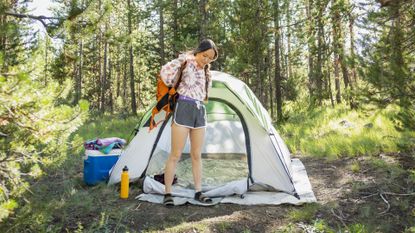
Camping for the first time can be a daunting experience. How do you set up a tent? How much food should you bring? Will there be facilities on the campsite? How will you navigate around in the dark? While the answers to most of these questions are readily available online, we gathered a few not-so-obvious things first-time campers should consider before setting off.
We didn't include it on this list, but there is a separate tutorial on how to dry your tent at home if you're interested in that. It is aimed more at intermediate campers with some gear, but we also have a list of 12 checks every self-respecting camper should do before the spring season . Who knows, you might be able to find some useful information in there, too...
1. Unpredictable weather
First and foremost, the weather outdoors can be highly unpredictable, often changing rapidly, even if the forecast says it'll be sunny for the whole duration of your trip. As such, first-time campers should be prepared for unexpected conditions like sudden rainstorms, gusty winds, or temperature fluctuations.
Bringing appropriate clothing layers and gear to stay comfortable in various weather scenarios is crucial for an enjoyable camping experience. Think of stuff like waterproof jackets , fleece layers , and base layers ; anything that can help you stay dry while you're away from your usual creature comforts.
If you're backpacking or need lighter gear, consider lightweight shells, technical fleeces and quick-wicking Merino undergarments. Also, waterproof hiking boots or walking shoes are your friends.
2. Noisy nights
Camping amidst natural environments can introduce campers to a plethora of unfamiliar sounds, ranging from rustling leaves to nocturnal animal calls – not to mention other campers moving around your tent . These noises may disrupt sleep patterns and affect overall restfulness.
To mitigate this, you can consider using earplugs or white noise machines to drown out surrounding sounds and promote a more peaceful night's sleep. If you're camping during summer, blackout tents, such as the oddly named Quechua Camping Tent 2 Seconds Easy - 2-Person - Fresh&Black , can help you block out the light, which might help you relax a little bit more.
Get the T3 newsletter!
All the best features, news, tips and great deals to help you live a better life through technology
3. Limited access to facilities
Many campsites, especially those in remote areas, offer limited or no access to essential facilities such as bathrooms, showers, and running water. First-time campers should prepare for this by bringing adequate hygiene supplies, including biodegradable soap, hand sanitiser, and wet wipes.
It's also essential to familiarise yourself with proper waste disposal methods to maintain cleanliness and environmental responsibility. To give you an idea of what you might need, check out these seven eco-friendly camping essentials , from water filtration systems to waterless toothpaste.
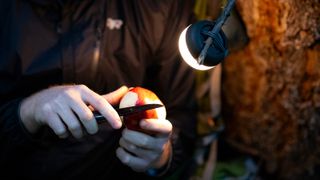
4. Darkness and limited lighting
Nighttime in wilderness settings can be exceptionally dark, posing challenges for activities such as cooking, navigating, or even attending to basic needs like going to the bathroom. Campers should ensure they have sufficient lighting options, such as headlamps , camping lanterns , or flashlights , along with extra batteries. Proper illumination not only enhances safety but also contributes to a more comfortable camping experience.
5. Insects and bugs
Camping exposes individuals to various insects and bugs, including mosquitoes, ticks, and spiders, which can pose health risks and discomfort. To protect against bites and stings, you should pack insect repellent, wear long-sleeved clothing, and consider using mosquito nets when sleeping. Plus, familiarising yourself with basic first aid for insect-related injuries can be invaluable in addressing potential challenges while camping.
Matt Kollat is a journalist and content creator who works for T3.com and its magazine counterpart as an Active Editor. His areas of expertise include wearables, drones, fitness equipment, nutrition and outdoor gear. He joined T3 in 2019. His byline appears in several publications, including Techradar and Fit&Well , and more. Matt also collaborated with other content creators (e.g. Garage Gym Reviews ) and judged many awards, such as the European Specialist Sports Nutrition Alliance's ESSNawards. When he isn't working out, running or cycling, you'll find him roaming the countryside and trying out new podcasting and content creation equipment.

Hiking, biking, sauna hot and Baltic cold, the new OnePlus Watch 2 special edition is a great Android partner. Here's why:
By Mike Lowe Published 25 April 24

A 1990s classic system returns
By Rik Henderson Published 24 April 24
Useful links
- When is the next Prime Day?
- Best 5G phones
- Best VPN services
- Best laptops
- Best smartphones
- Best mattresses
- Best phone deals
- Best mattress deals
- Best TV deals
- Discount codes

Our Best RV Living Tips After 8+ Years On The Road
We lived, traveled, and worked full-time in our RV for over eight years! Here are your questions on RV Living answered.
How Much Does It Cost To Live In An RV?
If you are looking to travel and adventure and get out and see and do a lot it can cost you $5000 – $10,000 a month. If you are good boondocking and doing free things and traveling at a slower pace it can cost way less. Anywhere from $2000 – $5000.
In the end no one can really determine these costs for you. Instead you need to look at your current bills, spending habits and how you want to live and travel in the RV and work out your total from there.
Our post will get into all of this and will help answer all of these questions. We also have a post: Living In An RV Full Time: How Much Does It Cost?
Featured Retailer: etrailer.com
For almost anything you would need or want for your RV, no matter if it’s a motorhome, 5th wheel or travel trailer, etrailer.com has it! Click here to explore etrailer!
What are the top RV-friendly destinations or campgrounds?
Exploring new places is a significant part of RV living and one we highly recommend and love about this lifestyle! Our top scenic destinations include almost anywhere out West. From Glacier National Park to Yellowstone National Park and doing an Utah Road Trip . The West has so many great RV trips to offer.
If you are looking for RV specific trips check out: RV Itinerary West Coast – 26 Epic Places To Stop and East Coast RV Trip Itinerary – 16 Awesome Stops To Make !
Can You Live Full Time In An RV?
Absolutely! Plus you can do it long term too! We did it for 8 years with our 4 kids. The community of people living full time in an RV is growing like crazy. People are looking for the freedom and love the idea of traveling the country. Read on to see if full time camping life is for you!
There is no way I can share all about RVing with kids in a blog post so I wrote a book!
Full-Time RVing With Kinds – An Insider’s Guide To Life On The Road!
That is 257 pages packed full of the information you want to know before starting your RV living full time adventure!
What RV Is Best For Full Time Living?
The answer really varies depending on how you want to travel in your RV. If you plan to stay put for long stretches go as big as you can. If you want to travel a lot and visit National and State Parks something smaller makes more sense.
We cover more of this in our post see keep reading to find out!
How much does it cost to buy an RV, and what are the ongoing expenses?
How much it costs to buy an RV really depends on what kind of RV you want to get. We know of people who bought a $4000 dollar RV to start their full time RV adventure. We also know others who spent over $100,000 on their RV.
There are even rigs that are in the half million range! It really depends on the money you have, what luxuries you want, and how much you want to spend.
In our case we started with a $70,000 RV (our 2006 Newmar Kountry Star Class A diesel Pusher) but got a 15 year loan so we had a monthly payment of about $500 a month.
On going expenses of RV living will vary depending on how you want to travel and live. If your goal is to get out and see and do a lot it is going to cost more versus if your goal is to stay in one place and save money. For us we have spend between $5,000 – $10,000 a month.
How do I handle mail and receive packages while living in an RV?
There are a variety of mail services like Escapees where you can set up a mailing service. This can be more difficult depending on what state you live in and if they offer this service. But Escapees is very helpful in getting it all figured out for you.
We were lucky to have parents that would do this for us! Same as the mail service about once a month they would send us our mail and would also keep an eye out and would ask if it was OK to open it if something came that looked like it should be opened and read immediately.
Is RV living more cost-effective than traditional housing?
The short answer is it can be! The long answer is it depends on how you want to live the lifestyle. If you want to move into an RV to save money you can. Especially since you won’t have a mortgage and all the bills.
However, this also means you will want to find places you can stay for a reasonable amount each month. The best way to lower the cost of living is to stay at places for a month at a time. A lot of campgrounds give you a discount if you stay for a month.
Hitting the road
Knowing your why.
I can’t stress how important this is. When we hit the road we quickly found out it is not all rainbows and sunshine and if we didn’t know our reason for choosing this lifestyle, it makes the hard times even harder.
Our why was to spend more time together as a family with less distractions from things and activities.
Here is our story about how we became a Full Time RVing Family .
This isn’t vacation
There is a difference between being on vacation and traveling full time. Your home is always with you, which means so are all the worries and chores that come with it . . . Plus when you go to a new location you don’t have a vacation budget to blow on doing all the fun and cool things. You have to get creative and find as many free things to do as you can!
How will you travel
There is such a variety of ways that families do full time RVing. You have your slow travelers who stay in one place for weeks or months, your boondockers who try to rarely ever pay for camping, your Thousand Trails group who only stays at Thousand Trails parks, the list goes on (more on all these different styles below).
Be ready to plan
There is a whole lot of trip planning that goes into this style of living. It isn’t like having a house that you know you can go back to every night. Instead you have to be sure you have a campsite booked or somewhere in mind to stay for the night – each and every night! You become a full time RV trip planner!
In the Summer when kids are out of school there are a lot of people traveling which means places book up and they book up early (like again 6-12 months). So keep that in mind when looking at summer travel.
This came as a surprise to me (being from Wisconsin I just assumed most places down south were warm all winter! Not the case.) If you are looking for warm swimming weather with shorts and tank tops all year your options are pretty limited.
To get that type of weather, you usually have to be south of Orlando, in Arizona or Mexico . . . Not saying you can’t stay further north, but just know that the weather is going to be cooler the further north you get.
This being the case, Florida and Arizona are PACKED in winter with RVers. Both families and retirees. This means that planning ahead is usually a necessity. If you want to get the exact places you are looking for.
With a Thousand Trails membership we are able to book sites online up to 90 days out (memberships vary with this number) and then we can cancel them. So if we aren’t 100% sure what we are doing we may book a set of dates and then go and change them or cancel them if we change our plans.
You have to be comfortable with uncertainty and also comfortable with the fact you may end up boondocking somewhere for a few days if nothing is available. It is up to you to decide how that feels to you.
Expectations
We highly recommend setting realistic expectations. If you think living in a small space with your family 24/7 isn’t going to be hard at times, you aren’t preparing yourself. This lifestyle has its challenges. If you accept that and anticipate it you will be more prepared when they happen.
Here is a post we wrote on the evolving emotions of full time RV travel .
Here is a great post about safe RVing .
RV Purchase – What type of RV is best for my needs? (Class A, Class B, Class C, travel trailer, camper van, etc.)
Buying an rv.
This is such a fun part on this journey, but also stressful! This isn’t just your place to go on the weekends, it is where you are going to be living. That adds a little more pressure to picking the right RV camper.
There is everything from camper vans to gigantic 5th wheels ! It can be hard to pick.
Another option is to do an RV rental first. To help you decide what you like. We have a post here on tips for renting an RV and one here on tips for planning an RV trip .
What are the essential amenities and features I should look for in an RV?
We put a lot of thought into our purchases (We have had 5 RV’s since getting on the road in 2014) and for the most part were happy with what we chose each time. Really think through where everything is going to go that you want/need to bring with you. Do you have a lot of camping gear , Kayaks, Paddle-boards, indoor toys, kitchen products?
Where will everyone sleep – will that work? What about the dogs bed – is there a spot on the floor for it? Is there a place for all the clothes to go? Is there a desk area or place for the computer?
Thinking about the things that we knew we were going to want and need room for was helpful in narrowing down our decision.
The big question is always what size RV you should get.
We wrote a post to help you figure that out: Everything You Need To Know To Pick An Awesome Family RV.
Our first RV:
Our 2nd RV:
Our 3rd RV:
Our 4th RV:
Our 5th RV – Keystone Montana 5th Wheel:
We chose to start BIG and got a 39 foot motorhome with 4 slides, then went small and are now back up to a 36 footer.
Our post on downsizing: Why We Decided To Downsize Our RV
Here is a video of us shopping for our last RV:
Be sure to follow us on Youtube, Instagram, Facebook, TikTok, Pinterest, all the places!!
If you can, add solar to your rig ASAP! It will give you the opportunity to go out and boondock (camp without hookups). We have been to so many amazing places boondocking.
We had our current solar setup installed by Future Solutions in Indiana and they did an amazing job!
With our Keystone Montana High Country 335BH it came pre-wired for solar which saved a lot of time and money on the whole process of getting solar installed.
We currently have:
- Precision Circuits Battery Guard
- Magnum MS2000 Inverter
- Victron MPPT Solar Controller
- Magnum Remote
- 2 x 300 watt panels
- 4 Battle Born GC2 Lithium Batteries
We plan on expanding on this system since our usage demands more panels and batteries…full-time living!
Making it your own
Moving into an RV (which is now your tiny house on wheels) you still want to make it your own! We had so much fun doing this with every rig we have had. With our first rig we took out closets and sinks and added bunks and shelves. We also ripped out all of the old fashioned looking decor and made curtains to hang.
Plus we painted the whole RV. Nothing really different here. Craig just primed the walls and we painted them with normal paint. Nothing special.
We were very happy with everything we did and really enjoyed living in it that way, but when it came time to sell we had to repaint everything back to a neutral color. I guess we didn’t have to, but the majority of people shopping for an RV are going to be looking for a more factory style. Just something to keep in mind.
You can check out our posts on our remodels here:
RV Remodel: How to fit 6 people and 2 large dogs in a Class A RV
Awesome Travel Trailer Remodel Ideas [Video Included!]
2 Week Complete RV Remodel For Under $2000 [Video Included]
Fun And Simple RV Remodel Ideas For Your 5th Wheel
Check out RV Inspiration for RV decorating and redesign ideas.
Have some fun here and come up with a name for your house on wheels. We still haven’t done this and just call ours The Rig, but I know other people have come up with some really cool and unique names! We would love to hear yours so shoot us a message!
Towing a car or buying a Vehicle to tow it with
Pretty late in the game we learned that there are only certain vehicles that can be towed 4 down behind a motorhome. Wait you can’t tow a minivan?! Crap! I think there are a few older models you can, but it is a pretty small list.
Here is a great list to determine what vehicles can be dinghy towed – 4 down.
If you are buying a truck to tow your 5th wheel or trailer just remember this is also the vehicle you will be driving around to attractions, the grocery store, parking structures, etc. Nothing like driving a dually in a busy city, but hey, sometimes that’s just what you got to do.
Also be aware of weight and how much your trailer/5th wheel will weight with EVERYTHING in it. Here is a post we wrote for Winnebago that talks more about this: Picking A Family Friendly Vehicle To Tow A Travel Trailer
RVing Full Time
Simplifying.
Over the years we have learned that the less things we have the more space we have and that is a good thing. Plus almost everything we have gotten rid of we haven’t wanted back and don’t miss.
Same thing goes for outside toys – things like a big grill, a ton of lawn chairs, yard decorations, things like that. Believe me setting them up and taking them down starts to get really old really fast.
That being said we are really happy when it is cold and our friends have a clam tent and we do borrow my parents grill for grilling now and then :).
Here are a few tips on how we keep our life simplified: simplified . And check out these tips on tiny living!
Kitchen accessories
It is all about minimizing. Unfortunately, a lot of big kitchen appliances probably aren’t going to work. Instead we focused on things we were going to use day in and day out. If we didn’t use it in a month it was gone.
Here are our recommended Kitchen Accessories .
I can’t believe how many clothes I use to have in our old house. I had 2 closets full! Now I have one bin full and a few hangers and that is it.
It really is kind of crazy, but what I have learned is that I really only wear a small number of clothes. Granted if I had to go into work every day or dress nice, I would probably need more, but that is one of the many benefits of this lifestyle. I can wear yoga pants or work out clothes every day!
Craig always laughs at me, but going to a new grocery store every few weeks has its challenges! This means I can’t always buy the same brand or don’t know where the exact food I want is – since it is a new store with a new layout.
But all that aside, it really is like shopping for groceries when you live in a house minus having the basement or garage space to stock pile when there is a great sale. Other than that, it is all about getting use to the space you have and then learning how much you can and can’t buy.
I can’t tell you how many people have said to me “What do you eat?!” The funny thing is we pretty much eat the same things we ate when we lived in a house. We have a fridge, oven, and stove top, plus appliances like a toaster, donut maker, Instant Pot etc.
The difference is you probably won’t have a huge kitchen to spread out in. I will say I also bake a lot less in the RV. Just not as much room for all that.
The fridge will probably be smaller (unless you get a residential fridge – which people do) and overall storage space for food is usually less, so your shopping style may change – no more stock piling those canned goods!
Internet – How can I stay connected to the internet while on the road?
Oh the Internet . . . I think it is a good thing that we left our house right after we got rid of cable and moved to internet TV watching. Also before our kids started wanting to stream from their iPads. Reason being we don’t know what we are missing not having reliable internet all the time to handle all that bandwidth!
If you need internet to run your business, DON’T rely on campground wifi. SERIOUSLY. It rarely works and when it does you normally have to be at the club house or a designated area for it to really work.
Instead we recommend getting your own hotspot. If you always need a connection and don’t want to stress about having to drive to a location (hello Starbucks), then you may want to get a Verizon and an AT&T plan. Plus a booster. . .
I will say we have made it work (running multiple online businesses) with just a Verizon hotspot, but there have been campgrounds and locations where it was a total nightmare and a booster or AT&T would have worked.
Here is a post from the amazing Technomadia team (not saying you need all of this – we don’t have it all – but interesting to see what is possible!).
Our Mobile Internet Setup – 15 Years Of Staying Online
Pets – Is it possible to have pets while RV living, and what are the considerations for their well-being?
When we decided to RV full time, we knew we would be bringing our pets with us. That was part of the reason we went with RVing since they could come with us. It has its challenges, but what you will find is most RV parks are filled with people with pets.
You can check out our post about it here RVing with dogs .
We have had to put both of our dogs down while being on the road. They both were getting old when it happened and not doing well, so we had to make the hard decision to put them down. Both times we found a vet and made sure to find a place we could get them cremated so we didn’t have to leave them behind. For us it was the best solution in the situation.
It was horrible and sad, but it was all possible. We had no idea if cremation would be an option. Had it not been where we were we would have gone somewhere where it was.
Cost of Full Time RVing
There are so many different ways to live this lifestyle. Some do it for saving money, other do it because they want to get out and travel and saving money isn’t why they choose the RV life. For is it was never about saving money.
We have heard you can do the full time RV lifestyle for $2,000 – $3,000 a month. We fall more into the $7,000 – $8,000 range but if we really try we could probably do about $4,000 – $5,000 a month.
Please note we move a lot. If we choose to stay put in places for longer things would cost less. Instead we normally move every 4 days or so. If your goal is to save money by living full time in an RV it can be possible. Below we hit the costs of full time rving that we have seen.
I think we thought living in an RV was going to be a lot cheaper than living in a house . . . It can be.
In our case we have an RV payment – on our first RV it was $532 then for the next few it was around $300. Plus if we stay at campgrounds that can be a $600 – $800 a month so right there we are getting close to what our mortgage was (minus property taxes).
Here are detailed write-ups on how we afford full time travel. Plus a couple months of detailed budgeting for our family. Our goal when we started was $4000 a month but we were closer to $7000 – now as the kids have gotten older it is closer to $8000 or sometimes more.
How We Afford Full Time Family Travel
Full Time Family Travel Budget For A Family Of 6 Plus 2 Dogs – September 2016
Full Time Family Travel Budget For A Family Of 6 Plus 2 Dogs – October 2016
Video with us talking about how we afford full time family travel:
Campgrounds
Campground prices range from $0 a night to $200 a night. It all depends what you are looking for. If you purchase a membership like Thousand Trails – you pay a flat one time fee to buy the membership.
In our case we bought a used one for $3000 then we pay $545 a year. We bought our used membership here: Campground Membership Outlet.
Once that yearly fee is paid we can stay for “free” at these campgrounds around the US. We have mixed feelings about them. Some are really nice, others are not so great. They are normally pretty far from attractions and a lot of the time our Verizon hotspot does not get coverage . . .
However they are great for meeting other full time traveling families!
We love staying at state and national parks which can range from $25 – $60 a night and normally don’t have full hook ups, but instead just electric and maybe water.
Then there are private RV parks. There are times we really like these concrete centric RV parks with full hook ups and a nice clean setup – and cable – the kids love cable :).
Then there is BLM land and boondocking opportunities where you can stay for free but have no hook ups. You find most of the BLM land on the west coast – not as much on the east coast. Here is a post we did on how to camp for free or close to it in the US .
Here is a post we have on our top 15 favorite RV campsites in North America .
Memberships
There are a decent amount of RV memberships sites out there. We belong to:
Fulltime Families – all about families traveling fulltime in their RV. Lots of great resources and rallies! Click here to join Fulltime Families !
Thousand Trails – as mentioned above. Great for inexpensive camping (once you buy the membership) and for meeting other full time traveling families.
Passport America – great discounts on campgrounds (usually for one to two nights, but sometimes more).
Good Sam – We don’t really use this one, but when you RV full time you have Good Sam . . . you can be the judge of that one.
Harvest Host – Great opportunity for staying for free at wineries and breweries!
Boondockers Welcome – An awesome way to find unique stays on people’s property around the US!
Reciprocal Museum Membership – a great one for deals on science museums , natural history museums, children’s museums and more!
I know there are more out there but that is what we do for now.
Have an RVer in your life? Check out these Best Gifts for RV Owners – 43 Gifts They Will Love
Health Insurance
If you work for a company you probably have health insurance through them, so you are good to go. If you don’t you may need to get insurance elsewhere. We have gone the route of the Marketplace/healthcare.gov – https://www.healthcare.gov and it has worked great for us. Just make sure you know where you coverage works – ER visits are the only thing that works out of state for us.
We also purchased a Teledoc plan, which I would HIGHLY recommend.
Here is a great post about Healthcare Options .
For RV insurance I recommend you research which companies currently will cover full time RVers and also get a plan to cover your things in the RV.
RV Maintenance and Repairs
RV’s take a lot of maintenance and repairs. What we have learned over the years and lots of repairs and maintenance is the more you can do yourself the better!
YouTube university has almost everything you need. You just have to be willing to go out and learn.
If that isn’t your gig there are a lot of mobile RV techs around the country. A lot of them are full time travelers themselves so it is a good way to get help if you need it.
For maintenance, always be sure to stay on top of it. It will help eliminate potential issues.
Here is a list of our favorite RV blogs that we come back to time and time again:
Technomadia.com
Winnebago.com
The Republic of Nomads
Escapees RV Club
OR else we google it :).
Full Time RVer Blogs
Here is a list of our favorite blogs of other families or couples who are (or have) traveled full time in an RV:
Follow Your Detour
Drivin’ & Vibin’
Fulltime Families
Ditching Suburbia
The Wanderpreneurs
YouTube RVers
Looking for inspiration through You Tube? Here are some great channels from full time RVers!
Our Channel :)!
Less Junk More Journey
Keep Your Day Dream
Project Trek
Our Podcast – we come and go with it but will be adding more episodes soon!
Check out this post by Boondockers Welcome: Top 5 Podcasters For RVers
Instagrams To Follow
Us – Crazy Family Adventure
The Mom Trotter
Lanes Less Traveled
Big Hearts Tiny Spaces
The Wanderprenuers
Elementary Explorers
The Runaway Parents
Restless_Russells
Facebook Groups To Join
Full Time RV Family
RVE Entreprenuer
Technomadia
What Happens When You Want To Get Off The Road?
After 8 years of full time RV travel with our 4 kids we knew it was time for our family to get off the road. It wasn’t an easy decision in some ways. In other ways it was easy since we knew it was time. When you know you know.
Here is a post we wrote about it: Getting Off The Road After 8 Years Of Full Time Travel
Want even more content on Full Time RV Living?! We have you covered:
Crazy Family Adventure Podcast
How We Keep Our Life Simplified
Full Time Entrepreneurs
The Hardest Thing About Life On The Road
RV Living With Kids – What We’ve Learned After 2 Years
10 Unexpected Things About Living In A RV Full-time
How I started my business
10 things we learned from 365 days of living and traveling in an RV
7 Things We Love About Full Time RVing
7 Things We Hate About Full-Time Family Travel
43+ Best Gifts For RVers
How To Make A Successful Income While Full Time RVing
How To Make Friends On The Road
10 Helpful Tips For Making Friends While Living Fulltime In An RV
Keystone Montana – 7 Owners Share What They Love About It
29 RV Kitchen Accessories For The Best RV Kitchen
Top 15 Best Things To Do With Kids In Austin
Pin This Post:
This post may contain affiliate links.
The post Our Best RV Living Tips After 8+ Years On The Road appeared first on Crazy Family Adventure .
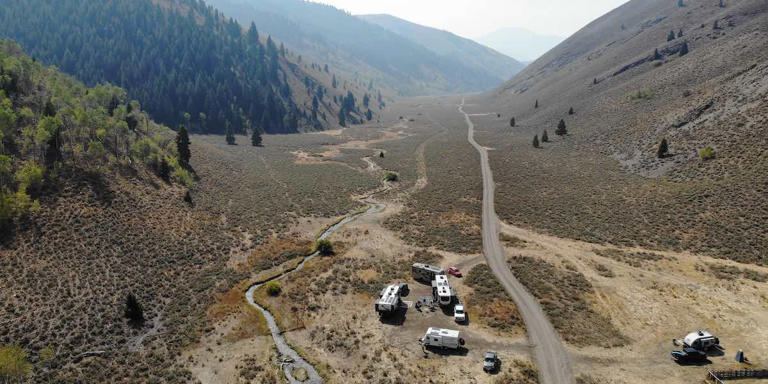

IMAGES
VIDEO
COMMENTS
64. Use alternative energy sources to heat your camper without electricity. You don't need electric hookups in the winter if you know how to heat a camper without electricity using alternative energy sources, spot heating, campsite selection and these hacks for keeping the cold air out and the warm air in your RV. 65.
Now, for the first time travel trailer tips and tricks: 1. Pack everything in totes. Put food, bedding, and camper parts in separate totes. Once you get to camp you can unpack all that needs to get put away. Then all the totes can go outside and be stored under the travel trailer.
First, check how much your truck can tow. This information is usually on a sticker in the driver's door jam. Now check the trailer numbers, usually found on the driver side of the trailer body. That sticker will give you a few different numbers. Make sure none of those numbers exceed what your truck can safely tow.
Watch for low-hanging branches and take note of the height of overpasses before you proceed. Use an RV-safe GPS to make sure you have a safe route. 3. Level your RV before filling your freshwater tank. Leveling your RV before filling your tank will ensure that you are really getting a full tank. 4.
RV Hacks for Organization. 11. Badge Clips for Hanging Items: Badge clips can be used to hang lights from your awning, among many other things. 12. Towel Rod for Storage: Use hooks to hang items from a towel rod such as cosmetics, kitchen utensils, or even decor. 13. Shoe Organizer Bed Storage: Create easy bed storage with a cut-up shoe organizer. 14. Shoe Organizer Shower Storage: Shoe ...
5. Wheel Chocks. Wheel chocks are very important! Once you have your travel trailer parked, you want to make sure that you have your wheels chocked, so the trailer doesn't roll on you once you disconnect it from your vehicle. You definitely need to chock your trailer wheels.
Best Tips for New and Seasoned RVers. Whether you're planning your first ever RV camping trip and you don't know where to start, or you're an RV veteran who is just looking for some nuggets you weren't aware of, this article is chock full of the best RV camping trip tips, tricks, and hacks, for beginners and experts alike.
The common feature of travel trailers is 30 amps, but there are some with 15 or 50 amps. If you forgot the power adapter, or have the wrong one with you, then forget about connecting to the park's provided power. RV Power and HVAC. You must know that the travel trailer's battery isn't going to provide electricity to your air conditioning ...
Camping with a travel trailer is an exciting adventure, especially for beginners. To ensure a smooth and enjoyable experience, here are the top 10 tips to keep in mind: Choose the Right Trailer: Select a trailer that suits your needs, considering factors like size, amenities, and towing capacity.
2. Plan an RV-Friendly Route. Regardless of where you're going, take advantage of tools like the Good Sam Trip Planner that help navigate your RV through the country while suggesting campsites and RV parks along the way. 3. Level the RV Before Filling the Tanks.
Keep reading our complete guide to RVing for Beginners for 44 essential RV camping tips that will keep your family safe and happy on the road. Contents. 1 RV Maintenance Tips. 1.1 Service Water Heaters Annually. 1.2 Service Air Conditioners Annually.
Here's an RV hack that will help your rig's oven heat more evenly: Place a large pizza stone inside on the lower metal shelf - even when not making pizza. The stone will absorb the oven's heat and prevent it from cycling on and off so frequently. (You can substitute a pizza stone with a 12 x 12-inch ceramic tile also.)
Planning your first camping trip 4. Consider renting an RV. If you don't own an RV yet, consider renting one for your first RV trip. This first step will allow you to test out RV camping without having to invest in a unit of your own. Renting different types of RVs is a great way to give you a feel for the different styles of RV camping.
Before You Buy a Travel Trailer. My number one tip before buying a travel trailer is to make sure your vehicle can tow it. Check with your vehicle's manufacturer to determine the towing capacity of your vehicle. Then go through the step using this app to see your real tow capacity.
Join online forums or social media groups dedicated to travel trailer enthusiasts to share experiences, tips, and advice. Attend RV rallies, trade shows, or club events to meet like-minded individuals and learn from their experiences. ... Embrace the unique opportunities provided by travel trailer camping and create lasting memories as you ...
Plyers, needle nose, channel lock, and vice grips. Wire stripper/cutter, a few wire connectors. A small and a large adjustable wrench. A socket set (not required, but useful if you have the room) A can of WD-40 can come in handy if you need to break loose a rusted bolt under your RV. Duct tape and electrical tape.
4. Keep A Notepad in Your RV. This RV camping tip for beginners is simple, but can help you stay organized. Keep track of any repairs the vehicle may need or items to stock the RV so it's feeling cozy and like home as soon as possible. 5.
12. Check the tires before driving. Make sure that your travel trailer tires are all in good condition before heading out on the road. Check the tread, and tire pressure, and make sure nothing is cracked or flat. This way, you'll avoid any nasty surprises while you're on the road, like a flat tire. 13.
Travel trailer camping tips also suggest having all the documentation regarding your reservation printed and in somewhere inside the camper. My RV camping tips also include getting a transparent folder, which will be your travel document section. This is the perfect spot to keep all the paperwork for the trips.
If you already have an RV, what kind of simple RV camping tips can you share? Meet the author. We appreciate any help we can get to bring you great content. Donate or buy us a coffee on our Ko-Fi site. 2 Comments. David markellos on 04/05/2024 at 12:24 am
10. Take breaks from driving. Another travel tip many seasoned RVers employ is to take breaks often during your drive time. Just a 10-minute break to stretch your legs, go to the restroom, and get a snack, will make the drive time more relaxing. Additionally, I would advise you to eat a light lunch.
Tasks such as pulling in slides, gathering up hoses, and unplugging electricity should be on that list. 5. Do your research. Take time to watch YouTube videos, read articles, and learn everything you can about taking your RV out for the first time. Researching camping tips ahead of time may save you time and frustration.
Stay at RV park chains like Sun RV Resorts, which always has special offers. Park on BLM public land (Bureau of Land Management) Get state and national park passes for reduced fees. Stay longer for weekly and monthly discounts. Opt for Boondocking (dry camping); use resources like Campendium or iOverlander to find sites.
1. Unpredictable weather. First and foremost, the weather outdoors can be highly unpredictable, often changing rapidly, even if the forecast says it'll be sunny for the whole duration of your trip ...
By Cheri Sicard. In today's video tour we join Scott Hudgins from Northtown, Virginia's Dodd RV (family-owned and operated since 1956!) for a tour of the 2024 Cherokee Grey Wolf 29NM travel trailer by Forest River. This is a large bunkhouse trailer that would be perfect for families or as a hunting or fishing lodge camp base for fun with ...
Anywhere from $2000 - $5000. In the end no one can really determine these costs for you. Instead you need to look at your current bills, spending habits and how you want to live and travel in ...